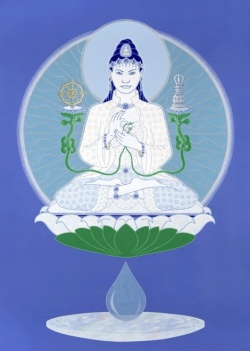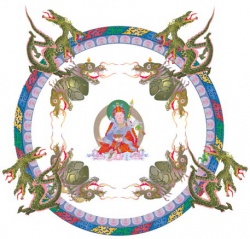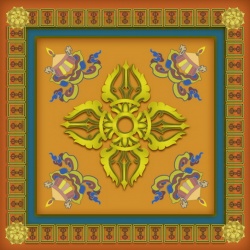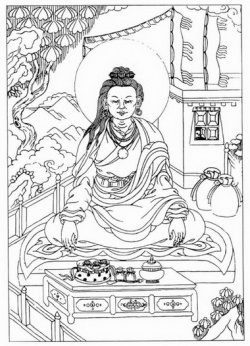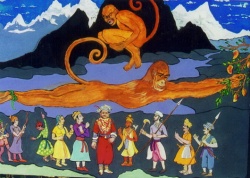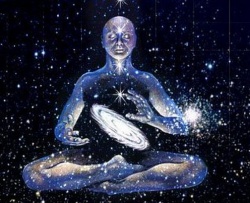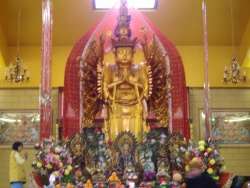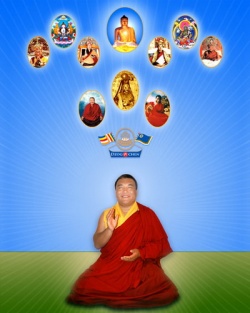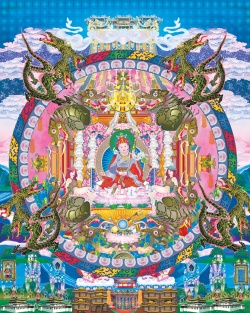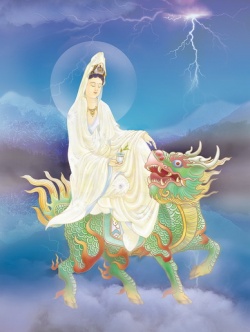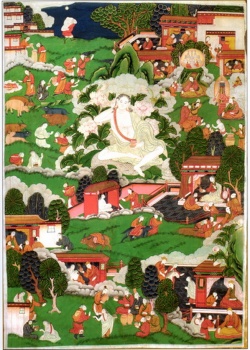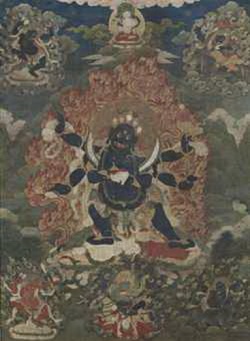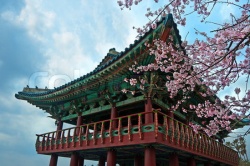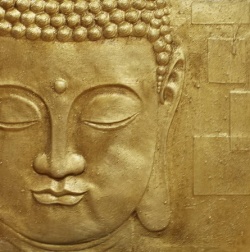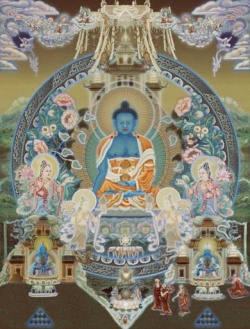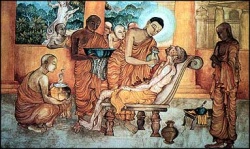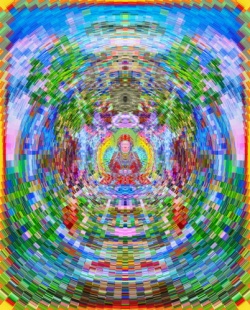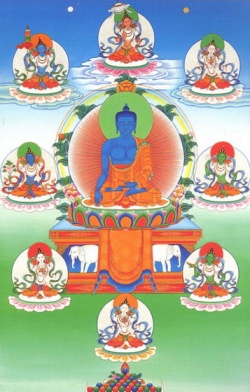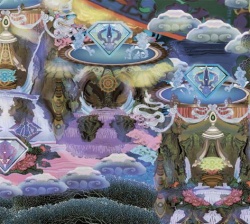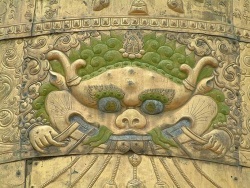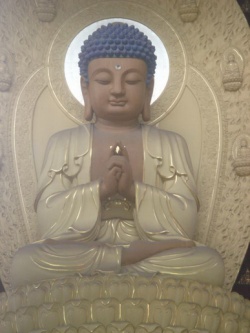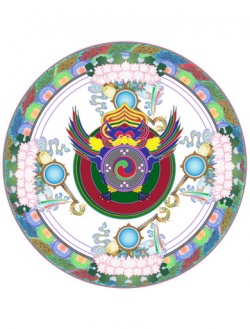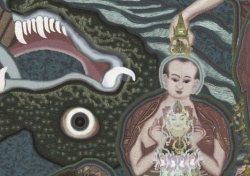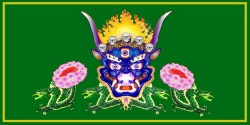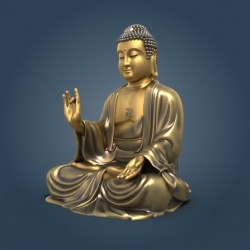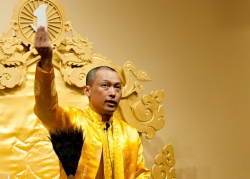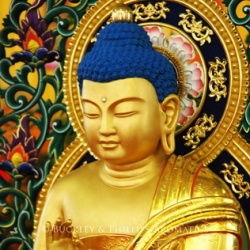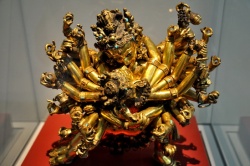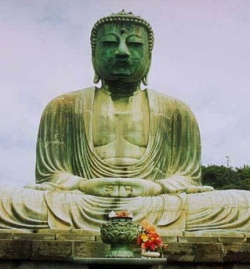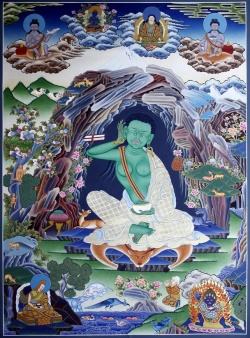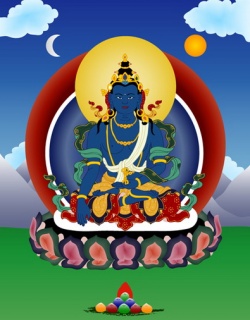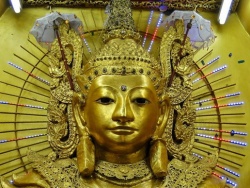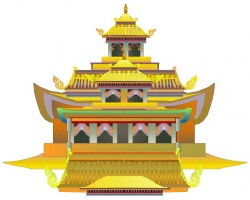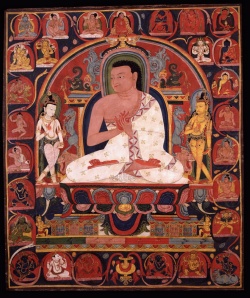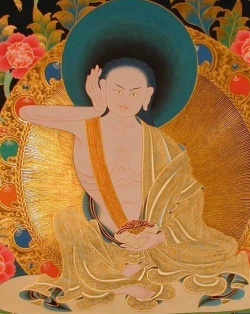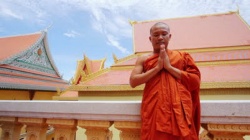Difference between revisions of "Treasury of Precious Qualities"
(Redirected page to Yönten Dzö) |
m (Text replacement - "great strength" to "great strength") |
||
| (5 intermediate revisions by 3 users not shown) | |||
| Line 1: | Line 1: | ||
| − | + | {{DisplayImages|360|1643|722|332|1885|749|1095|1191|1044|1531|1754|197|112|879|1653|1934|396|1487|829|782|999|631|834|586|1279|823|205|1237|1134|1384|1164|311|599|875|1268|1577|962|182|527|1925|1336|9|650|1265|1869|644|1065|1037|772|278}} | |
| + | <poem> | ||
| + | [[Treasury of Precious Qualities]] | ||
| + | The Rain of Joy | ||
| + | [[Root Text]] | ||
| + | by [[Jigme Lingpa]] | ||
| + | |||
| + | Translated by the [[Padmakara Translation Group]] This translation of the [[root text]] of [[Jigme Lingpa’s]] [[Treasury of Precious Qualities]] has been taken from the revised edition of [[Treasury of Precious Qualities: Book One]], published by [[Shambhala Publications]] (2010). C2010 by the [[Padmakara Translation Group]]. [[treasury of precious qualities]] called | ||
| + | The [[Rain]] of [[Joy]] | ||
| + | [[Kunkhyen Jigme Lingpa]] | ||
| + | |||
| + | i [[prostrate]] in homage to the [[three jewels]] Prologue | ||
| + | |||
| + | 1. A [[letter]] that proclaimed the Three Most [[Precious]] Ones, Brought {{Wiki|princess}} Vine-of-Pearls to [[Perfect Joy]]; The lily faces of the demon’s daughters withered, And she progressed, for such is [[Buddha’s]] power. 2. This cleansing treasury, these perfect qualities of supreme [[minds]], Impudently I have massed together in a single [[book]], In rude, unlovely words that chatter like a torrent’s waves. Yet grounded in the words of [[Sacred]] [[Dharma]], it is [[worthy]] to be heard. 3. For all the woes of [[birth]], ills, age, and [[death]], Which from unstarted [[time]] strike [[beings]] down, There is a sovereign, nectar-flavored cure. Yet how might I teach those who hold This [[Sacred]] [[Dharma]] in their hands yet cast it all away? the value of [[human existence]] | ||
| + | |||
| + | The Value of [[Human Existence]] | ||
| + | |||
| + | 1. So long enchanted in samsara’s wilderness, Tormented by the cutting of their heads and limbs, With [[seeds]] of future [[sorrow]] hidden in their [[minds]], [[Beings]] long so foolishly for [[bliss]] of [[higher realms]]. 2. From there they fall again, their [[states of mind]] destroying them, To wander in three [[evil]] [[realms]], or as insensate [[gods]], Or else in barbarous lands, with [[false views]], handicapped, In places where the [[Buddhas]] have not come. 3. On blazing {{Wiki|iron}} grounds without reprieve, With dreadful [[weapons]] wounded [[time]] and [[time]] again, The denizens of [[hell]] are slain but cannot [[die]]— Still tangled in the webs of hatred’s [[evil]] [[deeds]]. | ||
| + | |||
| + | 4. What need is there to say that [[hungry ghosts]] are racked by want? For [[food]] they find not even pus or {{Wiki|blood}} or filth, And streams and {{Wiki|orchards}} dry before their [[eyes]]. Their vitals burn in [[endless]] [[pain]], Their length of [[life]] uncertain, Measured by the strength of {{Wiki|obscuration}}. 5. {{Wiki|Beasts}} prey on one another, are each other’s [[food]]. And, hunter’s quarry, they are slain by {{Wiki|cruel}} means; Or caught and tamed, they are reduced to bondage. Born to such great [[misery]], what can they do? 6. The insensate [[gods]], whose life-supporting [[karma]] is immense, Live long in [[formlessness]]; no [[sorrow]] do they know. But lacking the support for {{Wiki|learning}} and {{Wiki|reflection}}, At [[death]] they have [[false views]] and so lack freedom to progress. 20 [[treasury of precious qualities]] 7. Supported on the palanquin of {{Wiki|legs}} and feet, But yet with [[minds]] untouched by [[virtue]], Barbarous men live sunk and [[skilled]] in [[evil]] ways, And wander in the jungles of a false [[morality]]. | ||
| + | |||
| + | 8. Some have [[senses]] that belie their promise. Though they meet with [[teachers]], {{Wiki|holy}} and [[sublime]], They hear their words like echoes sounding from a cliff, And [[suffer]] in the wasteland of no [[understanding]]. 9. Some achieve the great ship [of a [[human]] [[life]]] With wits like sails wherewith to cross the ocean of [[rebirth]]. But overwhelmed by {{Wiki|demons}}, they espouse [[false views]], Wherein the [[Buddha]] who has come takes no [[delight]]. 10. Some fall in blind and lightless chasms: Ages where no [[Buddhas]] [[manifest]]. And though they try to rise, they find no [[path]] And in despair sink down from low to lower destinies. 11. Eight states therefore where [[beings]] are not free to practice [[Dharma]], Where world-destroying gales of [[sin]] and [[suffering]] [[rage]], Where [[merit]] is {{Wiki|defiled}} in weariness and {{Wiki|fear}}— O think of this and profit from your freedom! 12. To be a [[human being]] in a [[pure]] and central land, With limbs and [[senses]] whole, with [[faith]] in [[Buddha’s teaching]], With [[karmic]] [[fortune]] blossoming, unmarred by [[evil]] [[deeds]]— All this is like the wishing-tree, extremely rare. the value of [[human existence]] 21 13. But rarer still, the [[Buddha]], like an [[udumbara]], has appeared within our [[world]]. | ||
| + | The [[flower]] of the [[Dharma]] is in bloom. The garden of the [[doctrine]], | ||
| + | |||
| + | Undiminished, still [[exists]], and perfectly do {{Wiki|holy}} [[beings]] enter it, Within whose cooling shade we may find rest. 14. Such [[fortune]] in ourselves is rarer than the wishing [[tree]]; Such outer circumstances are like [[udumbara]] [[flowers]]. These ten together joined with eight-fold leisure— Such coincidence will scarce be found again! 15. Examples make this clear—the turtle’s head, the floating yoke, And numbers also, whereby [[humans]] in comparison with {{Wiki|beasts}} Are like the stars that shine by day compared with those by night, With, in a like proportion, [[hungry ghosts]] and denizens of [[hell]]. 16. If once aboard this great ship of our freedom, We now fail to reach the far shore of this sea of [[pain]], This meeting with the helmsman will indeed have been in vain For us who strive and fare upon the [[Dharma’s]] [[path]]. | ||
| + | |||
| + | [[Impermanence]] | ||
| + | |||
| + | 1. The {{Wiki|stable}} [[world]] with all its moving occupants is said to last a [[kalpa]], | ||
| + | Which, by its [[nature]], has four ages: forming, dwelling, ruin, and the [[void]]. | ||
| + | |||
| + | It is disparaged with the [[name]] of Basis of [[Decay]], For it will be assailed by seven conflagrations and one flood. 2. The [[teachers]] of the [[gods]] and humankind {{Wiki|perceive}} our [[trust]] in {{Wiki|permanence}} And therefore, though they have supreme and [[adamantine]] [[forms]], [[Relax]] their hold on indestructibility And joyfully display their passing into [[peace]]. 3. Those perfect in [[samadhi]] may sustain great spans of [[life]], But all to no avail, they must endure {{Wiki|mortality}}. [[Brahma]], [[Shiva]], [[Ishvara]], and all the [[Chakravartins]] Find no way to flee the {{Wiki|demon}} [[Lord of Death]]. | ||
| + | |||
| + | 4. For those who flock so carefree in the [[wholesome]] vales of [[higher realms]], The hunter lies in wait, his weapon in his hand, Conspiring how to rob them of their [[lives]]. He [[thinks]] and [[thinks]] of it and has no other [[thoughts]]. 5. Tormented by the summer’s heat, [[beings]] sigh with [[pleasure]] In the [[clear light]] of the autumn [[moon]]. They do not think, and it does not alarm them That a hundred of their days has passed away. [[impermanence]] 23 6. A powerful bowman’s shaft is swift indeed, But not as swift as [[pretas]] moving on the [[earth]]. The [[pretas]] in the [[air]] are swifter still, And swifter yet the [[gods]] of {{Wiki|sun}} and [[moon]]. But swiftest of them all is [[human]] [[life]]. | ||
| + | |||
| + | 7. The prime of youth is ravaged and brought low by age, {{Wiki|Disease}} disturbs health’s {{Wiki|equilibrium}} And perfect situations are all ruined by [[decay]]. So soon does [[death]] lay siege to [[life]]! 8. Defeated in their struggle with the [[Lord of Death]], [[Beings]] plunge protectorless and friendless down in the [[Wikipedia:Abyss (religion)|abyss]]. The glow of [[life]] is dimmed; the [[senses]] fail; And [[doctors]] with their cures all turn away. 9. Then comes the feeble twitching of exhausted limbs, The failing [[breath]] that rattles in the {{Wiki|throat}}, The family and friends who stand around and grieve And pray their useless [[prayers]] that [[death]] might be delayed. 10. The {{Wiki|movement}} of the [[breath]], now fine as [[horse’s]] [[hair]], Is severed by the sharp ax of the Deadly [[Lord]]. All [[beauty]] now departs; the grin of [[death]] appears; And [[karma]] brings the bardo’s deep, black night. | ||
| + | |||
| + | The [[Law of Karma]] | ||
| + | |||
| + | 1. Those who travel thus to future [[lives]] Attain them, high or low, as though bound by a rope, Drawn only by their [[virtuous]] [[deeds]] or ingrained [[evil]] ways— The [[relative]], the all-concealing, [[truth]] is inescapable. 2. The different [[virtues]] of a farmer’s [[seeds]] Are [[manifested]] in his crops. And different destinies are likewise made by many [[deeds]] Ingrained and grown accustomed to in former [[lives]]. 3. The {{Wiki|bird}} that soars in flight above the [[earth]] Seems, for the moment, shadowless. But from its [[form]] the shadow does not part: When [[time]] and circumstances meet, it [[manifests]]. | ||
| + | |||
| + | 4. Wrongful [[deeds]], the mare that vomits [[fire]], Can desiccate the outer ocean’s waves, the [[happy]] [[realms]]. The Hundred [[Deeds]], the Vast Display reveal How [[evil]] [[actions]] wreck the vessel of [[omniscience]]. 5. The overwhelming torments of the lower states Have not yet pitched their camps of [[war]] within The heroes’ land, the stronghold of [[ten virtues]]. And yet those who break their [[virtuous]] pledges fall beneath their sway. 6. Some lose their [[discipline]] and some their [[lives]] or length of days, Some their austere practices, some their {{Wiki|learning}} and possessions, Some their [[moral]] {{Wiki|conscience}}, some their [[sense of shame]]— So many have forsaken them for evil’s sake. the [[law of karma]] 25 7. For the sake of their [[religion]], {{Wiki|society}}, or kin, To guard their country, they unleash The mighty [[elephant]] of [[sin]]. | ||
| + | |||
| + | And yet they do not share the consequences of their [[deeds]]. 8. They [[thirst]] for gain; they long for [[joy]] alone. They [[love]] celebrity and swell with [[pride]] when praised, And by their contraries they are undone: These children are deceived by such [[mundane]] concerns. 9. Pedigree and [[beauty]], influence and [[fortune]] flaunt themselves, While [[sloth]] conceals itself in crawling disability. [[Pernicious]] [[thoughts]] of naked [[pride]] become The {{Wiki|demons}} that assail the glorious practice. 10. When [[selfish]] [[greed]] is firm and dominant, Others are outwitted in the tendrils of duplicity Whereby one serves oneself. Yet this is a great harm that sinks into one’s [[heart]]. | ||
| + | |||
| + | 11. [[Samsara]] is contrived through [[deeds]], Both black and white, and their results. And [[seeds]], though tiny, generate great {{Wiki|fruits}}. It is as when great Mandhata acquired The lordship of the [[world]] with seven peas. 12. Though grown from [[seeds]] the size of mustard grains, Ashota [[trees]], in [[time]] of fruit, have branches that extend A league in length. Yet even this example does not serve To illustrate the increment in [[sin]] and virtue’s fruit. 26 [[treasury of precious qualities]] 13. [[Phenomena]] are not [[God’s]] handiwork, Nor do they appear all by themselves. The [[mind’s]] [[intention]], colored black or white, Imparts great strength to [[actions]] and their {{Wiki|fruits}}, Though this is lessened if they lack the factors that precede and follow. 14. A [[healing]] [[root]] will yield a [[healing]] plant— What need is there to say what poisoned [[roots]] produce? [[Intention]], good or ill, dictates the act’s effects And not the size of the apparent right or wrong. | ||
| + | |||
| + | 15. Thus constancy, [[determination]], no opposing force, [[Relation]] with the fields of supreme qualities and benefits: By these five factors it is taught That [[sin]] and virtue’s weight is to be gauged. 16. The {{Wiki|indeterminate}} [[alaya]] is the ground of all. From this the consciousnesses—one of [[mind]] and five of sense—arise. The {{Wiki|demon}} [[ignorance]] pervades them all and wields the three [[defilements]], | ||
| + | Whence samsara’s [[realms]], both high and low, derive. 17. It is as with a fiery conflagration: But for [[water]], there’s no other remedy. Accordingly there is no [[sin]] to match Deception and rejection of the [[Triple Gem]]. 18. And then, although the {{Wiki|intellect}} cannot identify Each [[action]] of the [[mind]] and [[mental factors]] Interwoven in the [[dualistic]] [[thoughts]] of [[beings]], Ten [[actions]] and their consequences are to be rejected. They are based upon the body, speech, and mind. | ||
| + | |||
| + | 19. Three there are of [[body]]: killing, theft, and {{Wiki|sexual}} misdeeds. Of these, the first occurs when willingly One takes the [[life]] of one correctly understood to be alive (And, linked with this, are harmful acts like beating and the rest). 20. To steal is knowingly to take another’s property (And, linked with this, is taking through [[deceit]] and {{Wiki|fraud}}). {{Wiki|Sexual}} misconduct means to join with persons pledged elsewhere, (And, linked with this, are all improper acts of intercourse). 21. The four misdeeds of [[speech]] are: lying, whereby others are deceived (And, linked with this, all guile, which misleads others’ [[minds]]); Divisive [[speech]], which sows {{Wiki|hostility}} midst friends or [[people]] neutrally disposed (And, linked with this, the repetition of another’s censure, fostering [[resentment]]); | ||
| + | |||
| + | 22. Worthless chatter, which is futile talk that [[causes]] wanting or rejection | ||
| + | |||
| + | (And, linked with this, all useless talk of wars and banditry); And harsh words whereby others’ hearts are torn (And, linked with this, all talk that brings [[unhappiness]] to others). 23. Of three [[nonvirtuous]] acts of [[mind]] The first is covetousness: hankering to make one’s own Another’s [[wealth]] and [[fame]] (and, linked with this, All wanting to acquire what others have). 24. Then there is [[malevolence]]: hating others, wishing harm to them (And linked with this, resenting their good [[fortune]], wanting it to end). Then [[wrong view]] is denial of [[karma]], [[belief]] in {{Wiki|permanence}} or else {{Wiki|annihilation}} | ||
| + | (And, linked with this, declaring what is false, denying what is true). | ||
| + | 28 [[treasury of precious qualities]] | ||
| + | |||
| + | 25. In four ways all these [[actions]] fructify. Their {{Wiki|fruits}} are ‘‘fully ripened,’’ ‘‘Resembling their [[cause]],’’ | ||
| + | ‘‘Proliferating,’’ and ‘‘{{Wiki|conditioning}}.’’ 26. Regarding, then, the fully ripened fruit, Whether all five factors have occurred or not, Through [[motivation]] of three kinds, are [[beings]] thrown At best, into the [[realm]] of {{Wiki|beasts}}, Or worse, into the [[realm]] of [[pretas]], or worst of all, into the [[realms of hell]]. 27. Effects resembling their [[cause]] are of two kinds. First actively: there is the inclination to repeat the act. Then passively: although a high [[rebirth]] be gained, Two [[experiences]] that reflect their [[cause]] To each one of the ten nonvirtues are [[successively]] assigned. | ||
| + | |||
| + | 28. One’s [[life]] is short and filled with many ills; One’s goods are few and shared with enemies; One’s spouse is unattractive and takes sides with one’s opponents. 29. Assailed by slander, one is frequently deceived by others And has bad attendants who are hard to reconcile. One’s words are disregarded and dismissed as unreliable; Many insults does one hear, one is immersed in strife. 30. One never has enough and is tormented by [[desire]]. Adversity draws close and all help disappears. One has [[false views]] and is inclined to cheat. the [[law of karma]] 29 31. {{Wiki|Conditioning}} effects are linked with outer habitat. The [[burden]] of the [[evil]] [[deed]] of killing Leads to cramped environments Where [[healing]] [[trees]] and [[flowers]] are few, Where crops and [[food]] and drink lack [[virtue]] and are indigestible, | ||
| + | |||
| + | To places that are hazardous for [[life]]. 32. Theft brings [[birth]] in places where the crops are easily destroyed. Where [[plants]], though edible, give meager fruit Or are assailed by frost and flattened by the hail, Where [[suffering]] of famine overwhelms the [[mind]]. 33. {{Wiki|Sexual}} misdeeds engender irresistibly the creeping vine Of [[birth]] in filthy swamps of excrement and {{Wiki|urine}}, Where [[breath]] is stifled by the unclean stench, In dirty, loathsome places narrowly confined. 34. Through lies one has unstable [[wealth]] in unpropitious lands. Betrayed by others, one will live in dread, beset by {{Wiki|fears}}. | ||
| + | |||
| + | Slander and divisive [[speech]] bring regions full of gorges and ravines, Steep defiles and chasms hard to cross. 35. Harsh words give rise to places filled with stones and thorns, [[Tree]] stumps evil-fruited, harsh and bad to {{Wiki|taste}}, Brackish waters, wastelands filled with dust and slag: Mournful places, lands for sorrowing. Through pointless chatter, all one’s toiling in the fields Is fruitless. All is unpredictable, for in due season [[nothing]] comes. 30 [[treasury of precious qualities]] 36. Through covetousness, husk and grain are in their [[measure]] all reversed; | ||
| + | One’s [[time]] and place are bad and ill portends. Through wishing [[evil]], one is born in lands oppressed by [[evil]] [[kings]], Preyed upon by robbers, savages, wild {{Wiki|beasts}}, and deadly {{Wiki|snakes}}. The {{Wiki|fruits}} and harvests have a [[bitter]], burning {{Wiki|taste}} In regions prone to natural {{Wiki|calamities}}. | ||
| + | |||
| + | 37. Through [[wrong views]], one is born in lands devoid of [[wealth]], Where [[healing]] [[trees]] and [[plants]] are scarce, Where [[flowers]] and their {{Wiki|fruits}} have little strength, In places destitute of friends and kin, defenseless, unprotected. 38. The proliferating consequence of acts performed Produces, through great increment, unbounded [[sorrow]]. Thus this {{Wiki|prison}} of unbearable [[samsara]] Is darker than the very dark itself. Through blades of [[pain]] upon the [[aggregates]] one has assumed, [[Sensations]] hard to bear are all the recompense of [[sin]]. 39. And so in this [[condition]] of impure [[perception]], The [[path]] of tenfold [[virtue]] leads to [[higher realms]]. Embrace therefore ten [[virtuous]] acts And from the ten nonvirtues turn away. 40. Of these the ten that lead to [[happiness]] Cast [[beings]] into [[realms]] of [[bliss]]; Ten [[evil]] [[actions]] throw them down into the states of loss. | ||
| + | |||
| + | To undertake or spurn such [[deeds]], thus known as white or black, Defines the [[path]] of lesser [[beings]]. the [[law of karma]] 31 41. [[Ten virtues]], the [[samadhis]] and the [[formless]] concentrations, The [[six perfections]], giving and the rest—all this Is [[virtue]] that to [[liberation]] tends. It is the [[cause]] of [[sublime]] [[purity]]. All are [[gathered]] in [[five paths]]: [[accumulation]], joining, [[Seeing]], [[meditation]], no more {{Wiki|learning}}. 42. When [[realization]] of the [[Wikipedia:Existence|nonexistence]] of the twofold [[self]] is won, | ||
| + | |||
| + | All [[virtue]] wherein [[skillful means]] and [[wisdom]] are conjoined Is like a gold-producing [[alchemy]] that strikes upon the leaden state Wherein [[existence]] and [[nirvana]] contradict. [[Buddhahood]], the primal [[wisdom]] that abides in no extreme, is thus achieved. [[Virtue]] such as this transcends the [[world]]. 43. While on the [[path]], by means of [[Wikipedia:concept|concepts]], [[merit]] is laid in And [[wisdom]] free of all such [[Wikipedia:concept|concepts]] also is amassed. When these two are conjoined, The two veils are removed and the [[two kayas]] [[manifest]]: Such is the inter-working of profound and [[pure]] [[causation]]. 32 [[treasury of precious qualities]] | ||
| + | |||
| + | The [[Sufferings]] of [[Samsara]] | ||
| + | |||
| + | 1. We who board the supreme ship of [[higher realms]] Escape, for now, the dreadful monster’s {{Wiki|tongue}}, the [[evil]] destinies. But since we have not reached the dry land of our Freedom, In a captain we should place our [[trust]]: the [[four truths]] of the [[Noble Ones]]. 2. We should understand the [[truth of suffering]]: In all the [[six realms of samsara]], high or low, No place is there but is entrapped in [[misery]] Of [[pain]], of change, of all-pervading [[suffering]] in the making. 3. The origin of [[pain]], the {{Wiki|demon}} of [[desire]] that rears its head to strike, {{Wikidictionary|Entwined}} with poisoned [[objects]] of [[desire]], Contrives a {{Wiki|prison}} whence there’s no escape: The breeding ground of weariness and woe. | ||
| + | |||
| + | 4. We yearn for [[happiness]] and strive for it. But overmastered by the power of [[ignorance]] And caught upon the sharpened point of [[sorrow]] and its [[cause]], We are ourselves the place wherein our [[pain]] is all prepared. 5. Like moths attracted to the bright [[form]] of a flame, Like {{Wiki|deer}}, like bees, like {{Wiki|fish}}, like [[elephants]], By [[sound]], by {{Wiki|smell}}, by {{Wiki|taste}}, by {{Wiki|touch}} are we betrayed, Bound up with the five [[objects]] of [[desire]]. 6. [[Beings]] in [[samsara]] are continuously assailed By [[pains]] more swift to strike than [[raging]] [[fire]], Than wild and [[dangerous]] {{Wiki|beasts}}, Than savage men, than punishments of [[kings]]. the [[sufferings]] of [[samsara]] 3 | ||
| + | |||
| + | |||
| + | 7. There’s no way to conceive of those who were our friends or foes, | ||
| + | Who held us near or far. For every [[living being]] Has loved and hated us and has been unconcerned: The help and harm received from them surpasses all [[imagining]]. 8. For sake of our [[desires]], each one of us has undergone The cutting off of head and limbs. These members all piled up would make a mountain greater than [[Sumeru]], Though our life-supporting [[bodies]] were no bigger than a speck of dust. | ||
| + | |||
| + | 9. In [[hell]], we swallowed boiling molten {{Wiki|copper}}. When we were [[pretas]], we consumed both pus and {{Wiki|blood}} and every kind of filth. The {{Wiki|tears}} we shed from all these woes would many times exceed The [[rivers]] that flow down into the outer seas. 10. The [[pains]] of [[hell]] are measureless. In Reviving, there is mutual slaughter, And in Black Lines, [[beings]] are sawed apart and then rejoined without reprieve. In Crushing, they are ground by hammers and by head-shaped hills. | ||
| + | |||
| + | In Screaming, they are pierced and boiled in molten metal, In Great Screaming, they are burned in houses made of incandescent steel. 11. In the [[Hell]] of Heat, they are impaled on burning stakes And in Great Heat, their [[bodies]] are run through by [[tridents]]. Wrapped in sheets of blazing steel, they boil in vats of molten bronze, And in the blazing {{Wiki|iron}} tenements of Torment [[Unsurpassed]], The [[beings]] are not distinguished from the [[fire]] consuming them. 34 [[treasury of precious qualities]] 12. When they think that they might be released from [[pain]], The doors stand open leading to the Neighboring [[Hells]]. But there they find a trench of glowing coals, a viscous swamp of rotting [[dead]], A razor grove, a fordless stream—each one more horrible than [[Yama’s]] jaws. | ||
| + | |||
| + | 13. Remembering their lovers’ troth, they hurry to their sides, Their [[bodies]] {{Wiki|cruelly}} wounded on sharp thorns. But then their lovers change, becoming monsters made of burning steel, Who take them in their arms, while [[crows]] and vultures tear and gouge their [[eyes]]. | ||
| + | |||
| + | 14. Freezing snowstorms bind them with a rope of shivering cold; They cannot move although they are alive. The [[wind]] sinks knives of ice into the marrow of their bones, They’re crushed between the teeth of icy torment. 15. The [[hells]] of cold are Blisters, Bursting Blisters, [[Lamentation]], Groaning, Chattering Teeth, The [[hell]] where flesh splits open sixfold like [[utpala]] [[flowers]], The [[Lotus]] [[Hell]] and the Great [[Lotus]] [[Hell]] With wounds of eight, or sixteen, or of countless fissures, Where worms with pointed beaks devour and eat into the flesh. 16. Because of different [[karmas]], [[beings]] see themselves As doors, or pillars, ropes or hearths; They’re felled in stumps of [[trees]], enclosed in doorless cavities. Their [[bitter]] ordeal [[knows]] no end. 17. If this noisy tumult, all these waves of [[pain]], | ||
| + | |||
| + | In this teeming flood of [[life]] is not brought to an end, The rampart of this [[human]] [[life]] {{Wiki|superior}} to the [[gods]] will burst And we will wander in samsara’s desolation. the [[sufferings]] of [[samsara]] 35 18. Once the [[karma]] that created {{Wiki|indeterminate}} absorption In the [[formless realm]] is worn away, A subsequent [[existence]] is [[compounded]]. With exhaustion of the former [[actions]] That produced [[samadhi]] in the [[realm of form]], There comes the [[misery]] of falling into lower states. 19. [[Brahma]] and Devindra and the [[Universal]] [[Kings]] Enjoy the ripening effect of [[virtuous]] acts, Like sunlight peeping through the clouds. But when this is used up, they wane— Just like the [[lamp]] oil that the flame consumes. 20. And even though the [[lotuses]] beneath his feet, On pavements soft and yielding to the tread, Blush crimson in the [[light]] {{Wiki|projected}} from the crowns Of [[gods]] and [[nagas]] and [[kinnara]] [[lords]], [[Indra]] too, at length, will languish on a burning {{Wiki|iron}} spike. | ||
| + | |||
| + | 21. All lost will be the soft caress of [[goddesses]] Who lulled them on their youthful breasts in lovely groves And in exquisite {{Wiki|palaces}} adorned with tapestries of pearls! The [[gods]] will fall precipitated into pits of fiery ash! 22. Their [[robes]], their thrones, their garlands old and sear— No [[goddesses]] stand by to wipe their sweating brows! They gaze in {{Wiki|tears}} upon those close to them: An agony of [[death]] unknown to humankind. 23. The mighty luminaries of the {{Wiki|sun}} and [[moon]] Are tenants of vast [[parasols]] of [[light]] That overstretch the ring of [[Yugandhara]] mountains. But utter {{Wiki|blindness}} waits for them in times to come, Imprisoned in a state of deep obscurity. 36 [[treasury of precious qualities]] 24. The [[asuras]]’ [[minds]] are torn asunder By the battle-ax of envious [[rage]] against the glory of the [[gods]]; And further, in the fray against the latter’s [[furious]] host, They are tormented by the cutting off of head and limbs. 25. Our [[human]] [[life]] is fleeting, fitful like a bubble, Conflicts and [[unhappiness]] and all the rest Torment us in succession, one by one— They are like wounds inflicted on a leper’s sores. | ||
| + | |||
| + | 26. And in the garden of the [[higher realms]] replete with all [[delight]], We long to {{Wiki|taste}} the [[objects]] of [[desire]]. And eating of this poisoned [[food]], our [[bodies]] are brought down to torment: All that we have gained is changing, miragelike. 27. The story of the [[king]] who could not bear to walk on his two feet, But mounted wearily his [[elephant]] that, lusting for its mate, Was driven wild and threw him down into a steep [[Wikipedia:Abyss (religion)|abyss]] Describes {{Wiki|pervasive}} [[suffering]] in the making. 28. In the wilderness of threefold [[sorrow]] Prowl the ills of [[birth]], age, [[sickness]], [[death]]; We meet with enemies and things we do not want; While those we [[love]] depart and do not stay; | ||
| + | |||
| + | 29. The things we wish for are so shy to come, While {{Wiki|hardships}} throng upon our [[aggregates]]— Eight kinds of fierce [[suffering]] At all times plague this vine of [[human]] [[life]]. 30. The [[womb]] is like a doorless house of {{Wiki|iron}}, Fetid and unclean with humid slime, A place of utter darkness, all-confined— Here deluded [[consciousness]] alights on mingled sperm and {{Wiki|blood}}. the [[sufferings]] of [[samsara]] 37 31. Spherical then stringlike, oblong, ovoid, round, Then like a {{Wiki|fish}}, then turtle-shaped: ’Tis thus the [[embryo]] takes shape in seven weeks And in the twenty-six that follow goes through many transformations. In this ugly thing, the organs of the [[senses]], limbs, and [[hair]] take shape. | ||
| + | |||
| + | 32. Then in the thirty-seventh week, the {{Wiki|fetus}}, grown in size, Now quickens in the [[womb]], has [[feelings]] of discomfort, [[Suffering]] greatly from the [[actions]] of its mother, Her hunger, [[thirst]], her heat and cold. 33. Then at the [[time]] of [[birth]], The [[body]] of the child must pass between What seems the crushing cliffs of [[hell]] unbearable. And in such dreadful [[pain]] the mother or her child, Or even both, may lose their [[lives]]— Such are the agonies of being born! | ||
| + | |||
| + | 34. [[Emerging]] from the [[womb]] enwrapped in evil-smelling slime, The {{Wiki|infant}} cannot bear the [[pain]], as though its flesh were but a single wound. The {{Wiki|memories}} of former states are dimmed And searing [[pain]] is felt at every {{Wiki|touch}}. 35. Defeated by the {{Wiki|punishment}} of age, Youth must bear the [[burden]] of {{Wiki|decline}} and [[grief]]. Power of {{Wiki|movement}} wanes; a stick is used for leaning on And joints are wrenched in going back and forth. 36. As [[faculties]] [[decay]], the savoring of what was once [[desired]] Is muted like the heat and [[light]] of the enclouded {{Wiki|sun}}. Enfeebled, one must lie upon a bed, One’s [[mind]], bewildered, rambling far and wide. 38 [[treasury of precious qualities]] 37. When the pool of balanced health is troubled And [[sensations]] of {{Wiki|disease}} occur, | ||
| + | The weary one who holds to the [[five aggregates]] Is terrified with {{Wiki|fear}} of [[death]]. | ||
| + | |||
| + | 38. [[Nothing]] in this [[world]] is dearer than [[life]]. When we are smitten with the [[suffering]] of [[death]], Dear friends and family, all that we possess, are left behind, As we go forth we know not where. 39. [[People]] are undone when meeting with adversities, Tormented by these harbingers of [[pain]]. It is as when the resting place on which one takes one’s ease Collapses: there is no relief but only more [[affliction]]. 40. The [[sorrow]] felt by lovers newly parted— How vast it would be if it had a [[form]]! Enchanted by an elf maid, Norzang fared Through peril and through woe. For [[karma]] such as this must long endure. 41. The poor who have not what they want must [[suffer]]; They must waste their [[body]] and their [[speech]] In [[grip]] of {{Wiki|hope}} and {{Wiki|fear}} for [[food]] and drink not found— They are like [[pretas]] moving on the [[earth]]. 42. [[Feeling]] [[knows]] the [[nature]] of the [[Form]] on which it’s based. [[Perception]] is conducive, usually, to [[action]]; {{Wiki|Conditioning}} Factors multiply the [[seeds]] of future [[pain]]; While [[Consciousness]] appropriates the [[sense]] of [[sorrow]]. | ||
| + | |||
| + | 43. These [[five aggregates]] are thus the source, The basis and receptacle of every ill, both [[cause]] and fruit, The [[owner]] and experiencer of [[pain]]. Wherefore I pray you, cast away your sorrows’ wellspring: [[Karma]] and [[defilements]]. 44. The [[path]] of those rejecting them, the [[beings]] of middle scope, Consists in driving in the chariot of the [[four truths]]. They actualize [[Cessation]], reaching supreme freedom, The state that lies beyond all [[suffering]]. 45. The [[root]] of all dependent things is [[Ignorance]]— Whence come {{Wiki|Conditioning}} Factors, [[Consciousness]], and Nameand- [[Form]]. From these the six [[Sense]] [[Powers]] are born, Whence [[Contact]] and, from [[Contact]], [[Feeling]]. 46. Thence comes [[Craving]] and, from [[Craving]], [[Grasping]]; Thence Becoming; from Becoming, [[Birth]]. With [[Birth]] comes deprivation of one’s wants, [[Affliction]], [[sickness]], Age-and-Death: A vast [[accumulation]] of [[pain]] is thus produced. When [[Birth]] is halted, all these too are stopped. 47. This [[teaching]] so profound, {{Wiki|dependence}} of effects on [[causes]], Is the very [[treasure]] of the [[truth]] the Conqueror has taught. Yet true and [[supreme peace]] transcends The [[deeds]] that bring forth high or low [[existence]] (White and black [[phenomena]] in causal sequence). And when the {{Wiki|unborn}} [[nature]] of [[phenomena]] is [[realized]], it will [[manifest]]. 40 [[treasury of precious qualities]] | ||
| + | |||
| + | The Four Wheels | ||
| + | |||
| + | 1. To live in favorable, conducive places, To follow {{Wiki|holy}} [[beings]] and imbibe their qualities, To have good [[aspiration]], and [[desire]] to be protected by one’s [[merit]]: Such are the four great wheels, as [[Nagarjuna]] taught. 2. Dwelling in the midst of crowds Is like consuming poisoned [[food]]. From such wild and agitating circumstances turn away And all alone in [[solitude]] aspire to [[Peace]]. 3. Unattached to gain, like [[wind]] or {{Wiki|bird}}, In lonely places like the creatures of the wild, You will not be disturbed by rash and shallow conduct. Staying in one place will lead to keeping in with others; Your strength to bear with [[jealousy]] will wear away. 4. Cats are hard and {{Wiki|cruel}} in [[mind]] And yet so sweetly and so peacefully they move and sit. Bad friends are just the same, and with their easy company, They’ll quickly turn you from the [[Dharma]]. | ||
| + | |||
| + | 5. Constantly in motion, {{Wiki|sun}} and [[moon]] are dear to all, While long-familiar company breeds spite and [[irritation]]. Places newly visited are free from trouble, Where everyone will see you as a [[friend]]. 6. But those who, though they speak like common {{Wiki|folk}}, Have [[minds]] that do not follow after good or [[evil]] [[speech]], Regarding it as no more than an echo, Have no restrictions for their dwelling place. the four wheels 41 7. Those whose training in [[pure]] [[discipline]] And whose [[single-pointed]] [[concentration]] are as yet unstable Will reap attainments, great or small, According to their dwelling and the company they keep. 8. Since our [[Teacher]] has permitted it and since It brings forth [[merit]] in the other’s [[mind]] And leads to no impairment of the [[discipline]], The beggar’s way is like a [[wish-fulfilling jewel]]; To live from [[alms]] alone is consonant [with [[Dharma]]]. 9. Theft by devious means, and making gain by giving gifts, To wheedle with cajoling flattery, To show a false facade, to flaunt one’s rank—these five Are impure ways of [[livelihood]]: a [[shame]] for those engaged upon the [[path]]. 10. And so a perfect dwelling and good [[livelihood]], Good company and application—all arouse one’s strength of [[mind]]. | ||
| + | |||
| + | In order to acquire the qualities of [[threefold training]], Have recourse to {{Wiki|holy}} [[beings]]. | ||
| + | |||
| + | 11. Like a log of common timber | ||
| + | Lying in Malaya’s {{Wiki|forest}} groves | ||
| + | |||
| + | Absorbs the {{Wiki|fragrance}} of the moistened sandal leaves— You will take after those whom you frequent. 12. A [[master]] who has all the qualities of [[sacred]] [[Dharma]], In this age of dregs, is hard to find: One whose [[mind]] is like a soil well-tilled Through the injunctions and restraints of the [[three vows]] And watered with both {{Wiki|learning}} and with [[great compassion]]. 42 [[treasury of precious qualities]] 13. Rely on such a one, a [[master]] of the myriad practices Of both the [[Tripitaka]] and the [[Secret Mantra]], A [[master]] rich in {{Wiki|fruits}} of [[pure]] [[primordial wisdom]], Both of [[realization]] and elimination, Who with sumptuous [[flowers]] of four attractive qualities, [[Gathers]] to himself the [[lucky]] bees, his [[fortunate]] [[disciples]]. 14. Especially, a [[master]] who expounds [[essential]] teachings Must have been [[empowered]], must rest [[serene]] in [[pure]] [[samaya]], Absorbing all the meanings of the [[tantra]] of ground, [[path]], and fruit. The marks both of approach and of [[accomplishment]] he must have complete, | ||
| + | |||
| + | His [[mind]] set free through [[realization]]. 15. His [[compassion]] must be [[boundless]]; others’ good must be his only care. | ||
| + | Earnestly caught up in [[Dharma]], he should have but few [[activities]]. Toward [[samsara]] he must [[feel]] great weariness, inspiring this in others. He must be [[skilled]] in means and have the [[blessings]] of the [[lineage]]. Rely on such a [[master]] and attainments will be swift. 16. But there are [[teachers]] of the [[path]] who are like wooden millstones. They care about their [[lineage]] no different from a [[Brahmin]] priest, Or else are {{Wiki|fearful}} lest their home and seat {{Wiki|decline}}. And as for the results of {{Wiki|learning}} and {{Wiki|reflection}}, It’s as though they bathe themselves in a polluted pond! 17. Others are no different from the common run of [[beings]], But with the [[faith]] of fools they preen themselves. Because of [[wealth]] and {{Wiki|honor}} shown to them, they swell with [[pride]]. Indeed like well-frogs are such ‘‘[[virtuous]] friends.’’ the four wheels 43 | ||
| + | |||
| + | 18. Some have little {{Wiki|learning}} and are lax in [[vows]] and pledges. Though base in [[mind]], they act as though they soared above the [[earth]]. They cut the drawstrings of [[compassion]] and of [[love]]. Through such mad guides does sinfulness increase. 19. To follow such blind mentors on the strength of their renown— Whose qualities do not exceed one’s own, Who have no bodhichitta—is a serious mistake, For by such a false discipleship one wanders in the dark. 20. By failing to [[subject]] such [[teachers]], therefore, to a stringent test, Those who place their [[faith]] in them will waste their stock of [[merit]]. The finding of this [[time]] of freedom will be just as when, mistakenly, | ||
| + | One takes a [[dangerous]] [[serpent]] for the shadow of a [[tree]]. 21. But [[teachers]] who are rich with every perfect quality, Who from the [[sphere]] of all the [[Buddhas]]’ primal [[wisdom]] and [[compassion]] Come in [[human]] [[form]] to [[worlds]] where there are [[beings]] to be trained— | ||
| + | |||
| + | Such [[teachers]] are the supreme [[root]] of all accomplishments. 22. For sake of guiding on the [[path]], they seem in [[harmony]] with all, And yet with [[worldly]] ways they are in fact at variance. Owing to their [[wise]] intent, they are {{Wiki|superior}} to all; They’re [[skillful]] in dispelling [[doubts]] and bear with spite and weariness. 23. They are great ships of rescue from the ocean of [[existence]], True mentors, undeceiving on the supreme [[path]]. They are a nectar-rain to quench the fiery mass of [[karma]] and [[defilements]], And, like {{Wiki|sun}} and [[moon]], dispel the dark of [[ignorance]]. 44 [[treasury of precious qualities]] | ||
| + | |||
| + | 24. They are strong and all-supporting like the [[earth]] itself, A source of [[benefit]] and [[bliss]], like wish-fulfilling [[trees]], Like perfect vessels filled with treasuries of [[Dharma]]. Greater even than the wishing [[jewel]], they are the source of all. 25. They are the [[parents]] of all [[living beings]], [[loving]] them with {{Wiki|equal}} [[love]], And like a running [[river]] is their great and swift [[compassion]]. In [[joy]] they are [[unchanging]] like [[Sumeru]], [[king]] of mountains; With untroubled [[equanimity]], they are like clouds of [[rain]]. 26. Such [[teachers]] are the peers of all the [[Buddhas]]. Even their assailants are connected to the [[path]] of [[bliss]]. | ||
| + | |||
| + | On those who follow them with true [[devotion]], Qualities of high [[rebirth]] and freedom shower down like [[rain]]. 27. Like sick men on their [[doctors]] and like travelers on their guides, Like {{Wiki|merchants}} on their helmsmen and the {{Wiki|fearful}} on their braves, Like seamen on their pilots, all those who dread their foes ([[Defilements]], [[birth]], and [[death]]) Should take support of [[teachers]] such as these. 28. If those who take their teachings are improper vessels, No profit do they get from such a [[nectar]]. They’re satisfied with trifles, and their [[faith]] Is changeful like the seasons, shallow and contrived. 29. At first, like wild yaks, some refuse to enter on the [[Dharma]] [[path]], And then they [[hate]] to study or reflect; their only [[interest]] is this present [[life]]. At last they go with [[evil]] friends | ||
| + | |||
| + | And, like the wild men of the forests, take to [[evil]] ways. the four wheels 45 | ||
| + | |||
| + | 30. Some, even when the [[master’s]] present, wish to be away. And yet wherever they may go, they’re caught by sinful ways. When told to stay in [[solitude]], their [[Dharma]] practice falls apart. They are like tips of [[kusha]] waving in the [[wind]]. 31. Some with [[evil]] natures, with deceiving, twisted tongues Approach their [[teacher]] like a musk-deer. Once they take his musk, the {{Wiki|holy}} [[Dharma]], Gleeful with the prize, they throw away their pledges. 32. Those whose plans exceed their own capacity Receive [[essential]] teachings but then lay them on one side. They ferret through a stack of texts and tire themselves; Before discovering something new, they lose what they had known before. 33. Some have [[faith]] that joins them to the perfect teachings; Some appear to have it but are [[interested]] in [[worldly]] goals; And some are neither of these two, their [[Dharma’s]] just a lie. The [[nature]] of these three it is important to discern. 34. But those well armed, whose [[minds]] are very firm, | ||
| + | |||
| + | Who serve their [[teachers]] at the cost of [[life]] and limb, Who implement the teacher’s [[word]] without [[concern]] for [[self]], Such [[beings]] will find freedom simply through [[devotion]]. 35. [[Disciples]] should have [[faith]] and [[wisdom]]. They should be possessed of {{Wiki|learning}} and of [[great compassion]]. They must [[respect]] their [[vows]] and their [[samaya]], Be [[disciplined]] in body, speech, and mind. They should be generous, broad-minded, With [[pure]] [[perception]] and a [[sense of shame]]. 46 [[treasury of precious qualities]] 36. They should be [[skilled]] in [[knowing]] how to please their [[teachers]]. Like the supreme [[horse]] not jibbing at reproof, They should abandon weariness like boats that come and go. Like [[bridges]] they should bear all things, both good and ill. 37. Like anvils they should stand both heat and cold; Like servants, they should heed instructions. They should rid themselves of [[pride]], like those who sweep the streets, And give up [[arrogance]], like bulls with broken horns. | ||
| + | |||
| + | The [[teacher]] should be followed thus, for so the texts declare. 38. Riches, if you have them, Offer to your [[teacher]], the fourth [[jewel]], Who should be served and reverenced in [[word]] and [[deed]]. Never will such [[actions]] go to waste, And of the three ways to [[delight]] a [[teacher]], practice is the best. 39. Never look askance at what the [[teacher]] does, For most of the great [[siddhas]] of the [[Noble]] Land Were menials or outcasts, evildoers, And, even by the worst of standards, dissolute. 40. If those who have not mastered their own [[minds]] Ascribe faults to their [[teacher]], then their [[sin]] is measureless. Although he knew by [[heart]] the twelve parts of the [[scripture]], [[Bhikshu]] [[Sunakshatra]], overmastered by the power of [[sin]], [[Perceived]] as false the [[actions]] of the [[Buddha]]. Reflecting well thereon, reform yourself. 41. If the [[teacher]] seems enraged, then understand That he has seen your faults: The [[time]] for taming through reproof has come. Confess, resolving to reform yourself. For those with [[understanding]] do not stray into the {{Wiki|demons}}’ power. | ||
| + | |||
| + | 42. Do not stay sitting when the [[teacher]] stands; And when he sits, make [[offerings]], inquiring for his ease. When he walks, attend him Not in front and not behind nor to his right. Disparaging his seat or steed will bring {{Wiki|decline}} of [[merit]]. 43. Slamming doors and affectation, [[angry]] scowls; To lie, to play the fool, to laugh or banter mindlessly; [[Indifference]] to the teacher’s presence, Want of awe and reverence: these should all be shunned. In [[thoughts]] and words and [[deeds]], attend your [[teacher]] quietly. 44. Those who [[hate]] and scorn your [[teacher]] you should not befriend. Put a stop to their {{Wiki|behavior}} if you can. | ||
| + | |||
| + | For if you keep on easy terms with them, The great strength of their [[sin]] will taint your own [[samaya]]. 45. Adjust yourself to your companions like a belt. Like [[salt]], be easy to absorb. Like posts, be strong in your [[endurance]]. Befriend the teacher’s retinue and all the [[vajra]] kin. 46. Like swans that swim in perfect pools, Like bees that {{Wiki|taste}} the [[nectar]] in the [[flowers]], Be tireless in your [[constant]] and impeccable attendance. And having [[pleased]] the [[teacher]], {{Wiki|Taste}}, through [[faith]], his perfect qualities. 47. Engaging truly in the [[actions]] of [[enlightenment]], {{Wiki|Holy}} [[beings]] make supreme [[accumulation]] Of both [[merit]] and of [[wisdom]]. To serve and help them in their work, To carry messages and sweep the floor— Even tasks like these bear fruit | ||
| + | |||
| + | And of [[accumulation]] are the supreme [[path]]. 48 [[treasury of precious qualities]] | ||
| + | |||
| + | 48. Why so? Because the practice based upon the [[teacher]] Holds within it [[refuge]] in a [[field of merit]], The outer and the inner [[yogas]] that accomplish the [[guru]] And the practices of generation and [[perfection]]. For the [[teacher]] is the [[Buddha]], as the [[sutras]] and the [[tantras]] all declare. 49. Most [[foolish]] [[people]] [[meditate]] on images they have contrived; They do not serve the [[teacher]] while he’s present. They claim to [[meditate]] upon the [[natural state]] But do not know the teacher’s [[mind]]. Alas, their [[actions]] and their aims are contraries! And strange to say, although without [[devotion]], They {{Wiki|hope}} to meet him in the [[bardo]]! 50. At first, be [[skillful]] in examining a [[teacher]]. Then be [[skilled]] in [[knowing]] how to follow him. At last, be [[skilled]] in training in his [[view]] and [[action]]. Acting thus you’ll tread a perfect [[path]]. | ||
| + | |||
| + | 51. It’s then that, in their [[hate]] of [[peace]], the [[evil spirits]] come, Assuming [[human]] guise, deceitful in their dark and wicked ways. In [[hatred]] of bright [[virtue]], they despise the {{Wiki|holy}} [[beings]]. As much as you [[consort]] with them, the storm of [[sin]] will [[rage]]. How stupid then to keep such [[evil]] friends, Who trample down the harvest of your [[virtue]]. For by these {{Wiki|demon}} hordes you are brought low! 52. Frequenting, therefore, [[virtuous]] [[teachers]] and good friends, You will gain perfect [[fortune]] in this very [[life]]. The [[Buddhas]] and the [[Bodhisattvas]] will at all times think of you; You will be rich in all the [[excellence]] of high [[birth]] and [[enlightenment]]. the four wheels 49 | ||
| + | |||
| + | 53. Accumulations all complete and [[obscurations]] [[purified]], You will attain the two accomplishments, Progressing from the high to higher qualities of grounds and [[paths]]. The practice of the [[guru yoga]] brings about the [[gathering]] of [[merit]], And mingling your [[mindstream]] with the [[guru’s]] [[mind]] Gives rise to primal [[wisdom]]. 54. Because the [[two accumulations]] are quintessence of the fruit, The Conqueror has said that—more than all the agelong {{Wiki|worship}} Of the [[Buddhas]] and their [[Bodhisattva]] heirs, More than a hundred [[meditations]] on the [[generation stage]]— The [[recollection]] of the [[teacher]] for a single instant is supreme. | ||
| + | |||
| + | 55. The perfect aim to bring into your [[mind]] The treasury of [[boundless]] streams of [[nectar]] of the [[sacred]] [[teaching]] Hangs upon the exposition of a perfect [[teacher]] By whose perfect [[skillful means]] the [[pith instructions]] will not err. The perfect resolution to gain freedom Is a strong enchantment cast upon the {{Wiki|demon}} of [[contentment]] with [[samsara]]. With these four [[perfections]] is your [[aspiration]] {{Wiki|excellent}}. 56. To enter [[Dharma’s]] door but then grow weary; To study, [[contemplate]], and [[meditate]] with poisoned [[motivation]]; To have no true commitment to the [[Dharma]], Holding [[vows]] as though they were a [[burden]]; To wander from the practice of the [[Mahayana]], Cursed by eight [[mundane]] concerns: All these are grievous faults whereby Persistence in the {{Wiki|excellent}} [[aspiration]] is destroyed. 50 [[treasury of precious qualities]] 57. Directly then for all the five great [[poisons]] of [[defilement]] The powerful treatment is to ride upon the chariots of three kinds of [[beings]]. Throughout the four times freed from weariness, You will see all things as [[Dharma]] and your very [[teacher]]. These will be the [[causes]] of [[omniscience]] Whereby the {{Wiki|excellent}} [[aspiration]] is fulfilled. | ||
| + | |||
| + | 58. The [[joy]] of seven qualities enjoyed in [[higher realms]], High {{Wiki|status}} graced with freedom, and an absence of {{Wiki|disease}}, [[Concentration]] and a [[wise]] [[discernment]]: These five are certain [[signs]] of [[merit]] [[gathered]] in the past. 59. But without training, [[knowledge]] will be brought to ruin; Through swelling [[pride]], the glory of the trainings will be brought to ruin; Through [[hatred]], every [[virtue]] will be brought to ruin; And by [[desire]], your perfect high position will be brought to ruin. 60. Thus to have a [[mind]] that’s undisturbed By [[karma]] and [[defilement]] and misdeeds; To be, through strength of [[wisdom]] and good [[fortune]], welldisposed: | ||
| + | |||
| + | All these are [[signs]] that [[merit]] has been [[gathered]], as the Ornament explains. 61. With firm defense of their commitment to the [[Dharma]], Those who put forth strong [[determination]] (Cure for any [[doubt]] that they might bend strong [[Indra’s]] [[bow]]— The practice of the ocean of the [[Dharma]] deep and vast) Will walk unerring on the [[paramita]] [[path]]. the four wheels 51 62. All acts of cleansing and all gatherings of [[merit]] Like [[offering]] of the Seven Branches, [[water]] [[tormas]], and the rest, Are in [[harmony]] with such a [[path]]. Adversity will not bring low the ones who practice in this way; They tread the [[path]] relying on their [[merit]]. This then is the mainstay of the [[path]] of [[beings]] of the greatest scope. 52 [[treasury of precious qualities]] | ||
| + | |||
| + | [[Refuge]] | ||
| + | |||
| + | 1. In the troubled ocean of three {{Wiki|fears}}, The [[worthy]] and unfailing [[refuge]] for the faithful Is the [[Triple Gem]] renowned as a [[white parasol]]. On entering the [[Teaching]], we must first have [[trust]] in it. 2. Undeceiving [[refuge]] is itself the pledge to be The basis of the [[path]] that leads to freedom and the vessel for its qualities. Before embarking on it, therefore, we must understand The qualities of both the [[Teacher]] and his [[Teaching]]. 3. The [[root]] of every good is [[faith]] itself, And this is unpredictable in [[beings]]’ [[minds]]. On meeting with a [[Teacher]] or on reading in the texts, It floods the [[mind]], the hairs upon one’s flesh stand up. 4. This first is ‘‘[[vivid faith]].’’ It’s followed then by [[faith]] that’s ‘‘yearning,’’ ‘‘confident,’’ and ‘‘irreversible.’’ | ||
| + | |||
| + | Of these four kinds, when [[taking refuge]], [[Faith]] is needed that, at cost of [[life]] and limb, is irreversible. 5. Four [[causes]] are there for the [[birth]] of [[faith]]. Frequenting {{Wiki|holy}} [[beings]], keeping company with [[wholesome]] friends, Remembering the [[Triple Gem]], | ||
| + | And [[thinking]] of the miseries of meaningless [[samsara]]: Thence it is that [[faith]] comes into being. | ||
| + | |||
| + | 6. [[Boundless]] are the qualities of [[buddhahood]] When two eliminations are victorious Over veils [[emotional]] and [[Wikipedia:cognition|cognitive]]. The [[eyes]] of [[vision]], [[knowledge]] preternatural, [[Ten powers]], four [[dharanis]], and ten strengths, [[Four fearlessnesses]], [[perfect knowledge]], Eighteen {{Wiki|distinctive}} qualities: [[Buddhahood]] is all of these complete. [[Buddha]] is the [[Dharmakaya]] | ||
| + | Endowed with supreme qualities, | ||
| + | Revealed as the [[Sambhogakaya]] | ||
| + | |||
| + | To a retinue of tenth-ground [[Bodhisattvas]]. 7. The [[Dharma]] is [[nirvana]], [[path]], and [[virtue]]: these are what it teaches. It is both fruit and all the acts whereby the fruit is gained. It therefore has two natures, called [[two truths]]: [[Cessation]] and the [[Path]]. In terms of exposition and of that which is expounded, There is [[Dharma]] of [[transmission]] and of [[realization]]. 8. The [[sacred]] writings in twelve branches are the [[Dharma]] of [[transmission]], Which, arranged as [[antidotes]], become the Three Collections, And also the Collection of [[Vidyadharas]], endowed with greater means. And since the [[scriptures]] all consist of syllables, The latter are the basis of our pledges. 54 [[treasury of precious qualities]] 9. The [[Dharma]], then, of [[realization]] Holds within it, step by step, the qualities contained in the [[five paths]] | ||
| + | |||
| + | |||
| + | Beginning with the four close [[mindfulnesses]]. It is the primal [[wisdom]] of elimination and [[realization]] Possessed by [[Noble]] [[Beings]]; it is the [[buddha nature]]. It is the generation and [[perfection]] stages, The [[dharanis]] and unbounded [[ayatanas]]: All the contents of four [[paths]] of {{Wiki|learning}} And the [[path]] of no more {{Wiki|learning}}. This [[Dharma]] therefore is the primal [[wisdom]] Present in the [[minds]] of those abiding On the [[ten grounds]] of the causal [[vehicle]], And all the [[boundless]] grades of [[realization]] of the [[Vajrayana]]: The thirteen levels of [[fruition]] and the rest. 10. The [[Sangha]] is, in [[essence]], those Who are both [[wise]] and free. They are the [[Shravakas]] and [[Pratyekabuddhas]] According as they enter and abide— Four pairs, eight kinds in all. | ||
| + | With these are all the [[Bodhisattvas]], [[Buddha’s]] heirs, Who dwell with qualities {{Wiki|ineffable}} Upon the grounds of [[realization]]. | ||
| + | |||
| + | |||
| + | 11. Our [[path]] and our [[protection]] is the [[sacred]] [[Dharma]]— The [[Dharma]] that from [[Buddha]] has arisen. The [[Sangha]] is composed of those who dwell within the trainings Or assist us in achieving them, Wherefore this [[Triple Gem]] is [[object]] of our [[refuge]]. | ||
| + | |||
| + | 12. Of the [[vows]] of [[refuge]], causal and resultant, The first is [[aspiration]] for [[attainment]] at some later [[time]]. Resultant [[refuge]] is the [[mind]] itself already now accomplished. This [[refuge]] is the special feature of the [[Vajrayana]]. The [[object]] of the causal [[refuge]] is the [[Triple Gem]], Which, in the [[Mantrayana]], is [[embodied]] in the [[lama]]. 13. Three motivations: narrow, great, and [[unsurpassed]] Define three kinds of [[beings]]. Those of little scope are frightened of the [[lower realms]]; They can progress as far as [[higher realms]]. | ||
| + | |||
| + | 14. Those of middle scope seek freedom, {{Wiki|fearful}} of [[samsara]]. They [[take refuge]] for their life’s duration And ultimately till they gain the goal pursued By both the [[Shravakas]] and the [[Pratyekabuddhas]]. 15. Great [[beings]] {{Wiki|fear}} the blissful [[peace]] that overlooks the good of others. That they might free them from [[samsara]] in the state of great relief, Until [[enlightenment]] is gained, they take resultant [[refuge]] in the [[mind]] itself, Wherein there are no false [[phenomena]] either to be spurned or gained. | ||
| + | 16. The [[compassion]] of the [[Buddhas]] is at all times opportune For those who wander on the [[paths]]. All {{Wiki|discourse}} on the qualities of just a single of a [[Buddha’s]] pores Can never have an end. One would be like a {{Wiki|bird}} That fails to reach the limits of the sky and comes to [[earth]] again. 56 [[treasury of precious qualities]] 17. [[Ishvara]], the [[Chakravartins]], and the rest, With hidden stores of faults (the [[evil]] [[actions]] that they have amassed), | ||
| + | |||
| + | Turn constantly upon samsara’s [[wheel]]. Perceiving them to be deceptive [[refuges]], We should, with {{Wiki|fear}} and [[faith]] and with [[compassion]], And with the [[attitude]] of greatest scope—concern for others’ good— Be [[mindful]] of the [[Triple Gem]] and thus [[take refuge]]. 18. Just as the extent of [[space]] cannot be sounded, Likewise {{Wiki|fruits}} of [[actions]] white or black, Related to the [[Triple Gem]], are measureless. If [[taking refuge]] could assume a [[form]], The whole of [[space]] could not encompass it. 19. [[Refuge]] is the entrance to the [[Buddhist]] fold and is the [[basis of all]] [[vows]]. It will put an end to [[sins]] and [[obscurations]], driving perils far away. It will guard us from the chasms of the [[lower realms]] And keep us in the presence of the [[Triple Gem]]; In [[life]] we’ll {{Wiki|taste}} of every [[excellence]]. Our stores of [[merit]] will be filled, Whereby the twofold [[Rupakaya]] is attained. | ||
| + | |||
| + | 20. Resultant [[refuge]], undeceiving, is the threefold door to [[liberation]]. It is the [[Wikipedia:Absolute (philosophy)|ultimate]] expanse transcending all expectancy: The [[nature]] [of the [[mind]]], the uncompounded [[vajra]]. It is the perfect [[gathering]] of [[wisdom]] And [[attainment]] of the [[twofold purity]]. [[refuge]] 57 21. There are [[precepts]] for both causal and resultant [[refuge]]. According to the first, the [[Triple Gem]] is not to be abandoned Even at the cost of [[life]] or limb— No need to speak of doing so for sake of power or gain. The [[lama]] is himself the [[essence]] of the [[Triple Gem]] And having taken [[refuge]] in him, We should spurn [[pretense]] and all improper talk. 22. When [[refuge]] has been taken in the [[Buddha]], [[Dharma]], [[Sangha]], Respectively, no {{Wiki|honor}} should be paid to [[gods]] Who, like us, circle in [[samsara]]; We should do no hurt to others, nor befriend those {{Wiki|hostile}} to the [[Dharma]]; | ||
| + | |||
| + | With [[faith]] we should show reverence to the [[symbols]] of the [[Triple Gem]], | ||
| + | And night and day, without {{Wiki|forgetting}}, we should go to them for [[refuge]]. | ||
| + | 23. Regarding [[precepts]] of resultant [[refuge]], Since [[Buddha]] is the [[Dharmakaya]], | ||
| + | |||
| + | And [[buddhahood]] occurs in the expanse Where there is no rejecting or adopting, There is no [[protector]], no protected. Resultant [[refuge]] thus surpasses [[Refuge]] understood conventionally. | ||
| + | To say that it can be abandoned is just [[empty]] words. 24. Causal [[refuge]] is abandoned when, Through holding to [[wrong views]], | ||
| + | |||
| + | The true, [[Wikipedia:Authenticity|authentic]] [[refuge]] is forsaken. The spoiling of the training leads to lower states. We should keep the [[precepts]] therefore as we guard our wounds. 58 [[treasury of precious qualities]] 25. Some [[people]] are like {{Wiki|foxes}}, filled with [[evil]] {{Wiki|instincts}}. Unworthy vessels, of two [[minds]], their acts belie their words. They show a weak conviction in the [[refuge]] that is undeceiving; They have recourse to [[spirits]]; in this [[life]] they come to ruin. 26. The [[earth]] and sky and [[Sumeru]], Above, below, might change their place; The {{Wiki|sun}} and [[moon]] might fall down to the ground. But never could the [[Triple Gem]] deceive and fail. To be convinced of this is of the [[highest]] moment. 27. For then we will behold the [[Three Jewels]] even in our [[dreams]]; And rich in perfect qualities through [[mindfulness]] and {{Wiki|vigilance}}, We will recall our former [[lives]] and cross the [[bardo]] easily. We will be guardians and friends of all [[embodied]] [[beings]]. | ||
| + | |||
| + | The Four [[Boundless]] Attitudes | ||
| + | |||
| + | 1. In the pool of [[Hinayana]] | ||
| + | |||
| + | (The [[minds]] of [[Shravakas]] and of [[Pratyekabuddhas]]), The [[element]] of [[bodhichitta]] lies unstirred. It is aroused by those who teach them [[voidness]] and [[compassion]]. And setting sail upon the ocean of the [[Mahayana]], They voyage to the island of [[omniscience]]. 2. Giving, [[discipline]] and [[patience]], [[diligence]] and [[concentration]] In themselves are not regarded as the first [[five paramitas]]. But if a lowly thing is touched by [[alchemy]] of means and [[wisdom]], It is, like {{Wiki|iron}}, transmuted into something of great worth. 3. Wherefore true [[bodhichitta]] is the fusion Of [[compassionate means]] and [[wisdom]] that [[Wikipedia:Cognition|cognizes]] [[emptiness]]. The four unbounded attitudes prepare and lead to it; It comes from cultivating [[bodhichitta]] both in [[aspiration]] and in [[action]], And from training in the [[precepts]]. 4. [[Love]] means wishing for the [[happiness]] of others. Like a [[loving]] mother cherishing her child, One’s [[body]], [[wealth]] and [[virtue]] all amassed one gives for others’ [[benefit]], While training to endure the harms that they inflict. 5. [[Compassion]] is a powerful [[state of mind]]— An inability to tolerate the fact that others [[suffer]]. [[Beings]] in the [[six realms]] are entrapped by [[sorrow]] and its [[cause]], And [[seeing]] this brings {{Wiki|tears}} to one’s [[eyes]]. | ||
| + | |||
| + | 6. [[Joy]] is to [[delight]] in other’s [[pleasure]] and [[success]]; It is to cultivate the wish that all have [[happiness]]. It is a [[joy]] one [[feels]] when they achieve it for themselves And is the wish that they should never be deprived of it. 7. Impartiality is freedom from [[attachment]] and {{Wiki|hostility}}, When sides and factions are all seen as {{Wiki|equal}}, When enemy and [[friend]] and neither— All are treated with an evenhanded [[kindness]]. We should practice these four attitudes remembering That all is without true [[existence]]. 8. But [[love]] that is [[desire]], [[compassion]] that is [[greed]], Proud inflated [[joy]] and [[ignorant]] [[indifference]]— These are not the [[path]] to freedom but resemble [[Brahma’s]] four abidings. Stained with partiality and [[clinging]], they should be abandoned. 9. But when they are connected with the [[path]] that leads to [[Peace]], These practices encompass everything that [[lives]], Who, though without intrinsic being, nonetheless appear. These trainings, when they gain in strength, Become the [[cause]] of the two bodhichittas. Therefore they are called The four [[extraordinary]] and [[boundless]] attitudes. | ||
| + | |||
| + | 10. They may be [[meditated]] on in sequence or in any order, Focused on the things with which they’re generated easily. Yet if [[meditation]] upon [[love]] inflames [[desire]], [[Attention]] should be given to impartiality, Where [[beings]] are not seen as close or distant. the four [[boundless]] attitudes 61 11. And if the [[mind]] becomes indifferent and dull, This is stopped by switching to [[compassion]] and the [[cause]] and fruit of [[pain]]. If then [[compassion]] sinks toward discouragement, By focusing on [[joy]], {{Wiki|depression}} is dispelled. But if through [[joy]] the [[mind]] is wild and scattered, We should [[meditate]] on [[love]] and so forth, mixing thus the order. 12. By [[meditating]] in this way we will, as ripened fruit, Gain high [[rebirth]] among [[desire realm]] [[gods]] or humankind— And then [[enlightenment]] itself. According to effects resembling their [[causes]], We will actively continue in the practice And [[experience]] [[happiness]] untroubled by adversity. 13. Through the {{Wiki|conditioning}} effect, We will be [[happy]] in a [[pleasant]] dwelling place, And through the increasing fruit, The strength of these four attitudes will prosper; And, related to the twofold goal, | ||
| + | Will every [[virtuous]] quality be gained. 14. When [[love]] is mastered, we will care for [[beings]] As though they were our children. | ||
| + | |||
| + | Being free of [[angry]] [[hate]], we will be prized by others. [[Love]], by [[nature]] [[empty]], free of an intrinsic being, Will lead to the [[accomplishment]] of mirrorlike [[wisdom]] and [[Sambhogakaya]]. 15. When of [[compassion]] we have then the [[mastery]], Others’ [[sorrow]] we will shoulder as our [[burden]], Our [[minds]] released from [[enmity]] and [[craving]]. [[Compassion]] joined with [[emptiness]] will lead To [[realization]] of the all-discerning [[wisdom]] and the [[Dharmakaya]]. 62 [[treasury of precious qualities]] 16. When [[joy]] is mastered, envy’s [[root]] is severed. Firm will be our [[wealth]] of [[wholesome]] qualities. Our [[calm]] [[serenity]] of [[mind]] will be unbroken. Our [[joyful]] [[concentration]] will be free from every {{Wiki|concept}}; We will gain the [[wisdom]] all-accomplishing and the supreme [[Nirmanakaya]]. 17. When impartiality is mastered, [[Self]] and other, [[friend]] and foe are {{Wiki|equal}}. | ||
| + | |||
| + | [[Pride]] will have no place and [[realization]] deep and [[peaceful]] will arise. And, freed from all {{Wiki|confusion}}, we will truly gain The primal [[wisdom]] of the [[dharmadhatu]] and the [[Svabhavikakaya]]. 18. And so the qualities of the four [[boundless]] attitudes, In [[cause]] and fruit, are [[infinite]], infallible. The teachings of false [[paths]] are [[causes]] of [[samsara]]; They contradict the teachings of [[compassion]] joined with [[emptiness]]. Let us not attend to them, I beg, but let us now pursue The [[sacred]] [[path]] of [[Bodhisattvas]] leading to unsullied [[liberation]]. Let us train ourselves in [[virtue]] that destroys [[impurity]]. | ||
| + | |||
| + | The [[Vow]] of [[Bodhichitta]] | ||
| + | |||
| + | 1. For [[buddhahood]], the goal to be achieved, The supreme instrument is [[bodhichitta]], Gained through four unbounded attitudes. And as this wondrous chariot makes its way In [[aspiration]] and in [[action]], It [[causes]] the {{Wiki|inferior}} [[view]], the wish for one’s own [[peace]], to wane. 2. When [[beings]] engender [[bodhichitta]] in their [[minds]], Though still imprisoned in [[samsara]], bound by [[sin]] and [[pain]], They gain a {{Wiki|crown}}, the [[name]] of Children of the Conqueror, And are revered by all the [[world]], both [[gods]] and humankind. 3. Amid the thick, dark clouds of [[karma]] and [[defilement]], [[Virtue]] flares like {{Wiki|lightning}} sharp and swift. Such [[virtue]] practiced fitfully gives rise to mere [[merit]]; | ||
| + | |||
| + | Like the plantain [[tree]], it fructifies and then its [[root]] is spent. 4. But just as in a field of rich and {{Wiki|fertile}} soil, A perfect harvest springs abundantly, So too does [[bodhichitta]], like a wondrous [[tree]], yield in this [[world]] Rich {{Wiki|fruits}} that grow and increase till [[enlightenment]] is gained. 5. Receptacle of [[karma]] and [[defilement]], all-pervasive [[pain]], [[Samsara]] is an ocean buffeted by waves of [[thought]]. But [[beings]] still [[cling]] to it as though it were their home. [[Bodhichitta]] is the great and brave resolve to rescue them. 6. To have no [[thought]] for one’s own [[benefit]], To strive to gain [[omniscience]] for others’ sake alone, Like hungering and thirsting for one’s [[food]] and drink— All this is known as [[bodhichitta]]. | ||
| + | |||
| + | 64 [[treasury of precious qualities]] | ||
| + | |||
| + | 7. The pledge to reach this [[object]] is aspiring [[bodhichitta]], Which consists in [[threefold training]]: First equaling, then interchanging, [[self]] and other, Then [[loving]] others more than one’s own [[self]]. These, briefly, are the trainings. Their [[essence]] lies in [[love]] And all the other of the four unbounded attitudes. 8. To pledge oneself to that which [[causes]] such a goal Is active [[bodhichitta]]. Its trainings are the six [[transcendent]] [[virtues]] And reliance on {{Wiki|behavior}} that is [[pure]] and perfect. 9. With regard to [[noble]] and to common [[beings]], [[Bodhichitta]] is divided twofold. When related to the [[threefold training]], It’s divided into three. | ||
| + | |||
| + | 10. It is distinguished fourfold in the following way: First, upon the pathways of [[accumulation]] and of joining, It’s embraced through [[aspiration]]; Second, from the first ground till the seventh, There arises [[bodhichitta]] of [[sublime]] and [[pure]] [[attitude]]; Third, upon the three [[pure]] grounds it comes to perfect ripeness; And fourth, upon the ground of [[buddhahood]], It’s free from every {{Wiki|obscuration}}. 11. Connected with [[five paths]], five bodhichittas are enumerated. Associated with the six [[transcendent]] [[virtues]], There are bodhichittas in an {{Wiki|equal}} quantity. When the grounds of [[realization]] are distinguished, There are two and twenty bodhichittas. In the aspirational and active bodhichittas all these are included. the [[vow]] of [[bodhichitta]] | ||
| + | |||
| + | 12. Those who seek their own good | ||
| + | |||
| + | Always keep an open door; | ||
| + | They do [[nothing]] to {{Wiki|distress}} the [[minds]] of those who come a-begging. | ||
| + | |||
| + | As openhanded patrons are they known And are indeed deserving of all praise. 13. But when the wish to [[benefit]] unnumbered [[beings]] Takes rise for just a single instant, The gateway to the [[lower realms]] is closed And in the [[realms]] of [[gods]] and humankind Unending qualities of [[bliss]] are then enjoyed. 14. Even greater are the [[boundless]] qualities of active [[bodhichitta]]. For when with [[ritual]] support, the [[mind]], with irreversible intent, Is pledged to actual [[deeds]], and henceforth With great firmness promises to free all [[beings]], From that moment onward, even during [[sleep]] and inattention, [[Merit]] will be always present in the [[mind]]— As it has been declared with [[reasons]] in the [[Bodhisattva’s]] Way. 15. Over many ages are great stores of [[merit]] [[gathered]]. By chariots drawn by {{Wiki|ox}} or [[elephant]], by courses of the {{Wiki|sun}} and [[moon]]— By such examples are the many speeds of progress on the [[path]] described. | ||
| + | And yet, through great [[determination]], endeavor, [[wisdom]], skill, The requisite of three unmeasured [[aeons]] is suspended. 16. As with the planting of a seed, the generation of the supreme [[mind]] Is less important than its actual [[birth]]. From three strengths is [[bodhichitta]] born: [[Great compassion]], stores of [[merit]], [[taking refuge]], Respectively explained as strengths of [[attitude]], of training, and of [[cause]]. 66 [[treasury of precious qualities]] | ||
| + | |||
| + | 17. Two kinds of being, it is taught, are able to engender [[bodhichitta]]: Those with one of seven [[pratimoksha]] ordinations, Or anyone with [[aspiration]], as The [[Precious]] Palm declares. The [[Middle Way]], which follows this, is thus more vast in its approach. The method for the full engendering of [[bodhichitta]] Is the [[gathering]] of [[merit]]. | ||
| + | 18. Its [[cause]] is [[buddha nature]] found within the [[minds]] of all; Its [[condition]] is attendance on a [[virtuous friend]]: The perfect [[teacher]] who is like a wishing-gem, Whose [[mind]] and [[heart]] are filled with [[bodhichitta]]. 19. He or she sets forth the [[Dharma]], Perfect at its outset, middle, and its end, And, as the Alankara and the [[Gandavyuha]] both describe, Explains the [[boundless]], perfect qualities of [[bodhichitta]]. | ||
| + | |||
| + | 20. The place in which you take the [[bodhichitta]] [[vow]] Should be well cleaned and beautiful, Asperged with scent and {{Wiki|saffron}} [[water]]. Wash your face and, [[thinking]] only of the [[Triple Gem]], With [[joy]] arrange and lay out every kind of [[offering]]. 21. Set up [[sacred]] images, supports for your [[samaya]], Then invite the [[Wisdom]] [[Beings]], praying them to rest therein. More swift than lovers [[mindful]] of their trysts, The [[Buddhas]] will not tarry nor be drawn to other fields. the [[vow]] of [[bodhichitta]] 67 22. Then pray to the supreme [[Protectors]], friends of all without exception, | ||
| + | Destroyers of the hosts of [[evil]] {{Wiki|demons}}, [[Enlightened]] ones who see things in their [[nature]] and their multiplicity. | ||
| + | |||
| + | Ask them to be present in that place. 23. They come into a chamber not contrived by [[human]] work, A sweetly scented bathing room With floor and pillars made of [[jewels]] and {{Wiki|crystal}}, Corals, pearls, and turquoises arranged in hanging canopies. 24. The [[Tathagatas]] with their [[sublime]] [[bodhisattva]] children, With perfumed [[water]] poured from jeweled flasks, Are bathed by fair-browed [[goddesses]] Who vie with one another in their {{Wiki|music}}, dance, and song. 25. Soft-eyed maidens [[skilled]] in gentle massage Dry their [[forms]], anointing them with reverent {{Wiki|touch}}. The vesture of the [[gods]] they offer of no common weave, Nor of one {{Wiki|color}} only but of many [[rainbow]] hues: 26. Panjali provided by the wishing-tree, Raiment [[light]] and weightless, sheer and soft, Imbued with fragrant scent. And bracelets, armlets, earrings, and crowns— They offer [[jewels]] so rich that one would blush to tell their price. 68 [[treasury of precious qualities]] 27. Then pray that, though the mighty [[Sages]] Have forsaken [[objects]] of [[desire]], | ||
| + | |||
| + | They may accept the gifts of those who [[thirst]] for [[merit]]. Make oblations to the mighty [[Buddhas]] and to their close sons, And to the Guide of [[Beings]] in the [[Lower Realms]] And all the others of the sixteen [[Bodhisattvas]] of this [[Happy]] Age. Make [[offerings]] also to the ones who take the guise of householders: [[Dharmodgata]], Saraprarudita, and the {{Wiki|Licchavi}} [[Vimalakirti]]. 28. With {{Wiki|sandalwood}}, whose fragrant scent goes wafting on the [[wind]] And instantly pervades the [[universe]] three-thousandfold, Anoint their [[forms]], which overwhelm The lustrous gleam of fine and burnished {{Wiki|gold}} And are adorned with all the great and lesser marks of [[buddhahood]], A source of [[merit]] inexhaustible. | ||
| + | |||
| + | 29. Upon the vast and spacious {{Wiki|crystal}} pavement of impartiality, Upon the pistil of a thousand-petaled [[lotus flower]] of [[love]], Upon compassion’s brilliant, shining disks of {{Wiki|sun}} and [[moon]], Implore the [[Buddhas]] and their {{Wiki|retinues}} (great [[sympathetic joy]]) To come and take their seats. 30. [[Abandoning]] all loose and careless conduct then [[bow]] down, And show your [[state of mind]] by clasping to your [[heart]] Your hands as though they cupped a [[flower]] bud, Holding them together like a [[relic]] case. 31. All the qualities of Those Who Go in [[Bliss]]— Their [[wisdom]] and [[compassion]] and the rest—are as if concealed. But when to the grove of the devoted [[mind]] they come, In [[faith]], not [[grief]], the [[hair]] upon one’s flesh stands up! the [[vow]] of [[bodhichitta]] 69 32. Like the lovely [[peacock’s]] daughter [[dancing]], Mirrored in a pool in which the [[full moon]] bathes herself, | ||
| + | |||
| + | With youthful emanated [[forms]] in an amazing multitude, As many as the grains of dust, [[prostrate]]. 33. In order to complete the branch of [[generosity]], Offer actual [[wealth]] and unexampled gifts [[imagined]] by the [[mind]]— Clouds of [[offerings]] excelled by none, That rival even great [[Samantabhadra’s]] gifts. 34. The impudence of [[speech]], all [[evil]] tendencies and [[deeds]], Alarmed by [[virtue]], flee away, Their [[forms]] hid by the thick and gloomy darkness of [[samsara]]. In the sunlight of the four strengths, they’re confessed and cleansed. 35. To [[gather]] others’ [[virtue]] for oneself By just a single [[thought]], untroubled by {{Wiki|fatigue}}— The only way is to rejoice in it. | ||
| + | |||
| + | One gains it for oneself as though one were a thief! 36. [[Samsara]] [[knows]] no end where [[beings]]’ [[actions]] are untamed, Intractable, and hard. The only way to train them is to fix them To the rim of [[Dharma’s]] sharp-spoked [[wheel]]; And therefore we should pray that it be turned. 37. Forsaken by the [[Buddhas]] and their [[Bodhisattva]] heirs, [[Beings]] would be bound in their predicament of [[misery]]. Offer all you have, therefore, beseeching the [[enlightened beings]] Not to pass into [[nirvana]] but to stay upon their thrones. 70 [[treasury of precious qualities]] 38. Precarious are the [[virtuous]] [[deeds]] performed within the [[view]] of [[self]]: | ||
| + | |||
| + | High {{Wiki|status}} in [[samsara]] is attained, but weeping follows after. To dedicate such acts to [[buddhahood]] Effects a gold-producing [[alchemy]]— A method other [[teachers]] have not taught. 39. Well may those not sated by the [[nectar]] of [[contentment]] Offer clouds of things unclaimed— They wander in the [[realm]] of [[empty]] words. In {{Wiki|fear}} of this, it is a crucial point to offer one’s own [[body]] To the [[Buddhas]] as their footstools. 40. Those who pledge themselves to service of the [[Triple Gem]] Resemble lovely springtime [[flowers]] sheltered in cool shade. Before them even dreadful [[Yama]] smoothes his frowns: The value of such service is [[unlimited]]. | ||
| + | |||
| + | 41. Through this, the sinful [[mind]] Weighed down by merit-clouding [[ignorance]] Is [[purified]], like {{Wiki|crystal}} wiped to shining brilliance; And through the [[bodhichitta]] [[ritual]], The image of the [[vow]] will shine within its limpid depths. 42. Those grievously afflicted by the plague of [[suffering]], Who fall into the chasms of unnumbered faults, Are not relieved by common healers. To the [[Buddhas]], the supreme physicians, let them go for [[refuge]]. 43. Wherever there is true [[devotion]], there the [[Buddhas]] come, The supreme [[teachers]] who embrace the [[world]] of [[beings]] in their [[minds]]. And there they stay resplendent, beautiful, Amid the hosts of [[Bodhisattvas]] of the [[Mahayana]]. | ||
| + | |||
| + | |||
| + | 44. By three times [[taking refuge]], we create the basis. Then we stir the [[Buddhas]] and their heirs with threefold invocation. | ||
| + | We take the [[vow]] of [[bodhichitta]], [[promising]] to undertake the training, | ||
| + | |||
| + | Just as all the [[Buddhas]] and the [[Bodhisattvas]] did before. 45. The [[Shravakas]], [[Pratyekabuddhas]], [[Arhats]]— Though the torment of defilement’s veil is halted— Still retain a {{Wiki|taste}} for [[objects]], veil of their [[cognitions]]: From this unfreedom we will set them free. 46. And every being, [[Brahma]] and the rest, Enmeshed by both these veils— Everyone, from common [[beings]] till the ones who dwell On [[noble]] grounds upon the [[path of learning]]— All of them, as yet unfree, we promise to set free. And all who groan in sharp and dreadful [[pain]], Who in [[three lower realms]] have no reprieve, We pledge to bring them to the state of great relief. | ||
| + | |||
| + | 47. In short, we take the pledge to bring all those who stray Upon samsara’s [[wheel]] of twelvefold coproduction And bring them to the city of [[nirvana]], nonabiding primal [[wisdom]]. 48. The way in which the [[vow]] is [[ritually]] taken Is based on the [[tradition]] of the [[masters]] who have gone before. And constantly, three times by day, three times by night, The twofold [[bodhichitta]] should be earnestly engendered. 49. All depends on [[concentrated]] yearning. At the prayer’s first recitation, [[aspiration]] [[bodhichitta]] is received; With the second recitation, active [[bodhichitta]] is received; With the third, the two are taken firmly both together— Thus Sagaramegha’s [[unsurpassed]] instruction. 72 [[treasury of precious qualities]] 50. Till now—no need to speak of others’ good— Not even for our own sake did such [[thoughts]] come, even in our [[dreams]]. | ||
| + | |||
| + | This [[precious]], [[sublime]] [[state of mind]] is new to us, From which our [[lives]] derive their priceless worth. 51. Just as a {{Wiki|prince}} who wanders from his {{Wiki|royal}} state Assumes the [[noble]] place accruing from his father’s line, So too the one who now becomes the [[Buddha’s]] child Receives the crowning emblem of the [[Bodhisattva’s]] [[name]]. 52. Those who take the lordship of the triple [[world]] Rejoice in lofty but mistaken names. But we today assume the rank of [[Bodhisattvas]]. Let the [[gods]] themselves approach and share these [[flowers]] of our [[joy]]! 53. [[Bodhisattvas]] are unfailing wellsprings of [[immortal]] [[nectar]], Whereby the [[Lord of Death]] is utterly destroyed. They are the [[gems]] that cancel penury, the balm that soothes all ills, The resting place for those who tread samsara’s weary [[paths]]. From this day forward we will be the sustenance of wanderers! | ||
| + | |||
| + | The [[Bodhisattva Precepts]] | ||
| + | 1. [[People]] who give up their former pledges Rashly taken, ill-considered, | ||
| + | Will only be reputed unreliable. | ||
| + | But if we now reject the [[precepts]] | ||
| + | That the [[Buddhas]] and their [[Bodhisattva]] heirs Have in their wisdom’s power | ||
| + | Most perfectly examined, | ||
| + | |||
| + | We will have deceived all [[living beings]] And therefore we will wander endlessly in [[realms]] of [[sorrow]]. 2. Therefore we will do no [[deed]] that {{Wiki|mars}} A single being’s [[joy]] and thus brings ruin on ourselves. If those who circle in [[samsara]], mixing downfalls With the strength of [[bodhichitta]], Are hindered long from [[bodhisattva]] grounds, Those who throw away the [[precepts]] are insane indeed! 3. Since those with proud [[determination]] fueled by [[anger]], Felt at even slight discomforts and the acts that [[cause]] them, Will endure the wounds of [[weapons]], dart or lance, And will not turn away until their aims are won, 4. We too should wage a [[war]] against our utter enemies, The mighty hosts of our [[defilements]]. Resenting them, we should not let our [[discipline]] [[relax]]. For who indeed would cast away their keeping of the [[precepts]]? 5. If we are unaware of the extent to which We are ourselves bound tightly in the {{Wiki|prison}} of [[defilement]], How can our resolve to save unnumbered [[beings]], Bringing them to freedom, not {{Wiki|diminish}}? | ||
| + | |||
| + | 74 [[treasury of precious qualities]] 6. Within the fields of [[carefulness]] and {{Wiki|introspection}}, The shoots of [[bodhichitta]] may be cultivated easily. I beg that we uphold it steadily, removing faults, And strive by every means to strengthen it. 7. In this connection, twenty downfalls are to be repudiated. The five of [[kings]] begin with taking of the [[wealth]] That has been dedicated to the [[Triple Gem]]; The five of ministers begin with laying towns and regions waste; The eight of ordinary [[beings]] begin With [[teaching]] [[emptiness]] to those with untrained [[minds]]. And then to these is added the [[abandonment]] Of [[bodhichitta]] both in [[aspiration]] and in [[action]]. 8. Briefly, even sinful [[deeds]] [[perceived]] in [[dreams]] Should be confessed at once With recitation of the [[Sutra]] in Three [[Sections]]. 9. If of the three transgressions | ||
| + | (Forsaking [[aspiration]] [[bodhichitta]], basis of the [[path]]; Downfalls; and the giving back of [[vows]]) A downfall is left unconfessed beyond the stipulated [[time]], We should with strong remorse, Before the break of day, invoke [[Akashagarbha]], And with the [[prayer]] in seven branches mend the [[vow]]. 10. Perfectly to give our [[happiness]] to others, Taking on ourselves the [[burden]] of their [[pain]], Contriving thus the wondrous bravery of taking and receiving, That [[beings]], till they gain [[enlightenment]], Should never be [[unhappy]]: This indeed should be our [[constant]] [[aspiration]]. | ||
| + | |||
| + | 11. Of [[aspiration]] [[bodhichitta]] | ||
| + | |||
| + | The [[precepts]] are the four unbounded attitudes. [[Gratitude]] for kindnesses received gives [[birth]] to [[love]]. From [[love]] derives [[compassion]] and from this is [[bodhichitta]] born— All this is well established in trustworthy texts. 12. As soon as she gives [[birth]], a mother takes her babe, an ugly imp, Upon her lap contrived now as a washing place, And with soft hands she cleans away its filth. With her own milk she nurses it and wraps it in her body’s warmth. 13. She’d rather [[die]] than that her little one fall ill And for her child she’s able to endure [[sin]], [[pain]], and {{Wiki|cruel}} words. To disregard one’s mother’s [[kindness]] and her [[loving]] care— Is anything more [[evil]], more degenerate? 14. The [[earth]] with all its mountains would be slight to bear— Far greater is the weight of failing to repay her [[kindness]]! To do so is to be like one who swallows poisoned [[food]]. 15. We should now recall that all [[beings]] without end, When they became our mothers, Helped and showed us perfect [[kindness]]. | ||
| + | |||
| + | If we remember this, | ||
| + | Our [[love]], [[compassion]], [[joy]], and [[equanimity]] will grow. All those who know that [[beings]] have been kind, Who [[feel]] great [[gratitude]] to them, Will be endowed with [[sublime]] riches. 16. [[Aspiration]] [[bodhichitta]] is resplendent like the autumn [[moon]], But perils worse than Rahu’s face endanger it: Four [[evils]] to be driven far away. 76 [[treasury of precious qualities]] | ||
| + | 17. These [[evils]] are to mislead [[people]] [[worthy]] of [[respect]], To bring [[regret]] and [[doubt]] to those who practice [[virtue]], To slander {{Wiki|holy}} [[beings]], {{Wiki|speaking}} ill of them, To trick and swindle others, leading them astray. 18. To harbor any of these four Will lead to loss of [[aspiration]] [[bodhichitta]]. For if we fail to [[feel]] remorse and to apply the [[antidotes]], And if the [[time]] of reparation is allowed to pass, Then indeed is [[bodhichitta]] lost. 19. To this the four white forces are the best of remedies: Never, at the cost of [[life]] or limb to lie (intending to deceive); Always to [[respect]] and praise the [[Bodhisattvas]] As though they were the very [[Buddha]]; | ||
| + | |||
| + | To care for every [[living being]] without guile or underhandedness; And then to lead all on the pathways of [[enlightenment]]. 20. Four [[perceptions]] fortify and guard the [[enlightened]] [[attitude]]: To look upon one’s [[teacher]] as the [[Buddha]] And take his teachings as the [[path]]; To take as friends all those who practice them And look upon all [[beings]] as one’s very children. These are the perfect [[precepts]] linked with [[aspiration]] [[bodhichitta]]. 21. Active bodhichitta’s [[precepts]] are the six [[transcendent]] [[virtues]]. The first five bring about the [[gathering]] of [[sublime]] [[merit]]. The final one produces a great [[gathering]] of [[wisdom]]. Without relying on these [[two accumulations]], there’s no [[buddhahood]]. [[Skillful means]] and strength, then [[aspiration]] and [[primordial wisdom]]— | ||
| + | One speaks of [[ten perfections]] when these four are added. | ||
| + | |||
| + | 22. The children of the Conqueror accomplishing this [[path]], According to their strength of [[mind]], are classified as three. Those who wish to free themselves and then to liberate all [[beings]] Have [[bodhichitta]] of great [[aspiration]] in the [[manner]] of a [[king]]. 23. Those who wish to free themselves and [[beings]] all at once Have [[bodhichitta]] of most [[sacred]] [[wisdom]] in the [[manner]] of a ferryman. Those who wish for [[peace]] once [[beings]] have been saved Have unexampled [[bodhichitta]] in the [[manner]] of a shepherd. 24. [[Bodhisattvas]] who are dull in their capacity Need [[thirty-three]] unmeasured [[kalpas]] For the finding of their freedom. | ||
| + | Those of moderate capacity need seven, While those of sharpest [[faculties]] need three. 25. ‘‘Giving’’ is, [[essentially]], to be without [[attachment]]. It is distinguished threefold: giving of the [[Dharma]], Giving of possessions, and the [[gift]] of [[fearlessness]]. The giving of possessions is again divided threefold: Common, great, and extreme giving. 26. Common giving means providing others with supplies Of [[food]] and [[clothes]], of chariot, oxen, land. Great giving is the yielding of one’s daughter, son, or spouse. And extreme giving—hardest yet—is giving of one’s head and limbs. 27. Those hidebound by their [[avarice]], Who start to train themselves, | ||
| + | Must pass from hand to hand repeatedly Small foodstuffs and the like | ||
| + | |||
| + | And think that they are truly giving them. Thus they grow in strength and overcome their [[craving]] and [[desire]]. 78 [[treasury of precious qualities]] 28. The [[gift]] of [[fearlessness]] means guarding others’ [[lives]], Releasing them from [[danger]], bringing them to places of relief. Injudicious giving, when one lacks capacity, Is something to be scorned. And so the [[Shikshasamucchaya]] has proscribed The giving up of [[body]] and of [[life]] | ||
| + | |||
| + | By those in whom [[compassion]] is as yet impure. 29. The giving that abets [[nonvirtue]] also is not good But rather something that should be despised. To give up one’s [[attachment]] to possessions Is held to be the [[measure]] of true giving. 30. The [[gift]] of [[Dharma]] is in three degrees, Of which the actual [[gift]] is [[teaching]] in accordance with one’s hearers. Such a thing is hard for those still on the [[path]] of [[aspiration]]; They should instead remove their own [[defilements]]. 31. With [[love]] and with [[compassion]] And through reading of the [[scriptures]], They should liberate the [[minds]] of those who tend to [[virtue]]; | ||
| + | |||
| + | They should pray for them. And once their own [[minds]] have been freed, Their main task is to bring about the [[benefit]] of others According to their [[karmic]] [[destiny]] and [[character]]. 32. [[Discipline]] in [[essence]] is to keep oneself from what is inappropriate And this, divided threefold, means To keep from [[evil]] acts, to [[gather]] [[virtue]], And to bring about the [[benefit]] of [[beings]]. To keep from [[evil]] means abstaining from [[nonvirtue]], In one’s [[thoughts]] and words and [[deeds]]. To [[gather]] [[virtue]] means the practice of the [[six perfections]]. Benefiting [[beings]] means to work for others’ sake. | ||
| + | |||
| + | 33. The [[discipline]] of [[Bodhisattvas]] is more {{Wiki|eminent}} than [[Pratimoksha]], And this is thanks to four {{Wiki|distinctive}} [[elements]]. Through [[Pratimoksha]] one refrains from harming others And the wish to do so. The [[Bodhisattvas]] do likewise But add to this the help they give to others. 34. The things to be abandoned in the [[Pratimoksha]] Are summarized as seven negativities (The [[stress]] being laid on [[body]] and on [[speech]]), While [[Bodhisattvas]] emphasize and shun all ten. 35. Other differences distinguish them. For according to the [[Pratimoksha]], Rules should not be broken even for the sake of others. But if the seven [[evil]] [[deeds]] of [[speech]] and [[body]] Are for others’ good, the [[Bodhisattvas]] are permitted them, Provided that, on threefold scrutiny, they know Their [[actions]] are, or will be, for the [[benefit]] of [[beings]], And will further, and not lessen, their own store of [[merit]]. 36. This we find depicted in the tale of Goodheart and Black Spearman, And of Tararamana, the Brahmin’s son: Although they seemed like [[sins]], their acts were [[virtuous]]. But since the strength of [[action]] and result derives from the [[intention]], The three nonvirtues of the [[mind]] can never be allowed. | ||
| + | |||
| + | 37. It has been taught that, though this be the case— For those who, though they hold the [[bodhisattva vows]], Pursue their own advantage and their [[happiness]] (Avoiding all the [[actions]] hard to do And failing to achieve the [[benefit]] of others), The dispensation just described is but the [[cause]] of downfall. 80 [[treasury of precious qualities]] 38. [[Bodhisattvas]] who are starting on their [[path]] Should mainly bring an increase to their qualities of [[mind]]. At the outset, while the first of the three [[disciplines]]— To keep themselves from evil—is as yet impure, To take the other two as principal will entail many {{Wiki|obstacles}}. | ||
| + | |||
| + | 39. Best are [[Bodhisattvas]] who go forth to homelessness, As the [[Sutra]] Ornament declares. And yet it is not clearly said that such a [[discipline]], Belonging to the [[bodhisattva]] level, Should always be embraced through an [[Wikipedia:Authenticity|authentic]] [[pratimoksha]] [[ritual]]. For as with [[Indrabodhi]], the [[intention]] is supreme For those with previous training and great strength of [[mind]]. 40. As well as [[vows]] of upavasa and [[upasaka]], The [[Bodhisattvas]] who are householders Maintain the twofold [[bodhichitta]] constantly In [[aspiration]] and in [[deed]]. Those who have embraced [[monastic]] [[life]], As well as [[vows]] of [[bhikshu]], [[shramanera]], and shiksamana, Uphold the [[bodhichitta]] both in [[aspiration]] and in [[deed]]. Both maintain the [[discipline]] according to their state. 41. [[Upasakas]] are differentiated in two kinds. There are those who keep a single [[precept]], such as not to kill. If then they give up [[stealing]], they maintain the [[vows]] in part. If then they promise not to lie, they hold a major part of them. If then they turn from {{Wiki|sexual}} misdeeds and keep from [[alcohol]], They are considered [[upasakas]] of a complete [[observance]]. 42. Then, those who have renounced the four [[roots]] And abstain from [[alcohol]], Renouncing thus all five, | ||
| + | Are honored as [[upasakas]] of [[pure conduct]]. | ||
| + | |||
| + | 43. Deriving from the tenfold [[precepts]] of the [[shramaneras]], But granted the employ of {{Wiki|gold}} and {{Wiki|silver}} For the maintenance of wives and children, And with [[dancing]] and the use of ornaments Regarded as a single minor flaw, Those who keep this ‘‘eightfold [[discipline]],’’ At all times and without a limitation, Are [[upasakas]] according to the way of [[Chandragomin]]. 44. [[Shramaneras]] keep [[ten major precepts]]: They [[vow]] not to kill and not to take the property of others; They {{Wiki|renounce}} unchastity and lying and the taking of strong drink, [[Dancing]], ornaments and so forth, | ||
| + | |||
| + | Lofty beds and seats and eating after noon, Together with the use of {{Wiki|gold}} and {{Wiki|silver}}. 45. Women who prepare themselves to take full [[ordination]] Must {{Wiki|renounce}} twelve extra things, like [[touching]] men. And since they’re prey to their [[emotions]], They must pass two years’ probation, testing thus their aptitude for [[vows]]. 46. [[Bhikshus]] must forswear four radical defeats, Thirteen residual faults, and thirty downfalls that require rejection, | ||
| + | Ninety ‘‘mere downfalls’’ and four faults that must be pointedly confessed, | ||
| + | |||
| + | Together with one hundred and twelve wrong [[actions]]— Numbering thus two hundred and fifty-three wrong [[deeds]]. 82 [[treasury of precious qualities]] 47. For [[bhikshunis]], three hundred and sixty-four acts must be shunned: | ||
| + | Eight radical defeats (four specific ones are added to the four already mentioned). | ||
| + | To these are added wrongful acts | ||
| + | |||
| + | And different species of related misdemeanors such as ‘‘incomplete infractions.’’ | ||
| + | 48. Through the defeats, the [[ordination]] is completely lost. The [[intention]] to conceal the fault, or not, Determines the criterion whereby The [[vows]] may later be repaired. | ||
| + | 49. It is indeed amazing that some claim to keep the [[vows]] And yet are [[ignorant]] of what they should be keeping. Through just a [[knowledge]] of the downfalls It is easy to restore and {{Wiki|purify}} the [[vows]]. Indeed, of the four doors that lead to downfalls, [[Ignorance]] is foremost, as [[Asanga]] has explained. 50. The [[precepts]] to be implemented are The [[rituals]] of the three foundations And those of seventeen [[precepts]] that remain. This is the [[discipline]] of things to be adopted. | ||
| + | |||
| + | 51. Excepting seventeen transgressions (Four defeats and faults that are residual) When something untoward must needs be done, It must be blessed. And so, if [[food]] be taken at improper times, One [[thinks]] that one is dwelling in the northern continent. 52. So too, when bathing, one must think that one is sick, And when constrained to wear additional or improper clothing (White in {{Wiki|color}}, made of {{Wiki|skin}} or fur), One keeps in [[mind]] that without such materials One would be at great loss, Wherefore such things are sanctioned as a means to save one’s [[life]]. | ||
| + | |||
| + | 53. If one is forced to handle [[precious]] {{Wiki|substances}}, One [[thinks]] that this has been allowed for making [[offerings]] To the [[Three Jewels]] or to succor [[living beings]]. And as for what is neither banned nor yet permitted, An estimate is made according to the [[precepts]]. 54. The rules of all the four [[monastic]] schools— [[Sarvastivada]] and [[Mahasanghika]], [[Sthavira]] and [[Sammitiya]]— | ||
| + | |||
| + | Cannot but be covered by the [[precepts]] of the [[Buddha]]; Each is therefore able to uphold the entire training. 55. The higher [[discipline]] is dedicated To the state beyond all [[suffering]]. The [[bodhisattva vow]] effects the [[benefit]] of others. Receiving true [[empowerment]], one takes the [[mantra]] [[vow]]. The [[precepts]] of these three, when perfectly observed, Give rise to all the many perfect qualities. 56. One in [[nature]] but of separate aspect, The [[three vows]] all subsist Within the [[mindstream]] of a single {{Wiki|individual}}. When they seem in contradiction, higher [[vows]] take precedence, For so the [[teaching]] of the accomplished [[masters]] of the past proclaims. 84 [[treasury of precious qualities]] | ||
| + | |||
| + | 57. For even if there seems to be a conflict with the lower [[vows]], There is agreement with their purpose: Harm must be avoided, [[benefit]] secured. True contradiction, if there were one, could not be permitted. If there is permission, there can be no contradiction. 58. And so it is that [[alcohol]], a downfall for the [[Shravakas]] And considered likewise as a fault for [[Bodhisattvas]], Is in the [[Mantrayana]] savored as a [[substance]] of [[samaya]] By those for whom the host of [[thoughts]] arise as [[deities]]; Both [[alcohol]] and [[attitude]] are thus [[transformed]]. 59. They are not ‘‘[[monks]]’’ nor are they ‘‘[[Bodhisattvas]].’’ | ||
| + | |||
| + | They are not those who, without means to harness it, repudiate [[desire]], Nor yet are they defeated by [[defilement]]. To those for whom all things appear as [[deities]] and [[mandalas]] And as amrita—substance of [[samaya]] to be taken and enjoyed— To those with changed [[perceptions]] thus, such things have been allowed. 60. Compared with gifts made to the [[Sangha]] ([[Monks]] who hold the [[pratimoksha]] or the [[bodhisattva vows]]), [[Offerings]] proffered to the [[yidam]] are of greater [[merit]]. To other aspects of the [[precepts]] the same should be applied. 61. But the respective aspects of the [[vows]] are not alloyed or mixed. As antidote and in their purpose, they are all the same. The [[vows]] are gradually transmuted and their qualities enhanced. They thus remain without [[essential]] contradiction; Their [[observance]] should be fitted to the situation. | ||
| + | |||
| + | 62. Of those who now consider | ||
| + | How the [[three vows]] are combined within a single [[mind]], Some say that they are one, for they [[transform]]; Some say that in one [[vow]], The aspects of the lower [[vows]] remain {{Wiki|distinct}}; Some say they are three {{Wiki|substances}} in conflict But increasing in their quality. | ||
| + | |||
| + | 63. Others differentiate the [[vows]] according to the [[time]] and circumstance | ||
| + | Wherein they are relinquished and received. Some say the [[vows]] remain {{Wiki|distinct}}, Like {{Wiki|copper}} coins stacked one upon the other, Some that they are of a different strength— They’re like the {{Wiki|sun}} and [[moon]] and stars Whose [[light]] is not diminished when they are eclipsed. | ||
| + | |||
| + | 64. Though these and further statements may be made about the [[vows]], Their aspects are {{Wiki|distinct}} as at the moment of their taking. When observed, they’re all the same As antidote and in their purpose. And they are all [[transformed]] through power of primal [[wisdom]]. These are general considerations, different from specific points. 65. For those who claim the aspects are [[transformed]], No redress is possible. For when a downfall has occurred in terms of [[Pratimoksha]], Repairing it accordingly can have no [[sense]] Because [they say] the [[vow]] has been [[transformed]]. And there’s no need, and it is out of place, To mend the fault according to a higher [[vow]], In terms of which no downfall has occurred. 86 [[treasury of precious qualities]] 66. Those who understand the [[vows]] as [[forms]] That come to [[birth]] from [[body]] and from [[speech]], Or else as the {{Wiki|continuum}} of the refraining [[mind]] (Together with the [[seeds]] thereof ), Regard the [[vows]] as truly {{Wiki|real}}. And those who are without the [[skillful means]] Whereby [[defilements]] are [[transformed]] and brought upon the [[path]]— | ||
| + | Though they embrace the [[Mahayana]] | ||
| + | |||
| + | And even have received [[empowerment]]— Are not Vajradharas, [[beings]] for whom the [[vows]] have been [[transformed]]. | ||
| + | 67. [[Vows]] are rendered [[pure]] by [[attitude]] of [[mind]] And [[attitude]] is [[purified]] by [[yoga]] of the [[deity]]. When this in turn is cleansed through [[mastery]] of primal [[wisdom]], Precept-marring downfalls (Entities endowed with their own features, [[Subject]] to both [[birth]] and to [[cessation]]), Are no longer apprehended. | ||
| + | |||
| + | Then there is no gain and there’s no loss. 68. At their outset, in their middle, and their ending, The [[vows]] are not in conflict with each other. They’re [[relative]] [[phenomena]] whereby one’s [[attitude]] is changed. If those who apprehend their [[bodies]] and their [[minds]] as {{Wiki|real}}, And hold the [[three vows]], practicing with [[aspiration]], Remain therein and keep their different aspects, They must observe the [[vows]] combined. . If thus they keep the [[vows]], the lower [[precepts]] are enhanced. If downfalls are repaired, this must be done According to the level of the [[vow]] infringed. Since [[actions]] that give rise to faults have been proscribed And what produces qualities and [[merit]] is allowed, Allowance or proscription hinges not upon the [[letter]] of the law But must be gauged according to the agent’s [[attitude]]. | ||
| + | |||
| + | 70. To generate the qualities not yet possessed Of all the [[six perfections]] and the [[two accumulations]], And bringing increase to the ones already gained, All this is called the [[discipline]] of [[gathering]] [[virtue]]. It is included in the training of the [[mind]]. 71. [[Virtue]] that is filled with [[loving-kindness]] and [[compassion]] Is [[generosity]] when practiced for the sake of [[beings]]. It is [[discipline]] when free from self-concern And [[patience]] when untiring for the sake of others. 72. It is [[diligence]] when done with vibrant [[joy]] And [[concentration]] when enacted with one-pointed [[mindfulness]]. It is [[wisdom]] when there is no [[clinging]] to [[reality]] of things. From [[virtue]] such as this the [[six perfections]] never separate. | ||
| + | |||
| + | 73. [[Mindful]], self-aware in all the [[four activities]], [[Bodhisattvas]] [[gather]] perfect [[virtue]] in their every [[deed]]. Even as they walk and raise and place their feet, They effortlessly tread the [[path]] of [[six perfections]], Completing with great speed the [[two accumulations]]. 88 [[treasury of precious qualities]] 74. [[Skilled]] in means direct and indirect, They labor for the [[benefit]] of every being. They open wide the doors of [[generous giving]], Of [[pleasing]] [[speech]] and inspiration to the practice, Of conduct that accords with teachings given, And [[discipline]] that gathers [[virtue]]. 75. Regarding {{Wiki|altruistic}} [[action]], Though the teachings speak of six considerations, In short this means the [[judgment]] of the strength of one’s own practice. | ||
| + | Let those who never wander from the [[Dharma’s]] [[path]] Secure the good of others. | ||
| + | |||
| + | Common [[people]], who have not yet gained their own good, Should investigate their own deluded [[thoughts]]. 76. When one can achieve the great good of another, It’s then that lower [[precepts]] may be left aside. A village may be sacrificed to save a town; One’s home may be relinquished to preserve one’s [[life]]; And for the sake of [[Dharma]], one may {{Wiki|sacrifice}} oneself. 77. Upon the ground of unafraid [[endurance]] The perfumed scent of [[Dharma]] is diffused, Protected by three kinds of [[patience]]: Putting up with hardship, making [[light]] of any injury, And braving the profundity of [[doctrine]]. 78. The [[evil]] state of [[anger]] with its dark and creeping tendrils Makes the [[mind]] and [[heart]] extremely hard. Those afraid of [[hell]] whence there is no escape Will give no chance for [[anger]] to develop. the [[bodhisattva precepts]] | ||
| + | |||
| + | 79. Harmful circumstances are like {{Wiki|forest}} thorns: There is no [[overcoming]] them; they constantly increase. But if we tame the single source of [[anger]] and [[resentment]], The hard austerity of [[patience]] will become our [[friend]]. 80. Through [[contact]] with the dart of harsh and {{Wiki|hostile}} words, Our hearts are stricken through—and yet does anything occur? Because we take such words as harmful in themselves, We’re pained and agitated in the interplay of harm and harmed. 81. For in this [[world]] our hurts in [[cause]] and fruit, Like shouts and answering echoes, all arise from us. If ‘‘I’’ does not arise, there’s no one they can injure. See how they derive from factors earlier contrived. | ||
| + | |||
| + | 82. When examined, they are not great harms but great advantages. For thanks to them we board the ship of [[patience]] Thus to gain the [[jewel]] of [[bodhichitta]]. Let us {{Wiki|honor}} all such hurts as {{Wiki|holy}} [[teaching]]! 83. When the [[nature]] of these injuries is closely scrutinized, They lack enduring features, they’re like figures traced on [[water]]. In the instant that the strident [[thought]] of [[wrath]] subsides, A state of spacelike [[emptiness]] occurs Devoid of taking or rejecting. 84. When the three austerities of [[patience]] fail, To undertake the other five [[perfections]], giving and the rest, Is, in the end, like walking on a road beset with enemies. It’s hard to reach the wished-for goal, so let us be stouthearted. 85. With punctual and timely [[diligence]], Like swans that hasten to their groves, We should devote ourselves to all the practices of [[virtue]], Not leaving them forgotten in the pit of [[laziness]]. 90 [[treasury of precious qualities]] | ||
| + | |||
| + | 86. [[People]] are engrossed in wrongful [[actions]]; They are tangled in the strings of their distracting pastimes. Discouragement oppresses them And even what they can do they neglect. Putting themselves down, they wallow in faintheartedness. They are like [[people]] who set sail in leaking ships. 87. [[Diligence]] that’s armorlike beats the four {{Wiki|demons}} down; [[Diligence]] in [[action]] brings us progress on the [[ten grounds]] and the [[paths]]; [[Diligence]] undaunted, irreversible, insatiable— Those who have all these will gain the goals that they [[desire]]. 88. Our [[life]] is like the closing of the day: Quickly, quickly does the dark of [[death]] draw near. And when it comes, our [[worldly]] works give no relief, Though they be many, more than all the stars. 89. The mighty stream of [[diligence]], which clears away The turbid ooze of [[laziness]] and never deviates, Flows on with swift and tireless strength Until it pours into the ocean of [[omniscience]]. 90. A [[wholesome]] land, a {{Wiki|forest}}, flower-strewn, The haunt and habitat of [[peaceful]] waterbirds, Beautiful to see, with walls and terraces of rock, And lovely with the young of hart and hind, | ||
| + | |||
| + | 91. The joy-bestowing woodland Is a [[goddess]] with her waist {{Wikidictionary|entwined}} With fresh and swaying traceries of moss. It’s here that cuckoos, unafraid of harm, Announce their tidings: [[sadness]] with the [[world]]. the [[bodhisattva precepts]] 91 92. Go to such a place all you who wish to [[concentrate]] your [[minds]]. [[Wealth]] and [[pleasures]] are like fleeting canopies of cloud; And [[life]], a flash of {{Wiki|lightning}}, shakes and trembles Midst a gang of thieves: the [[sufferings]] of [[pain]], Of change and [[sorrow]] in the making. 93. [[Craving]] to acquire, to keep, and to increase— [[Beings]] are tumbled in this ruin-bearing torrent. Gripped by [[pride]], by [[avarice]] and [[stinginess]], They wander after [[death]] in shoreless seas of [[lower realms]]. | ||
| + | |||
| + | 94. [[Precious]] things acquired deceitfully Are like the clouds abundant with their [[rain]]. They are the [[cause of suffering]]. But those with little property are safe from enemies and thieves. And those content with what they have Have reached the [[highest]] peak of [[wealth]]. 95. [[Ordinary people]] are by [[nature]] childish, Their childish [[minds]] are clogged with clouds of faults. They praise themselves, disparage others; They have rough [[defiled emotions]] like a serpent’s {{Wiki|tongue}}. 96. They think the wavering glories of this [[life]] will last forever. For what is done for them they show no thanks But only its reverse, and look with sullen frowns. They blow the fires of [[hatred]] with the [[winds]] of calumny. Like apes they are the source of every kind of mischief. 97. The belly of their [[sins]] is vast like some {{Wiki|leviathan}}. Like vicious {{Wiki|snakes}} they harm all those they meet. Keep far away from childish {{Wiki|folk}} who, like a [[fire]], Will scorch and burn the [[healing]] [[trees]] of [[virtue]]. | ||
| + | |||
| + | 92 [[treasury of precious qualities]] 98. Worse than [[poison]] are the [[objects]] of the [[senses]], For their fruit, when fully ripened, brings great harm, Not only in this [[life]] but all the [[lives]] to come— Though in the moment of their {{Wiki|tasting}}, they are [[sweet]] indeed— And this no supreme [[mantra]] and no physic can relieve. 99. For those who have not tamed the [[elephant]] of [[mind]], [[Nothing]] is more false or more deceptive Than the [[objects]] of the [[senses]]. Till this [[compounded]] [[aggregate]] is borne away upon the bier, Let [[peaceful]] {{Wiki|forest}} glades be home for you! 100. ‘‘Wildernesses’’ and ‘‘secluded places’’: both are good, Inspiring us with [[sorrow]] at [[samsara]]. No trade is there, no {{Wiki|farming}}, no bad company, No tiresome threats of impositions, duties, need for [[livelihood]]; The birds and {{Wiki|beasts}} say [[nothing]] untoward. | ||
| + | |||
| + | 101. All things needful, {{Wiki|fruits}} and limpid [[water]], there abound, And spacious [[caves]] and shelters made of leaves. To live within the cool shade of the [[trees]] is [[bliss]] indeed; Would that we might take it for our dwelling place! 102. The fashion of the {{Wiki|forest}} is [[transformed]] To greet its guests as the four seasons pass. [[Nothing]] there provokes [[defilement]]. See! The teachings we may [[trust]] have said That [[boundless]] [[merit]] comes from even seven steps to such a place. 103. Resting there in perfect [[concentration]] Defines the higher training of the [[mind]]. Because they’re interlinked, the [[body]] placed in [[Vairochana’s]] Sevenfold [[posture]] acts as [[vital]] axis of the [[mind]]. the [[bodhisattva precepts]] 93 104. Strive in {{Wiki|stable}} [[meditation]]. | ||
| + | Place the [[mind]] upon one thing, not straying to another. Checking that the target’s held, whatever it may be. The [[mind]] is thereby fastened to its [[virtuous]] [[object]]; All [[appearances]] contrived by [[thought]] will sink into the [[dharmata]]. | ||
| + | |||
| + | 105. Things appear uninterruptedly. But not considering such things as truly {{Wiki|real}}, The [[mind]] remains without discursiveness upon its [[object]]. This is [[meditative equipoise]] or [[shamatha]]. [[Vipashyana]], which shares its [[nature]], is [[post-meditation]]. 106. Three kinds of [[concentration]] are distinguished: [[Concentration]] that’s enjoyed by childish [[beings]], [[Concentration]] that discerns with clarity, And the perfect [[concentration]] of the [[Tathagatas]]. There are [[four samadhis]] following four criteria: The absence or the presence of discursiveness, Both gross and {{Wiki|subtle}}, and the rest. Likewise there [[exist]] four [[formless]] concentrations. 107. The [[samadhis]] and the [[formless]] concentrations constitute The [[concentration]] that’s enjoyed by childish [[beings]]: Those who have not entered any of the [[paths]]. The [[concentration]] of the ones who have embraced [[Accumulation]] and the [[path of joining]] Makes the [[path of freedom]] [[manifest]]. Their [[concentration]] thus is clearly discerning. | ||
| + | |||
| + | [[108]]. From the first ground onward Is the [[concentration]] of the [[Noble Ones]]: The immaculate and perfect [[concentration]] of the [[Tathagatas]]. The [[essence]] of all [[concentration]] is the holding of the [[mind]] within, The [[cause]] of which is steady [[mindfulness]] and [[diligence]]. 94 [[treasury of precious qualities]] 109. When [[attention]] wanders, it is once again repaired. By acting thus is [[bliss]] engendered, wondrous [[siddhi]] gained. Such practice has as its result {{Wiki|Clairvoyance}} and the other [[powers]]. 110. Discursiveness is present, gross and {{Wiki|subtle}}, In the stage of preparation for the first [[samadhi]]. But as the first [[samadhi]] supervenes, The gross departs and just the {{Wiki|subtle}} stays. The other three [[samadhis]] are devoid Of all discursiveness both gross and {{Wiki|subtle}}; And each of them makes ready for the one that follows. All are said to be the basis for the [[noble path]]. | ||
| + | |||
| + | 111. The [[concentration]] that engenders every perfect quality Is pervaded by [[compassion]] and by primal [[wisdom]]. Through having many concentrations, One achieves the qualities of all the grounds and [[paths]]. [[Meditation]] and [[post-meditation]], which share a single [[mental]] [[substance]], Eliminate [[duality]] of {{Wiki|perceiver}} and [[perceived]]. Until the [[seventh ground]] is reached, Practitioners [[arising]] from such [[meditative equipoise]] Are dissipated in the period of [[post-meditation]]. | ||
| + | |||
| + | 112. Wisdom’s higher training is now clearly ascertained. It arises from the preparation for [[samadhi]]. Through this and through the [[wisdom]] that is born From both the actual [[samadhi]] and post-meditative state (Or through the [[wisdoms]] that derive From hearing, from {{Wiki|reflection}}, and from [[meditation]]), [[Vipashyana]] is perfectly accomplished. the [[bodhisattva precepts]] 95 113. Through this, the host of the [[afflictions]] is destroyed. [[Phenomena]] and their [[nature]], all is understood. The city of [[existence]] is traversed, The state of no more [[sorrow]] is attained. The ascending structure of the [[six perfections]] Is founded on [[transcendent wisdom]]. | ||
| + | |||
| + | 114. If therefore those who are still ordinary [[beings]] Fail to take support of [[wisdom]] that derives from [[listening to teachings]], Their {{Wiki|reflection}} and their [[meditation]] both will wander into error. The teachings thus declare that [[wisdom]] that derives from hearing Is the [[cause]] of all the others. 115. This [[wisdom]] will survey the [[Dharma]] to be understood, Distinguishing expedient and definitive, And different kinds of [[teaching]]: four implied, four indirect. [[Suchness]] is the [[nature]] of all things Abiding in [[three doors]] of [[perfect liberation]]. The meaning of this [[teaching]] is definitive. | ||
| + | |||
| + | 116. That [[beings]] might be led upon the [[path]], All [[objects]] that appear are analyzed with {{Wiki|reasoning}} And overstated as to their [[existence]]. This is the expedient [[path]]. To know on which of these two teachings (Expedient or definitive) one should rely Is indeed a key that opens up the [[scriptures]]. 117. When the [[nature]] of these two is clarified, Implied and indirect instructions are explained As means to [[grasp]] the expedient’s {{Wiki|real}} [[intention]]. The first of these are only slightly overstated And open to interpretation. Their aim Is not to lead [[beings]] in one situation only. | ||
| + | |||
| + | 96 [[treasury of precious qualities]] 118. Four kinds of implied teachings have been taught And all of them achieve the aim intended. Teachings that imply the equality of all [[phenomena]] Reveal that even opposites are one. Some teachings, which imply another [[sense]], Reveal that if things are examined they are found to be unreal. Teachings that imply fulfillment at another [[time]] Declare the effortless [[achievement]] of [[enlightenment]]. Teachings given for certain {{Wiki|individuals}} Are intended to humiliate their [[arrogance]]. 119. Teachings that are indirect Are those that express artfully, in [[pleasing]] and engaging words, What does not fit the [[minds]] of some and leads them into [[doubt]]. That the perfect [[path]] might be embraced, The words are on the level of their hearers, Though their meaning is not so. These teachings are distinguished in four types: Those for introducing to the [[path]], those upon the [[nature]] of [[phenomena]], | ||
| + | Those that are remedial, and those expressed in metaphors. | ||
| + | |||
| + | 120. Teachings given indirectly for the sake of introduction Are aimed at [[Shravakas]] who, alarmed by [[emptiness]], Reject the [[Mahayana]]. Hearing ‘‘there is [[form]],’’ They take it for [[existent]] and embark upon the [[path]], Yet [[Buddha’s]] meaning was that everything appears to us like [[dreams]]. 121. The indirect instructions on the [[threefold nature]] of [[phenomena]]— The imputed, the dependent, and the actual— Were given that [[beings]] might [[grasp]] the absence of intrinsic being. The first reveals that things have no intrinsic [[nature]], The second that production too has no intrinsic [[nature]]. The third shows likewise that the [[Wikipedia:Absolute (philosophy)|ultimate]] has no intrinsic [[nature]]. [[Phenomena]] are thus described with deep and perfect words. . The teachings given indirectly as remedial methods Correct the false [[ideas]] that [[people]] have. Declaring that his [[life]], his [[lineage]] and stature were both measureless, The [[Buddha’s]] meaning was that all the [[Buddhas]]’ [[forms]] Are {{Wiki|equal}} in the [[Dharmakaya]], | ||
| + | And {{Wiki|equal}} likewise in [[accumulation]] and [[activities]]. | ||
| + | |||
| + | 123. The [[teaching]] given indirectly in the [[form]] of metaphors— Where it is said that one should slay one’s [[parents]] (Who should not be slain), Destroy the ones who should not be destroyed (The Sovereign and the two of [[pure]] [[life]])— These indicate such things as [[Craving]], [[Grasping]], and the [[alaya]]. To understand them in their literal [[sense]] would be a great mistake. 124. Here, in brief, is what distinguishes The teachings that are indirect from those that are implied. That which is implied relates to what the [[Buddha]] had in [[mind]]: Such words do not depend upon the wits of the recipient. But teachings given indirectly Do depend upon the hearers’ [[understanding]]. This distinction likewise is a key that opens up the [[scriptures]]. 125. Regarding what is to be understood, The [[essence]] of the four and eighty thousand [[sections]] Of the [[Dharma]] of the Conqueror consists in the [[two truths]]: The all-concealing [[relative]] of [[worldly]] [[beings]] and the [[absolute]]. Aside from these there is no third. | ||
| + | |||
| + | 126. Two ways there are in which the all-concealing [[relative]] appears: Those things occurring to deluded [[mind]] That [[function]] in accordance with the way that they appear Are known as ‘‘unmistaken [[relative]].’’ And those that do not [[function]] though they do appear Are known as the ‘‘mistaken [[relative]].’’ 98 [[treasury of precious qualities]] 127. The [[absolute truth]] is the fundamental way of being. The [[phenomena]] of [[samsara and nirvana]] Are not by [[nature]] of two different kinds, But are beyond both [[thought]] and [[word]] [[primordially]]. This [[truth]] is not set forth in terms of [[realized]] and unrealized [[minds]]. | ||
| + | |||
| + | 128. The [[two truths]] blend: [[appearance]] and [[emptiness]] unite. [[Phenomena]] are like the [[moon]] reflected in a pool. Their aspect of [[appearance]] is the all-concealing [[truth]]; Their lack of {{Wiki|real}} [[existence]] is the [[absolute]]. 129. To the five [[sense]] [[consciousnesses]] [[Forms]] and other things appear {{Wiki|distinct}} like colors in a painting. Desirable, they’re grasped as things to be enjoyed. They are considered {{Wiki|real}} and are rejected or accepted. These delusory [[perceptions]] of discursive [[mind]] Should be examined in the [[light]] of eight examples of [[illusion]]. 130. The [[Wikipedia:Absolute (philosophy)|ultimate]] that can withstand analysis Is not the [[absolute]], for {{Wiki|intellect}} itself is [[relative]]. What is [[neither one nor many]] Can never be the [[object]] of the {{Wiki|intellect}}. 131. Here now is the outline of the tenet systems. The [[Wikipedia:Absolute (philosophy)|ultimate]] constituent of [[consciousness]] through [[mental]] scrutiny; The [[Wikipedia:Absolute (philosophy)|ultimate]] constituent of matter through destruction with a hammer— | ||
| + | Arriving thereby at the partless {{Wiki|particle}}: Such is the system of the [[Shravakas]]. the [[bodhisattva precepts]] 99 | ||
| + | |||
| + | 132. What performs a [[function]] is here declared the [[absolute]]; The rest is all-concealing [[relative]]. These two have been described respectively As the specifically and generally characterized. This is the [[view]] of the [[Sautrantika]] in [[harmony]] with {{Wiki|reasoning}}. 133. The [[subject]] and the [[object]] appearing as two separate things— {{Wiki|Perceiver}} and perceived—is the all-concealing [[truth]]. By contrast, [[nondual]] [[mind]] is [[absolute]]: This is the tenet of the [[Chittamatra]] school. 134. All appearing things [[exist]] upon the level of the [[relative]] And are illusion-like by [[nature]]— Though ultimately none is {{Wiki|real}} but is like [[space]]— To make this [[affirmation]] is the way of the [[Svatantrika]] [[Madhyamikas]]. | ||
| + | |||
| + | 135. To say ‘‘the [[relative]] is just [[appearance]]’’ And that ‘‘[[emptiness]] is [[absolute]],’’ is simply to verbalize. [[Phenomena]] transcend all {{Wiki|ontological}} [[extremes]]. From the very moment they appear, They have no [[birth]] and no [[cessation]], no going and no coming. 136. To hold back from asserting the position That on the level of the [[relative]], dependent things [[exist]]— Such is the special [[teaching]] of [[Nagarjuna]] and of [[Chandrakirti]], The founders of the great way of [[Prasangika]]. 137. Able to examine and contest the [[views]] of all the lower schools, This is the [[supreme way]] and free from all mistake. [[Knowing]] thus the [[character]] of different {{Wiki|tenets}}, Deriving as these do from varying [[beliefs]], The [[wisdom]] that can well discern the true position (And that which is in [[harmony]], and that which disagrees) Depends upon one’s hearing of the [[teaching]]. 100 [[treasury of precious qualities]] 138. It expels [[defilement]] And on the undefiled the {{Wiki|demons}} have no hold. What here is comprehended is the fundamental [[nature]] of [[phenomena]]: | ||
| + | |||
| + | Unspeakable, [[unthinkable]], | ||
| + | |||
| + | The final [[truth]] that cannot be expressed. 139. All things that appear and are [[imagined]] by the [[mind]] As what can be expressed and spoken of and [[thought]] Are posited as [[relative]], the all-concealing [[truth]]. The union of the [[two truths]] Is beyond both realizer and [[realized]]; No one can [[experience]] it in such a way. 140. Indeed it cannot be observed. There’s no [[attaining]] and no nonattaining it! But when a [[state of mind]] occurs attuned to [[emptiness]], To this the label ‘‘[[realization]]’’ is affixed. 141. All arises in {{Wiki|dependence}}: This, of all the [[Dharma]], is the [[treasure]]. To understand and penetrate this well, Through [[wisdom]] based upon {{Wiki|reflection}}, Is the key to all the teachings—all without exception. 142. Everything that might appear, All things of both [[samsara]] and the state beyond all [[sorrow]], Come from nowhere; nowhere do they go or stay, [[Arising]] in {{Wiki|dependence}} based upon their fundamental [[nature]]. 143. Things seem to arise and then to cease, And yet they’re [[empty]] in the very instant of appearing. To rest in no {{Wiki|conceptual}} extreme Is set forth as the [[Middle Way]] itself. the [[bodhisattva precepts]] 101 | ||
| + | |||
| + | 144. ‘‘Clean’’ and ‘‘unclean’’—both are adventitious. They don’t [[exist]] in fact and yet appear, though they are [[Wikipedia:Nothing|nonexistent]]. | ||
| + | They’re seized upon through [[mental]] imputation. Analysis reveals these [[four extremes]]: [[Existence]], [[Wikipedia:Existence|nonexistence]], {{Wiki|permanence}}, {{Wiki|annihilation}}. 145. Even those ‘‘abiding in the middle’’ are not [[wise]]! For just like silkworms cased within their {{Wiki|silk}}, They’re tangled in their {{Wiki|tenets}} and assertions! 146. Phenomena—the things imputed by our [[minds]]— Do not arise, nor do they cease or stay; They do not come, they do not go; They are not different, they are not the same; They are not [[permanent]] and they are not annihilated. All {{Wiki|conceptual}} theories regarding them subside. To know this as their very [[nature]] Is the [[essence]] of the [[wisdom]] that arises from {{Wiki|reflection}}. | ||
| + | |||
| + | 147. All appearing [[objects]]: [[earth]] and [[water]], [[fire]] and [[wind]] and [[space]]; Mountains, {{Wiki|forest}} groves and towns; All such [[compounded]] things arise from their respective [[causes]]. [[Samsara]] thus arises in {{Wiki|dependence}}. 148. Because there’s [[ignorance]], {{Wiki|conditioning}} factors [[manifest]], And likewise every link is based on the preceding one. They all unfold till ‘‘age and [[death]]’’ is reached. Such is [[dependent arising]] in the inner [[sense]]. 149. [[Nirvana]], which arises in {{Wiki|dependence}}, Rests in both the [[paths]] and their result. To speak then of these [[paths]]: When [[ignorance]], The [[root]] of the [[twelve links]] arranged in forward order Leading to [[samsara]], | ||
| + | |||
| + | 102 [[treasury of precious qualities]] 150. Is vanquished through [[wisdom]] of [[awareness]], {{Wiki|Conditioning}} factors and the other links Are, in their order, also overturned, Thus severing the [[root]] of all [[existence]]. 151. Those who understand the [[nature]] Of ‘‘[[arising]] in {{Wiki|dependence}},’’ [[Knowing]] [[Suffering]], reject its Origin; They effect [[Cessation]] and behold the supreme [[Path]]. 152. And so, upon the basis of {{Wiki|reflection}}, One comes to the conviction that [[phenomena]] are unoriginate. To [[recognize]] their [[nature]] and to rest in it Is known as [[wisdom]] that results from [[meditation]]. 153. The [[Wikipedia:Absolute (philosophy)|ultimate]] expanse—immaculate, [[pure]] [[space]]— Is of a single {{Wiki|taste}} with meditation’s [[object]]. Here there is no place for [[form]] or other [[aggregates]], And also of [[eight consciousnesses]] there’s indeed no trace. | ||
| + | |||
| + | 154. To say ‘‘There’s [[nothing]] there,’’ thus [[mentally]] refuting them, Is utterly at variance with [[wisdom]] in itself. The [[Wikipedia:Absolute (philosophy)|ultimate]] expanse is not mere [[nothingness]]; It is a [[treasure]] of all [[wisdoms]] and [[enlightened]] [[bodies]]. 155. Perfectly one watches perfect [[purity]], Which is the spotless [[nature]] in itself. But ‘‘to watch’’ is just a {{Wiki|metaphor}}. Not to wander from this is the best of [[meditations]]. the [[bodhisattva precepts]] 103 156. For in the presence of such primal [[wisdom]] There’s no place for {{Wiki|intellect}} and [[mental]] [[fabrication]]. When [[wisdom]] such as this is well and truly known, It is by [[skillful means]] that [[liberation]] comes. But if there is no [[wisdom]], [[skillful means]] Will bring to us no freedom from our [[fetters]]. | ||
| + | |||
| + | 157. Those who cultivate within their [[minds]] [[Emptiness]] and [[great compassion]] Pursue the great [[path of accumulation]]. Until the supreme [[mundane]] level on the [[path of joining]], [[Emptiness]] occurs in [[meditation]], and [[compassion]] afterward. 158. But when the [[path of seeing]] is attained, [[Emptiness]], compassion—both unite inseparably. And on the first ground, that of [[Perfect Joy]], The [[truth]] of [[suchness]] is [[perceived]] directly. 159. Later, on the [[noble path]] of [[meditation]] At the tenth ground’s final point, [[Concentration]] diamondlike destroys the veils of [[thought]]: [[Enlightenment]] stands [[manifest]]. 160. And then there is no moment when The [[mind]] is not at rest in even [[meditation]]. Eighteen {{Wiki|distinctive}} qualities of the [[Victorious Ones]], The ten strengths and four [[fearless]] states— All of them are actualized, and one is [[Buddha]]. 161. It’s thus that all the [[six perfections]] Are the broad highway of all the Conquerors. Unmistaken in their [[view]] and in their [[deeds]] most [[pure]], To [[Akanishta]] unexcelled they make their way | ||
| + | </poem> | ||
| + | {{R}} | ||
| + | [http://www.shambhala.com/images/illus/Treasury%20of%20Precious%20Qualities%20root%20text.pdf www.shambhala.com] | ||
| + | [[Category:Dzogchen]] | ||
Latest revision as of 14:18, 30 December 2014
Treasury of Precious Qualities
The Rain of Joy
Root Text
by Jigme Lingpa
Translated by the Padmakara Translation Group This translation of the root text of Jigme Lingpa’s Treasury of Precious Qualities has been taken from the revised edition of Treasury of Precious Qualities: Book One, published by Shambhala Publications (2010). C2010 by the Padmakara Translation Group. treasury of precious qualities called
The Rain of Joy
Kunkhyen Jigme Lingpa
i prostrate in homage to the three jewels Prologue
1. A letter that proclaimed the Three Most Precious Ones, Brought princess Vine-of-Pearls to Perfect Joy; The lily faces of the demon’s daughters withered, And she progressed, for such is Buddha’s power. 2. This cleansing treasury, these perfect qualities of supreme minds, Impudently I have massed together in a single book, In rude, unlovely words that chatter like a torrent’s waves. Yet grounded in the words of Sacred Dharma, it is worthy to be heard. 3. For all the woes of birth, ills, age, and death, Which from unstarted time strike beings down, There is a sovereign, nectar-flavored cure. Yet how might I teach those who hold This Sacred Dharma in their hands yet cast it all away? the value of human existence
The Value of Human Existence
1. So long enchanted in samsara’s wilderness, Tormented by the cutting of their heads and limbs, With seeds of future sorrow hidden in their minds, Beings long so foolishly for bliss of higher realms. 2. From there they fall again, their states of mind destroying them, To wander in three evil realms, or as insensate gods, Or else in barbarous lands, with false views, handicapped, In places where the Buddhas have not come. 3. On blazing iron grounds without reprieve, With dreadful weapons wounded time and time again, The denizens of hell are slain but cannot die— Still tangled in the webs of hatred’s evil deeds.
4. What need is there to say that hungry ghosts are racked by want? For food they find not even pus or blood or filth, And streams and orchards dry before their eyes. Their vitals burn in endless pain, Their length of life uncertain, Measured by the strength of obscuration. 5. Beasts prey on one another, are each other’s food. And, hunter’s quarry, they are slain by cruel means; Or caught and tamed, they are reduced to bondage. Born to such great misery, what can they do? 6. The insensate gods, whose life-supporting karma is immense, Live long in formlessness; no sorrow do they know. But lacking the support for learning and reflection, At death they have false views and so lack freedom to progress. 20 treasury of precious qualities 7. Supported on the palanquin of legs and feet, But yet with minds untouched by virtue, Barbarous men live sunk and skilled in evil ways, And wander in the jungles of a false morality.
8. Some have senses that belie their promise. Though they meet with teachers, holy and sublime, They hear their words like echoes sounding from a cliff, And suffer in the wasteland of no understanding. 9. Some achieve the great ship [of a human life] With wits like sails wherewith to cross the ocean of rebirth. But overwhelmed by demons, they espouse false views, Wherein the Buddha who has come takes no delight. 10. Some fall in blind and lightless chasms: Ages where no Buddhas manifest. And though they try to rise, they find no path And in despair sink down from low to lower destinies. 11. Eight states therefore where beings are not free to practice Dharma, Where world-destroying gales of sin and suffering rage, Where merit is defiled in weariness and fear— O think of this and profit from your freedom! 12. To be a human being in a pure and central land, With limbs and senses whole, with faith in Buddha’s teaching, With karmic fortune blossoming, unmarred by evil deeds— All this is like the wishing-tree, extremely rare. the value of human existence 21 13. But rarer still, the Buddha, like an udumbara, has appeared within our world.
The flower of the Dharma is in bloom. The garden of the doctrine,
Undiminished, still exists, and perfectly do holy beings enter it, Within whose cooling shade we may find rest. 14. Such fortune in ourselves is rarer than the wishing tree; Such outer circumstances are like udumbara flowers. These ten together joined with eight-fold leisure— Such coincidence will scarce be found again! 15. Examples make this clear—the turtle’s head, the floating yoke, And numbers also, whereby humans in comparison with beasts Are like the stars that shine by day compared with those by night, With, in a like proportion, hungry ghosts and denizens of hell. 16. If once aboard this great ship of our freedom, We now fail to reach the far shore of this sea of pain, This meeting with the helmsman will indeed have been in vain For us who strive and fare upon the Dharma’s path.
Impermanence
1. The stable world with all its moving occupants is said to last a kalpa,
Which, by its nature, has four ages: forming, dwelling, ruin, and the void.
It is disparaged with the name of Basis of Decay, For it will be assailed by seven conflagrations and one flood. 2. The teachers of the gods and humankind perceive our trust in permanence And therefore, though they have supreme and adamantine forms, Relax their hold on indestructibility And joyfully display their passing into peace. 3. Those perfect in samadhi may sustain great spans of life, But all to no avail, they must endure mortality. Brahma, Shiva, Ishvara, and all the Chakravartins Find no way to flee the demon Lord of Death.
4. For those who flock so carefree in the wholesome vales of higher realms, The hunter lies in wait, his weapon in his hand, Conspiring how to rob them of their lives. He thinks and thinks of it and has no other thoughts. 5. Tormented by the summer’s heat, beings sigh with pleasure In the clear light of the autumn moon. They do not think, and it does not alarm them That a hundred of their days has passed away. impermanence 23 6. A powerful bowman’s shaft is swift indeed, But not as swift as pretas moving on the earth. The pretas in the air are swifter still, And swifter yet the gods of sun and moon. But swiftest of them all is human life.
7. The prime of youth is ravaged and brought low by age, Disease disturbs health’s equilibrium And perfect situations are all ruined by decay. So soon does death lay siege to life! 8. Defeated in their struggle with the Lord of Death, Beings plunge protectorless and friendless down in the abyss. The glow of life is dimmed; the senses fail; And doctors with their cures all turn away. 9. Then comes the feeble twitching of exhausted limbs, The failing breath that rattles in the throat, The family and friends who stand around and grieve And pray their useless prayers that death might be delayed. 10. The movement of the breath, now fine as horse’s hair, Is severed by the sharp ax of the Deadly Lord. All beauty now departs; the grin of death appears; And karma brings the bardo’s deep, black night.
The Law of Karma
1. Those who travel thus to future lives Attain them, high or low, as though bound by a rope, Drawn only by their virtuous deeds or ingrained evil ways— The relative, the all-concealing, truth is inescapable. 2. The different virtues of a farmer’s seeds Are manifested in his crops. And different destinies are likewise made by many deeds Ingrained and grown accustomed to in former lives. 3. The bird that soars in flight above the earth Seems, for the moment, shadowless. But from its form the shadow does not part: When time and circumstances meet, it manifests.
4. Wrongful deeds, the mare that vomits fire, Can desiccate the outer ocean’s waves, the happy realms. The Hundred Deeds, the Vast Display reveal How evil actions wreck the vessel of omniscience. 5. The overwhelming torments of the lower states Have not yet pitched their camps of war within The heroes’ land, the stronghold of ten virtues. And yet those who break their virtuous pledges fall beneath their sway. 6. Some lose their discipline and some their lives or length of days, Some their austere practices, some their learning and possessions, Some their moral conscience, some their sense of shame— So many have forsaken them for evil’s sake. the law of karma 25 7. For the sake of their religion, society, or kin, To guard their country, they unleash The mighty elephant of sin.
And yet they do not share the consequences of their deeds. 8. They thirst for gain; they long for joy alone. They love celebrity and swell with pride when praised, And by their contraries they are undone: These children are deceived by such mundane concerns. 9. Pedigree and beauty, influence and fortune flaunt themselves, While sloth conceals itself in crawling disability. Pernicious thoughts of naked pride become The demons that assail the glorious practice. 10. When selfish greed is firm and dominant, Others are outwitted in the tendrils of duplicity Whereby one serves oneself. Yet this is a great harm that sinks into one’s heart.
11. Samsara is contrived through deeds, Both black and white, and their results. And seeds, though tiny, generate great fruits. It is as when great Mandhata acquired The lordship of the world with seven peas. 12. Though grown from seeds the size of mustard grains, Ashota trees, in time of fruit, have branches that extend A league in length. Yet even this example does not serve To illustrate the increment in sin and virtue’s fruit. 26 treasury of precious qualities 13. Phenomena are not God’s handiwork, Nor do they appear all by themselves. The mind’s intention, colored black or white, Imparts great strength to actions and their fruits, Though this is lessened if they lack the factors that precede and follow. 14. A healing root will yield a healing plant— What need is there to say what poisoned roots produce? Intention, good or ill, dictates the act’s effects And not the size of the apparent right or wrong.
15. Thus constancy, determination, no opposing force, Relation with the fields of supreme qualities and benefits: By these five factors it is taught That sin and virtue’s weight is to be gauged. 16. The indeterminate alaya is the ground of all. From this the consciousnesses—one of mind and five of sense—arise. The demon ignorance pervades them all and wields the three defilements,
Whence samsara’s realms, both high and low, derive. 17. It is as with a fiery conflagration: But for water, there’s no other remedy. Accordingly there is no sin to match Deception and rejection of the Triple Gem. 18. And then, although the intellect cannot identify Each action of the mind and mental factors Interwoven in the dualistic thoughts of beings, Ten actions and their consequences are to be rejected. They are based upon the body, speech, and mind.
19. Three there are of body: killing, theft, and sexual misdeeds. Of these, the first occurs when willingly One takes the life of one correctly understood to be alive (And, linked with this, are harmful acts like beating and the rest). 20. To steal is knowingly to take another’s property (And, linked with this, is taking through deceit and fraud). Sexual misconduct means to join with persons pledged elsewhere, (And, linked with this, are all improper acts of intercourse). 21. The four misdeeds of speech are: lying, whereby others are deceived (And, linked with this, all guile, which misleads others’ minds); Divisive speech, which sows hostility midst friends or people neutrally disposed (And, linked with this, the repetition of another’s censure, fostering resentment);
22. Worthless chatter, which is futile talk that causes wanting or rejection
(And, linked with this, all useless talk of wars and banditry); And harsh words whereby others’ hearts are torn (And, linked with this, all talk that brings unhappiness to others). 23. Of three nonvirtuous acts of mind The first is covetousness: hankering to make one’s own Another’s wealth and fame (and, linked with this, All wanting to acquire what others have). 24. Then there is malevolence: hating others, wishing harm to them (And linked with this, resenting their good fortune, wanting it to end). Then wrong view is denial of karma, belief in permanence or else annihilation
(And, linked with this, declaring what is false, denying what is true).
28 treasury of precious qualities
25. In four ways all these actions fructify. Their fruits are ‘‘fully ripened,’’ ‘‘Resembling their cause,’’
‘‘Proliferating,’’ and ‘‘conditioning.’’ 26. Regarding, then, the fully ripened fruit, Whether all five factors have occurred or not, Through motivation of three kinds, are beings thrown At best, into the realm of beasts, Or worse, into the realm of pretas, or worst of all, into the realms of hell. 27. Effects resembling their cause are of two kinds. First actively: there is the inclination to repeat the act. Then passively: although a high rebirth be gained, Two experiences that reflect their cause To each one of the ten nonvirtues are successively assigned.
28. One’s life is short and filled with many ills; One’s goods are few and shared with enemies; One’s spouse is unattractive and takes sides with one’s opponents. 29. Assailed by slander, one is frequently deceived by others And has bad attendants who are hard to reconcile. One’s words are disregarded and dismissed as unreliable; Many insults does one hear, one is immersed in strife. 30. One never has enough and is tormented by desire. Adversity draws close and all help disappears. One has false views and is inclined to cheat. the law of karma 29 31. Conditioning effects are linked with outer habitat. The burden of the evil deed of killing Leads to cramped environments Where healing trees and flowers are few, Where crops and food and drink lack virtue and are indigestible,
To places that are hazardous for life. 32. Theft brings birth in places where the crops are easily destroyed. Where plants, though edible, give meager fruit Or are assailed by frost and flattened by the hail, Where suffering of famine overwhelms the mind. 33. Sexual misdeeds engender irresistibly the creeping vine Of birth in filthy swamps of excrement and urine, Where breath is stifled by the unclean stench, In dirty, loathsome places narrowly confined. 34. Through lies one has unstable wealth in unpropitious lands. Betrayed by others, one will live in dread, beset by fears.
Slander and divisive speech bring regions full of gorges and ravines, Steep defiles and chasms hard to cross. 35. Harsh words give rise to places filled with stones and thorns, Tree stumps evil-fruited, harsh and bad to taste, Brackish waters, wastelands filled with dust and slag: Mournful places, lands for sorrowing. Through pointless chatter, all one’s toiling in the fields Is fruitless. All is unpredictable, for in due season nothing comes. 30 treasury of precious qualities 36. Through covetousness, husk and grain are in their measure all reversed;
One’s time and place are bad and ill portends. Through wishing evil, one is born in lands oppressed by evil kings, Preyed upon by robbers, savages, wild beasts, and deadly snakes. The fruits and harvests have a bitter, burning taste In regions prone to natural calamities.
37. Through wrong views, one is born in lands devoid of wealth, Where healing trees and plants are scarce, Where flowers and their fruits have little strength, In places destitute of friends and kin, defenseless, unprotected. 38. The proliferating consequence of acts performed Produces, through great increment, unbounded sorrow. Thus this prison of unbearable samsara Is darker than the very dark itself. Through blades of pain upon the aggregates one has assumed, Sensations hard to bear are all the recompense of sin. 39. And so in this condition of impure perception, The path of tenfold virtue leads to higher realms. Embrace therefore ten virtuous acts And from the ten nonvirtues turn away. 40. Of these the ten that lead to happiness Cast beings into realms of bliss; Ten evil actions throw them down into the states of loss.
To undertake or spurn such deeds, thus known as white or black, Defines the path of lesser beings. the law of karma 31 41. Ten virtues, the samadhis and the formless concentrations, The six perfections, giving and the rest—all this Is virtue that to liberation tends. It is the cause of sublime purity. All are gathered in five paths: accumulation, joining, Seeing, meditation, no more learning. 42. When realization of the nonexistence of the twofold self is won,
All virtue wherein skillful means and wisdom are conjoined Is like a gold-producing alchemy that strikes upon the leaden state Wherein existence and nirvana contradict. Buddhahood, the primal wisdom that abides in no extreme, is thus achieved. Virtue such as this transcends the world. 43. While on the path, by means of concepts, merit is laid in And wisdom free of all such concepts also is amassed. When these two are conjoined, The two veils are removed and the two kayas manifest: Such is the inter-working of profound and pure causation. 32 treasury of precious qualities
The Sufferings of Samsara
1. We who board the supreme ship of higher realms Escape, for now, the dreadful monster’s tongue, the evil destinies. But since we have not reached the dry land of our Freedom, In a captain we should place our trust: the four truths of the Noble Ones. 2. We should understand the truth of suffering: In all the six realms of samsara, high or low, No place is there but is entrapped in misery Of pain, of change, of all-pervading suffering in the making. 3. The origin of pain, the demon of desire that rears its head to strike, Entwined with poisoned objects of desire, Contrives a prison whence there’s no escape: The breeding ground of weariness and woe.
4. We yearn for happiness and strive for it. But overmastered by the power of ignorance And caught upon the sharpened point of sorrow and its cause, We are ourselves the place wherein our pain is all prepared. 5. Like moths attracted to the bright form of a flame, Like deer, like bees, like fish, like elephants, By sound, by smell, by taste, by touch are we betrayed, Bound up with the five objects of desire. 6. Beings in samsara are continuously assailed By pains more swift to strike than raging fire, Than wild and dangerous beasts, Than savage men, than punishments of kings. the sufferings of samsara 3
7. There’s no way to conceive of those who were our friends or foes,
Who held us near or far. For every living being Has loved and hated us and has been unconcerned: The help and harm received from them surpasses all imagining. 8. For sake of our desires, each one of us has undergone The cutting off of head and limbs. These members all piled up would make a mountain greater than Sumeru, Though our life-supporting bodies were no bigger than a speck of dust.
9. In hell, we swallowed boiling molten copper. When we were pretas, we consumed both pus and blood and every kind of filth. The tears we shed from all these woes would many times exceed The rivers that flow down into the outer seas. 10. The pains of hell are measureless. In Reviving, there is mutual slaughter, And in Black Lines, beings are sawed apart and then rejoined without reprieve. In Crushing, they are ground by hammers and by head-shaped hills.
In Screaming, they are pierced and boiled in molten metal, In Great Screaming, they are burned in houses made of incandescent steel. 11. In the Hell of Heat, they are impaled on burning stakes And in Great Heat, their bodies are run through by tridents. Wrapped in sheets of blazing steel, they boil in vats of molten bronze, And in the blazing iron tenements of Torment Unsurpassed, The beings are not distinguished from the fire consuming them. 34 treasury of precious qualities 12. When they think that they might be released from pain, The doors stand open leading to the Neighboring Hells. But there they find a trench of glowing coals, a viscous swamp of rotting dead, A razor grove, a fordless stream—each one more horrible than Yama’s jaws.
13. Remembering their lovers’ troth, they hurry to their sides, Their bodies cruelly wounded on sharp thorns. But then their lovers change, becoming monsters made of burning steel, Who take them in their arms, while crows and vultures tear and gouge their eyes.
14. Freezing snowstorms bind them with a rope of shivering cold; They cannot move although they are alive. The wind sinks knives of ice into the marrow of their bones, They’re crushed between the teeth of icy torment. 15. The hells of cold are Blisters, Bursting Blisters, Lamentation, Groaning, Chattering Teeth, The hell where flesh splits open sixfold like utpala flowers, The Lotus Hell and the Great Lotus Hell With wounds of eight, or sixteen, or of countless fissures, Where worms with pointed beaks devour and eat into the flesh. 16. Because of different karmas, beings see themselves As doors, or pillars, ropes or hearths; They’re felled in stumps of trees, enclosed in doorless cavities. Their bitter ordeal knows no end. 17. If this noisy tumult, all these waves of pain,
In this teeming flood of life is not brought to an end, The rampart of this human life superior to the gods will burst And we will wander in samsara’s desolation. the sufferings of samsara 35 18. Once the karma that created indeterminate absorption In the formless realm is worn away, A subsequent existence is compounded. With exhaustion of the former actions That produced samadhi in the realm of form, There comes the misery of falling into lower states. 19. Brahma and Devindra and the Universal Kings Enjoy the ripening effect of virtuous acts, Like sunlight peeping through the clouds. But when this is used up, they wane— Just like the lamp oil that the flame consumes. 20. And even though the lotuses beneath his feet, On pavements soft and yielding to the tread, Blush crimson in the light projected from the crowns Of gods and nagas and kinnara lords, Indra too, at length, will languish on a burning iron spike.
21. All lost will be the soft caress of goddesses Who lulled them on their youthful breasts in lovely groves And in exquisite palaces adorned with tapestries of pearls! The gods will fall precipitated into pits of fiery ash! 22. Their robes, their thrones, their garlands old and sear— No goddesses stand by to wipe their sweating brows! They gaze in tears upon those close to them: An agony of death unknown to humankind. 23. The mighty luminaries of the sun and moon Are tenants of vast parasols of light That overstretch the ring of Yugandhara mountains. But utter blindness waits for them in times to come, Imprisoned in a state of deep obscurity. 36 treasury of precious qualities 24. The asuras’ minds are torn asunder By the battle-ax of envious rage against the glory of the gods; And further, in the fray against the latter’s furious host, They are tormented by the cutting off of head and limbs. 25. Our human life is fleeting, fitful like a bubble, Conflicts and unhappiness and all the rest Torment us in succession, one by one— They are like wounds inflicted on a leper’s sores.
26. And in the garden of the higher realms replete with all delight, We long to taste the objects of desire. And eating of this poisoned food, our bodies are brought down to torment: All that we have gained is changing, miragelike. 27. The story of the king who could not bear to walk on his two feet, But mounted wearily his elephant that, lusting for its mate, Was driven wild and threw him down into a steep abyss Describes pervasive suffering in the making. 28. In the wilderness of threefold sorrow Prowl the ills of birth, age, sickness, death; We meet with enemies and things we do not want; While those we love depart and do not stay;
29. The things we wish for are so shy to come, While hardships throng upon our aggregates— Eight kinds of fierce suffering At all times plague this vine of human life. 30. The womb is like a doorless house of iron, Fetid and unclean with humid slime, A place of utter darkness, all-confined— Here deluded consciousness alights on mingled sperm and blood. the sufferings of samsara 37 31. Spherical then stringlike, oblong, ovoid, round, Then like a fish, then turtle-shaped: ’Tis thus the embryo takes shape in seven weeks And in the twenty-six that follow goes through many transformations. In this ugly thing, the organs of the senses, limbs, and hair take shape.
32. Then in the thirty-seventh week, the fetus, grown in size, Now quickens in the womb, has feelings of discomfort, Suffering greatly from the actions of its mother, Her hunger, thirst, her heat and cold. 33. Then at the time of birth, The body of the child must pass between What seems the crushing cliffs of hell unbearable. And in such dreadful pain the mother or her child, Or even both, may lose their lives— Such are the agonies of being born!
34. Emerging from the womb enwrapped in evil-smelling slime, The infant cannot bear the pain, as though its flesh were but a single wound. The memories of former states are dimmed And searing pain is felt at every touch. 35. Defeated by the punishment of age, Youth must bear the burden of decline and grief. Power of movement wanes; a stick is used for leaning on And joints are wrenched in going back and forth. 36. As faculties decay, the savoring of what was once desired Is muted like the heat and light of the enclouded sun. Enfeebled, one must lie upon a bed, One’s mind, bewildered, rambling far and wide. 38 treasury of precious qualities 37. When the pool of balanced health is troubled And sensations of disease occur,
The weary one who holds to the five aggregates Is terrified with fear of death.
38. Nothing in this world is dearer than life. When we are smitten with the suffering of death, Dear friends and family, all that we possess, are left behind, As we go forth we know not where. 39. People are undone when meeting with adversities, Tormented by these harbingers of pain. It is as when the resting place on which one takes one’s ease Collapses: there is no relief but only more affliction. 40. The sorrow felt by lovers newly parted— How vast it would be if it had a form! Enchanted by an elf maid, Norzang fared Through peril and through woe. For karma such as this must long endure. 41. The poor who have not what they want must suffer; They must waste their body and their speech In grip of hope and fear for food and drink not found— They are like pretas moving on the earth. 42. Feeling knows the nature of the Form on which it’s based. Perception is conducive, usually, to action; Conditioning Factors multiply the seeds of future pain; While Consciousness appropriates the sense of sorrow.
43. These five aggregates are thus the source, The basis and receptacle of every ill, both cause and fruit, The owner and experiencer of pain. Wherefore I pray you, cast away your sorrows’ wellspring: Karma and defilements. 44. The path of those rejecting them, the beings of middle scope, Consists in driving in the chariot of the four truths. They actualize Cessation, reaching supreme freedom, The state that lies beyond all suffering. 45. The root of all dependent things is Ignorance— Whence come Conditioning Factors, Consciousness, and Nameand- Form. From these the six Sense Powers are born, Whence Contact and, from Contact, Feeling. 46. Thence comes Craving and, from Craving, Grasping; Thence Becoming; from Becoming, Birth. With Birth comes deprivation of one’s wants, Affliction, sickness, Age-and-Death: A vast accumulation of pain is thus produced. When Birth is halted, all these too are stopped. 47. This teaching so profound, dependence of effects on causes, Is the very treasure of the truth the Conqueror has taught. Yet true and supreme peace transcends The deeds that bring forth high or low existence (White and black phenomena in causal sequence). And when the unborn nature of phenomena is realized, it will manifest. 40 treasury of precious qualities
The Four Wheels
1. To live in favorable, conducive places, To follow holy beings and imbibe their qualities, To have good aspiration, and desire to be protected by one’s merit: Such are the four great wheels, as Nagarjuna taught. 2. Dwelling in the midst of crowds Is like consuming poisoned food. From such wild and agitating circumstances turn away And all alone in solitude aspire to Peace. 3. Unattached to gain, like wind or bird, In lonely places like the creatures of the wild, You will not be disturbed by rash and shallow conduct. Staying in one place will lead to keeping in with others; Your strength to bear with jealousy will wear away. 4. Cats are hard and cruel in mind And yet so sweetly and so peacefully they move and sit. Bad friends are just the same, and with their easy company, They’ll quickly turn you from the Dharma.
5. Constantly in motion, sun and moon are dear to all, While long-familiar company breeds spite and irritation. Places newly visited are free from trouble, Where everyone will see you as a friend. 6. But those who, though they speak like common folk, Have minds that do not follow after good or evil speech, Regarding it as no more than an echo, Have no restrictions for their dwelling place. the four wheels 41 7. Those whose training in pure discipline And whose single-pointed concentration are as yet unstable Will reap attainments, great or small, According to their dwelling and the company they keep. 8. Since our Teacher has permitted it and since It brings forth merit in the other’s mind And leads to no impairment of the discipline, The beggar’s way is like a wish-fulfilling jewel; To live from alms alone is consonant [with Dharma]. 9. Theft by devious means, and making gain by giving gifts, To wheedle with cajoling flattery, To show a false facade, to flaunt one’s rank—these five Are impure ways of livelihood: a shame for those engaged upon the path. 10. And so a perfect dwelling and good livelihood, Good company and application—all arouse one’s strength of mind.
In order to acquire the qualities of threefold training, Have recourse to holy beings.
11. Like a log of common timber
Lying in Malaya’s forest groves
Absorbs the fragrance of the moistened sandal leaves— You will take after those whom you frequent. 12. A master who has all the qualities of sacred Dharma, In this age of dregs, is hard to find: One whose mind is like a soil well-tilled Through the injunctions and restraints of the three vows And watered with both learning and with great compassion. 42 treasury of precious qualities 13. Rely on such a one, a master of the myriad practices Of both the Tripitaka and the Secret Mantra, A master rich in fruits of pure primordial wisdom, Both of realization and elimination, Who with sumptuous flowers of four attractive qualities, Gathers to himself the lucky bees, his fortunate disciples. 14. Especially, a master who expounds essential teachings Must have been empowered, must rest serene in pure samaya, Absorbing all the meanings of the tantra of ground, path, and fruit. The marks both of approach and of accomplishment he must have complete,
His mind set free through realization. 15. His compassion must be boundless; others’ good must be his only care.
Earnestly caught up in Dharma, he should have but few activities. Toward samsara he must feel great weariness, inspiring this in others. He must be skilled in means and have the blessings of the lineage. Rely on such a master and attainments will be swift. 16. But there are teachers of the path who are like wooden millstones. They care about their lineage no different from a Brahmin priest, Or else are fearful lest their home and seat decline. And as for the results of learning and reflection, It’s as though they bathe themselves in a polluted pond! 17. Others are no different from the common run of beings, But with the faith of fools they preen themselves. Because of wealth and honor shown to them, they swell with pride. Indeed like well-frogs are such ‘‘virtuous friends.’’ the four wheels 43
18. Some have little learning and are lax in vows and pledges. Though base in mind, they act as though they soared above the earth. They cut the drawstrings of compassion and of love. Through such mad guides does sinfulness increase. 19. To follow such blind mentors on the strength of their renown— Whose qualities do not exceed one’s own, Who have no bodhichitta—is a serious mistake, For by such a false discipleship one wanders in the dark. 20. By failing to subject such teachers, therefore, to a stringent test, Those who place their faith in them will waste their stock of merit. The finding of this time of freedom will be just as when, mistakenly,
One takes a dangerous serpent for the shadow of a tree. 21. But teachers who are rich with every perfect quality, Who from the sphere of all the Buddhas’ primal wisdom and compassion Come in human form to worlds where there are beings to be trained—
Such teachers are the supreme root of all accomplishments. 22. For sake of guiding on the path, they seem in harmony with all, And yet with worldly ways they are in fact at variance. Owing to their wise intent, they are superior to all; They’re skillful in dispelling doubts and bear with spite and weariness. 23. They are great ships of rescue from the ocean of existence, True mentors, undeceiving on the supreme path. They are a nectar-rain to quench the fiery mass of karma and defilements, And, like sun and moon, dispel the dark of ignorance. 44 treasury of precious qualities
24. They are strong and all-supporting like the earth itself, A source of benefit and bliss, like wish-fulfilling trees, Like perfect vessels filled with treasuries of Dharma. Greater even than the wishing jewel, they are the source of all. 25. They are the parents of all living beings, loving them with equal love, And like a running river is their great and swift compassion. In joy they are unchanging like Sumeru, king of mountains; With untroubled equanimity, they are like clouds of rain. 26. Such teachers are the peers of all the Buddhas. Even their assailants are connected to the path of bliss.
On those who follow them with true devotion, Qualities of high rebirth and freedom shower down like rain. 27. Like sick men on their doctors and like travelers on their guides, Like merchants on their helmsmen and the fearful on their braves, Like seamen on their pilots, all those who dread their foes (Defilements, birth, and death) Should take support of teachers such as these. 28. If those who take their teachings are improper vessels, No profit do they get from such a nectar. They’re satisfied with trifles, and their faith Is changeful like the seasons, shallow and contrived. 29. At first, like wild yaks, some refuse to enter on the Dharma path, And then they hate to study or reflect; their only interest is this present life. At last they go with evil friends
And, like the wild men of the forests, take to evil ways. the four wheels 45
30. Some, even when the master’s present, wish to be away. And yet wherever they may go, they’re caught by sinful ways. When told to stay in solitude, their Dharma practice falls apart. They are like tips of kusha waving in the wind. 31. Some with evil natures, with deceiving, twisted tongues Approach their teacher like a musk-deer. Once they take his musk, the holy Dharma, Gleeful with the prize, they throw away their pledges. 32. Those whose plans exceed their own capacity Receive essential teachings but then lay them on one side. They ferret through a stack of texts and tire themselves; Before discovering something new, they lose what they had known before. 33. Some have faith that joins them to the perfect teachings; Some appear to have it but are interested in worldly goals; And some are neither of these two, their Dharma’s just a lie. The nature of these three it is important to discern. 34. But those well armed, whose minds are very firm,
Who serve their teachers at the cost of life and limb, Who implement the teacher’s word without concern for self, Such beings will find freedom simply through devotion. 35. Disciples should have faith and wisdom. They should be possessed of learning and of great compassion. They must respect their vows and their samaya, Be disciplined in body, speech, and mind. They should be generous, broad-minded, With pure perception and a sense of shame. 46 treasury of precious qualities 36. They should be skilled in knowing how to please their teachers. Like the supreme horse not jibbing at reproof, They should abandon weariness like boats that come and go. Like bridges they should bear all things, both good and ill. 37. Like anvils they should stand both heat and cold; Like servants, they should heed instructions. They should rid themselves of pride, like those who sweep the streets, And give up arrogance, like bulls with broken horns.
The teacher should be followed thus, for so the texts declare. 38. Riches, if you have them, Offer to your teacher, the fourth jewel, Who should be served and reverenced in word and deed. Never will such actions go to waste, And of the three ways to delight a teacher, practice is the best. 39. Never look askance at what the teacher does, For most of the great siddhas of the Noble Land Were menials or outcasts, evildoers, And, even by the worst of standards, dissolute. 40. If those who have not mastered their own minds Ascribe faults to their teacher, then their sin is measureless. Although he knew by heart the twelve parts of the scripture, Bhikshu Sunakshatra, overmastered by the power of sin, Perceived as false the actions of the Buddha. Reflecting well thereon, reform yourself. 41. If the teacher seems enraged, then understand That he has seen your faults: The time for taming through reproof has come. Confess, resolving to reform yourself. For those with understanding do not stray into the demons’ power.
42. Do not stay sitting when the teacher stands; And when he sits, make offerings, inquiring for his ease. When he walks, attend him Not in front and not behind nor to his right. Disparaging his seat or steed will bring decline of merit. 43. Slamming doors and affectation, angry scowls; To lie, to play the fool, to laugh or banter mindlessly; Indifference to the teacher’s presence, Want of awe and reverence: these should all be shunned. In thoughts and words and deeds, attend your teacher quietly. 44. Those who hate and scorn your teacher you should not befriend. Put a stop to their behavior if you can.
For if you keep on easy terms with them, The great strength of their sin will taint your own samaya. 45. Adjust yourself to your companions like a belt. Like salt, be easy to absorb. Like posts, be strong in your endurance. Befriend the teacher’s retinue and all the vajra kin. 46. Like swans that swim in perfect pools, Like bees that taste the nectar in the flowers, Be tireless in your constant and impeccable attendance. And having pleased the teacher, Taste, through faith, his perfect qualities. 47. Engaging truly in the actions of enlightenment, Holy beings make supreme accumulation Of both merit and of wisdom. To serve and help them in their work, To carry messages and sweep the floor— Even tasks like these bear fruit
And of accumulation are the supreme path. 48 treasury of precious qualities
48. Why so? Because the practice based upon the teacher Holds within it refuge in a field of merit, The outer and the inner yogas that accomplish the guru And the practices of generation and perfection. For the teacher is the Buddha, as the sutras and the tantras all declare. 49. Most foolish people meditate on images they have contrived; They do not serve the teacher while he’s present. They claim to meditate upon the natural state But do not know the teacher’s mind. Alas, their actions and their aims are contraries! And strange to say, although without devotion, They hope to meet him in the bardo! 50. At first, be skillful in examining a teacher. Then be skilled in knowing how to follow him. At last, be skilled in training in his view and action. Acting thus you’ll tread a perfect path.
51. It’s then that, in their hate of peace, the evil spirits come, Assuming human guise, deceitful in their dark and wicked ways. In hatred of bright virtue, they despise the holy beings. As much as you consort with them, the storm of sin will rage. How stupid then to keep such evil friends, Who trample down the harvest of your virtue. For by these demon hordes you are brought low! 52. Frequenting, therefore, virtuous teachers and good friends, You will gain perfect fortune in this very life. The Buddhas and the Bodhisattvas will at all times think of you; You will be rich in all the excellence of high birth and enlightenment. the four wheels 49
53. Accumulations all complete and obscurations purified, You will attain the two accomplishments, Progressing from the high to higher qualities of grounds and paths. The practice of the guru yoga brings about the gathering of merit, And mingling your mindstream with the guru’s mind Gives rise to primal wisdom. 54. Because the two accumulations are quintessence of the fruit, The Conqueror has said that—more than all the agelong worship Of the Buddhas and their Bodhisattva heirs, More than a hundred meditations on the generation stage— The recollection of the teacher for a single instant is supreme.
55. The perfect aim to bring into your mind The treasury of boundless streams of nectar of the sacred teaching Hangs upon the exposition of a perfect teacher By whose perfect skillful means the pith instructions will not err. The perfect resolution to gain freedom Is a strong enchantment cast upon the demon of contentment with samsara. With these four perfections is your aspiration excellent. 56. To enter Dharma’s door but then grow weary; To study, contemplate, and meditate with poisoned motivation; To have no true commitment to the Dharma, Holding vows as though they were a burden; To wander from the practice of the Mahayana, Cursed by eight mundane concerns: All these are grievous faults whereby Persistence in the excellent aspiration is destroyed. 50 treasury of precious qualities 57. Directly then for all the five great poisons of defilement The powerful treatment is to ride upon the chariots of three kinds of beings. Throughout the four times freed from weariness, You will see all things as Dharma and your very teacher. These will be the causes of omniscience Whereby the excellent aspiration is fulfilled.
58. The joy of seven qualities enjoyed in higher realms, High status graced with freedom, and an absence of disease, Concentration and a wise discernment: These five are certain signs of merit gathered in the past. 59. But without training, knowledge will be brought to ruin; Through swelling pride, the glory of the trainings will be brought to ruin; Through hatred, every virtue will be brought to ruin; And by desire, your perfect high position will be brought to ruin. 60. Thus to have a mind that’s undisturbed By karma and defilement and misdeeds; To be, through strength of wisdom and good fortune, welldisposed:
All these are signs that merit has been gathered, as the Ornament explains. 61. With firm defense of their commitment to the Dharma, Those who put forth strong determination (Cure for any doubt that they might bend strong Indra’s bow— The practice of the ocean of the Dharma deep and vast) Will walk unerring on the paramita path. the four wheels 51 62. All acts of cleansing and all gatherings of merit Like offering of the Seven Branches, water tormas, and the rest, Are in harmony with such a path. Adversity will not bring low the ones who practice in this way; They tread the path relying on their merit. This then is the mainstay of the path of beings of the greatest scope. 52 treasury of precious qualities
Refuge
1. In the troubled ocean of three fears, The worthy and unfailing refuge for the faithful Is the Triple Gem renowned as a white parasol. On entering the Teaching, we must first have trust in it. 2. Undeceiving refuge is itself the pledge to be The basis of the path that leads to freedom and the vessel for its qualities. Before embarking on it, therefore, we must understand The qualities of both the Teacher and his Teaching. 3. The root of every good is faith itself, And this is unpredictable in beings’ minds. On meeting with a Teacher or on reading in the texts, It floods the mind, the hairs upon one’s flesh stand up. 4. This first is ‘‘vivid faith.’’ It’s followed then by faith that’s ‘‘yearning,’’ ‘‘confident,’’ and ‘‘irreversible.’’
Of these four kinds, when taking refuge, Faith is needed that, at cost of life and limb, is irreversible. 5. Four causes are there for the birth of faith. Frequenting holy beings, keeping company with wholesome friends, Remembering the Triple Gem,
And thinking of the miseries of meaningless samsara: Thence it is that faith comes into being.
6. Boundless are the qualities of buddhahood When two eliminations are victorious Over veils emotional and cognitive. The eyes of vision, knowledge preternatural, Ten powers, four dharanis, and ten strengths, Four fearlessnesses, perfect knowledge, Eighteen distinctive qualities: Buddhahood is all of these complete. Buddha is the Dharmakaya
Endowed with supreme qualities,
Revealed as the Sambhogakaya
To a retinue of tenth-ground Bodhisattvas. 7. The Dharma is nirvana, path, and virtue: these are what it teaches. It is both fruit and all the acts whereby the fruit is gained. It therefore has two natures, called two truths: Cessation and the Path. In terms of exposition and of that which is expounded, There is Dharma of transmission and of realization. 8. The sacred writings in twelve branches are the Dharma of transmission, Which, arranged as antidotes, become the Three Collections, And also the Collection of Vidyadharas, endowed with greater means. And since the scriptures all consist of syllables, The latter are the basis of our pledges. 54 treasury of precious qualities 9. The Dharma, then, of realization Holds within it, step by step, the qualities contained in the five paths
Beginning with the four close mindfulnesses. It is the primal wisdom of elimination and realization Possessed by Noble Beings; it is the buddha nature. It is the generation and perfection stages, The dharanis and unbounded ayatanas: All the contents of four paths of learning And the path of no more learning. This Dharma therefore is the primal wisdom Present in the minds of those abiding On the ten grounds of the causal vehicle, And all the boundless grades of realization of the Vajrayana: The thirteen levels of fruition and the rest. 10. The Sangha is, in essence, those Who are both wise and free. They are the Shravakas and Pratyekabuddhas According as they enter and abide— Four pairs, eight kinds in all.
With these are all the Bodhisattvas, Buddha’s heirs, Who dwell with qualities ineffable Upon the grounds of realization.
11. Our path and our protection is the sacred Dharma— The Dharma that from Buddha has arisen. The Sangha is composed of those who dwell within the trainings Or assist us in achieving them, Wherefore this Triple Gem is object of our refuge.
12. Of the vows of refuge, causal and resultant, The first is aspiration for attainment at some later time. Resultant refuge is the mind itself already now accomplished. This refuge is the special feature of the Vajrayana. The object of the causal refuge is the Triple Gem, Which, in the Mantrayana, is embodied in the lama. 13. Three motivations: narrow, great, and unsurpassed Define three kinds of beings. Those of little scope are frightened of the lower realms; They can progress as far as higher realms.
14. Those of middle scope seek freedom, fearful of samsara. They take refuge for their life’s duration And ultimately till they gain the goal pursued By both the Shravakas and the Pratyekabuddhas. 15. Great beings fear the blissful peace that overlooks the good of others. That they might free them from samsara in the state of great relief, Until enlightenment is gained, they take resultant refuge in the mind itself, Wherein there are no false phenomena either to be spurned or gained.
16. The compassion of the Buddhas is at all times opportune For those who wander on the paths. All discourse on the qualities of just a single of a Buddha’s pores Can never have an end. One would be like a bird That fails to reach the limits of the sky and comes to earth again. 56 treasury of precious qualities 17. Ishvara, the Chakravartins, and the rest, With hidden stores of faults (the evil actions that they have amassed),
Turn constantly upon samsara’s wheel. Perceiving them to be deceptive refuges, We should, with fear and faith and with compassion, And with the attitude of greatest scope—concern for others’ good— Be mindful of the Triple Gem and thus take refuge. 18. Just as the extent of space cannot be sounded, Likewise fruits of actions white or black, Related to the Triple Gem, are measureless. If taking refuge could assume a form, The whole of space could not encompass it. 19. Refuge is the entrance to the Buddhist fold and is the basis of all vows. It will put an end to sins and obscurations, driving perils far away. It will guard us from the chasms of the lower realms And keep us in the presence of the Triple Gem; In life we’ll taste of every excellence. Our stores of merit will be filled, Whereby the twofold Rupakaya is attained.
20. Resultant refuge, undeceiving, is the threefold door to liberation. It is the ultimate expanse transcending all expectancy: The nature [of the mind], the uncompounded vajra. It is the perfect gathering of wisdom And attainment of the twofold purity. refuge 57 21. There are precepts for both causal and resultant refuge. According to the first, the Triple Gem is not to be abandoned Even at the cost of life or limb— No need to speak of doing so for sake of power or gain. The lama is himself the essence of the Triple Gem And having taken refuge in him, We should spurn pretense and all improper talk. 22. When refuge has been taken in the Buddha, Dharma, Sangha, Respectively, no honor should be paid to gods Who, like us, circle in samsara; We should do no hurt to others, nor befriend those hostile to the Dharma;
With faith we should show reverence to the symbols of the Triple Gem,
And night and day, without forgetting, we should go to them for refuge.
23. Regarding precepts of resultant refuge, Since Buddha is the Dharmakaya,
And buddhahood occurs in the expanse Where there is no rejecting or adopting, There is no protector, no protected. Resultant refuge thus surpasses Refuge understood conventionally.
To say that it can be abandoned is just empty words. 24. Causal refuge is abandoned when, Through holding to wrong views,
The true, authentic refuge is forsaken. The spoiling of the training leads to lower states. We should keep the precepts therefore as we guard our wounds. 58 treasury of precious qualities 25. Some people are like foxes, filled with evil instincts. Unworthy vessels, of two minds, their acts belie their words. They show a weak conviction in the refuge that is undeceiving; They have recourse to spirits; in this life they come to ruin. 26. The earth and sky and Sumeru, Above, below, might change their place; The sun and moon might fall down to the ground. But never could the Triple Gem deceive and fail. To be convinced of this is of the highest moment. 27. For then we will behold the Three Jewels even in our dreams; And rich in perfect qualities through mindfulness and vigilance, We will recall our former lives and cross the bardo easily. We will be guardians and friends of all embodied beings.
The Four Boundless Attitudes
1. In the pool of Hinayana
(The minds of Shravakas and of Pratyekabuddhas), The element of bodhichitta lies unstirred. It is aroused by those who teach them voidness and compassion. And setting sail upon the ocean of the Mahayana, They voyage to the island of omniscience. 2. Giving, discipline and patience, diligence and concentration In themselves are not regarded as the first five paramitas. But if a lowly thing is touched by alchemy of means and wisdom, It is, like iron, transmuted into something of great worth. 3. Wherefore true bodhichitta is the fusion Of compassionate means and wisdom that cognizes emptiness. The four unbounded attitudes prepare and lead to it; It comes from cultivating bodhichitta both in aspiration and in action, And from training in the precepts. 4. Love means wishing for the happiness of others. Like a loving mother cherishing her child, One’s body, wealth and virtue all amassed one gives for others’ benefit, While training to endure the harms that they inflict. 5. Compassion is a powerful state of mind— An inability to tolerate the fact that others suffer. Beings in the six realms are entrapped by sorrow and its cause, And seeing this brings tears to one’s eyes.
6. Joy is to delight in other’s pleasure and success; It is to cultivate the wish that all have happiness. It is a joy one feels when they achieve it for themselves And is the wish that they should never be deprived of it. 7. Impartiality is freedom from attachment and hostility, When sides and factions are all seen as equal, When enemy and friend and neither— All are treated with an evenhanded kindness. We should practice these four attitudes remembering That all is without true existence. 8. But love that is desire, compassion that is greed, Proud inflated joy and ignorant indifference— These are not the path to freedom but resemble Brahma’s four abidings. Stained with partiality and clinging, they should be abandoned. 9. But when they are connected with the path that leads to Peace, These practices encompass everything that lives, Who, though without intrinsic being, nonetheless appear. These trainings, when they gain in strength, Become the cause of the two bodhichittas. Therefore they are called The four extraordinary and boundless attitudes.
10. They may be meditated on in sequence or in any order, Focused on the things with which they’re generated easily. Yet if meditation upon love inflames desire, Attention should be given to impartiality, Where beings are not seen as close or distant. the four boundless attitudes 61 11. And if the mind becomes indifferent and dull, This is stopped by switching to compassion and the cause and fruit of pain. If then compassion sinks toward discouragement, By focusing on joy, depression is dispelled. But if through joy the mind is wild and scattered, We should meditate on love and so forth, mixing thus the order. 12. By meditating in this way we will, as ripened fruit, Gain high rebirth among desire realm gods or humankind— And then enlightenment itself. According to effects resembling their causes, We will actively continue in the practice And experience happiness untroubled by adversity. 13. Through the conditioning effect, We will be happy in a pleasant dwelling place, And through the increasing fruit, The strength of these four attitudes will prosper; And, related to the twofold goal,
Will every virtuous quality be gained. 14. When love is mastered, we will care for beings As though they were our children.
Being free of angry hate, we will be prized by others. Love, by nature empty, free of an intrinsic being, Will lead to the accomplishment of mirrorlike wisdom and Sambhogakaya. 15. When of compassion we have then the mastery, Others’ sorrow we will shoulder as our burden, Our minds released from enmity and craving. Compassion joined with emptiness will lead To realization of the all-discerning wisdom and the Dharmakaya. 62 treasury of precious qualities 16. When joy is mastered, envy’s root is severed. Firm will be our wealth of wholesome qualities. Our calm serenity of mind will be unbroken. Our joyful concentration will be free from every concept; We will gain the wisdom all-accomplishing and the supreme Nirmanakaya. 17. When impartiality is mastered, Self and other, friend and foe are equal.
Pride will have no place and realization deep and peaceful will arise. And, freed from all confusion, we will truly gain The primal wisdom of the dharmadhatu and the Svabhavikakaya. 18. And so the qualities of the four boundless attitudes, In cause and fruit, are infinite, infallible. The teachings of false paths are causes of samsara; They contradict the teachings of compassion joined with emptiness. Let us not attend to them, I beg, but let us now pursue The sacred path of Bodhisattvas leading to unsullied liberation. Let us train ourselves in virtue that destroys impurity.
The Vow of Bodhichitta
1. For buddhahood, the goal to be achieved, The supreme instrument is bodhichitta, Gained through four unbounded attitudes. And as this wondrous chariot makes its way In aspiration and in action, It causes the inferior view, the wish for one’s own peace, to wane. 2. When beings engender bodhichitta in their minds, Though still imprisoned in samsara, bound by sin and pain, They gain a crown, the name of Children of the Conqueror, And are revered by all the world, both gods and humankind. 3. Amid the thick, dark clouds of karma and defilement, Virtue flares like lightning sharp and swift. Such virtue practiced fitfully gives rise to mere merit;
Like the plantain tree, it fructifies and then its root is spent. 4. But just as in a field of rich and fertile soil, A perfect harvest springs abundantly, So too does bodhichitta, like a wondrous tree, yield in this world Rich fruits that grow and increase till enlightenment is gained. 5. Receptacle of karma and defilement, all-pervasive pain, Samsara is an ocean buffeted by waves of thought. But beings still cling to it as though it were their home. Bodhichitta is the great and brave resolve to rescue them. 6. To have no thought for one’s own benefit, To strive to gain omniscience for others’ sake alone, Like hungering and thirsting for one’s food and drink— All this is known as bodhichitta.
64 treasury of precious qualities
7. The pledge to reach this object is aspiring bodhichitta, Which consists in threefold training: First equaling, then interchanging, self and other, Then loving others more than one’s own self. These, briefly, are the trainings. Their essence lies in love And all the other of the four unbounded attitudes. 8. To pledge oneself to that which causes such a goal Is active bodhichitta. Its trainings are the six transcendent virtues And reliance on behavior that is pure and perfect. 9. With regard to noble and to common beings, Bodhichitta is divided twofold. When related to the threefold training, It’s divided into three.
10. It is distinguished fourfold in the following way: First, upon the pathways of accumulation and of joining, It’s embraced through aspiration; Second, from the first ground till the seventh, There arises bodhichitta of sublime and pure attitude; Third, upon the three pure grounds it comes to perfect ripeness; And fourth, upon the ground of buddhahood, It’s free from every obscuration. 11. Connected with five paths, five bodhichittas are enumerated. Associated with the six transcendent virtues, There are bodhichittas in an equal quantity. When the grounds of realization are distinguished, There are two and twenty bodhichittas. In the aspirational and active bodhichittas all these are included. the vow of bodhichitta
12. Those who seek their own good
Always keep an open door;
They do nothing to distress the minds of those who come a-begging.
As openhanded patrons are they known And are indeed deserving of all praise. 13. But when the wish to benefit unnumbered beings Takes rise for just a single instant, The gateway to the lower realms is closed And in the realms of gods and humankind Unending qualities of bliss are then enjoyed. 14. Even greater are the boundless qualities of active bodhichitta. For when with ritual support, the mind, with irreversible intent, Is pledged to actual deeds, and henceforth With great firmness promises to free all beings, From that moment onward, even during sleep and inattention, Merit will be always present in the mind— As it has been declared with reasons in the Bodhisattva’s Way. 15. Over many ages are great stores of merit gathered. By chariots drawn by ox or elephant, by courses of the sun and moon— By such examples are the many speeds of progress on the path described.
And yet, through great determination, endeavor, wisdom, skill, The requisite of three unmeasured aeons is suspended. 16. As with the planting of a seed, the generation of the supreme mind Is less important than its actual birth. From three strengths is bodhichitta born: Great compassion, stores of merit, taking refuge, Respectively explained as strengths of attitude, of training, and of cause. 66 treasury of precious qualities
17. Two kinds of being, it is taught, are able to engender bodhichitta: Those with one of seven pratimoksha ordinations, Or anyone with aspiration, as The Precious Palm declares. The Middle Way, which follows this, is thus more vast in its approach. The method for the full engendering of bodhichitta Is the gathering of merit.
18. Its cause is buddha nature found within the minds of all; Its condition is attendance on a virtuous friend: The perfect teacher who is like a wishing-gem, Whose mind and heart are filled with bodhichitta. 19. He or she sets forth the Dharma, Perfect at its outset, middle, and its end, And, as the Alankara and the Gandavyuha both describe, Explains the boundless, perfect qualities of bodhichitta.
20. The place in which you take the bodhichitta vow Should be well cleaned and beautiful, Asperged with scent and saffron water. Wash your face and, thinking only of the Triple Gem, With joy arrange and lay out every kind of offering. 21. Set up sacred images, supports for your samaya, Then invite the Wisdom Beings, praying them to rest therein. More swift than lovers mindful of their trysts, The Buddhas will not tarry nor be drawn to other fields. the vow of bodhichitta 67 22. Then pray to the supreme Protectors, friends of all without exception,
Destroyers of the hosts of evil demons, Enlightened ones who see things in their nature and their multiplicity.
Ask them to be present in that place. 23. They come into a chamber not contrived by human work, A sweetly scented bathing room With floor and pillars made of jewels and crystal, Corals, pearls, and turquoises arranged in hanging canopies. 24. The Tathagatas with their sublime bodhisattva children, With perfumed water poured from jeweled flasks, Are bathed by fair-browed goddesses Who vie with one another in their music, dance, and song. 25. Soft-eyed maidens skilled in gentle massage Dry their forms, anointing them with reverent touch. The vesture of the gods they offer of no common weave, Nor of one color only but of many rainbow hues: 26. Panjali provided by the wishing-tree, Raiment light and weightless, sheer and soft, Imbued with fragrant scent. And bracelets, armlets, earrings, and crowns— They offer jewels so rich that one would blush to tell their price. 68 treasury of precious qualities 27. Then pray that, though the mighty Sages Have forsaken objects of desire,
They may accept the gifts of those who thirst for merit. Make oblations to the mighty Buddhas and to their close sons, And to the Guide of Beings in the Lower Realms And all the others of the sixteen Bodhisattvas of this Happy Age. Make offerings also to the ones who take the guise of householders: Dharmodgata, Saraprarudita, and the Licchavi Vimalakirti. 28. With sandalwood, whose fragrant scent goes wafting on the wind And instantly pervades the universe three-thousandfold, Anoint their forms, which overwhelm The lustrous gleam of fine and burnished gold And are adorned with all the great and lesser marks of buddhahood, A source of merit inexhaustible.
29. Upon the vast and spacious crystal pavement of impartiality, Upon the pistil of a thousand-petaled lotus flower of love, Upon compassion’s brilliant, shining disks of sun and moon, Implore the Buddhas and their retinues (great sympathetic joy) To come and take their seats. 30. Abandoning all loose and careless conduct then bow down, And show your state of mind by clasping to your heart Your hands as though they cupped a flower bud, Holding them together like a relic case. 31. All the qualities of Those Who Go in Bliss— Their wisdom and compassion and the rest—are as if concealed. But when to the grove of the devoted mind they come, In faith, not grief, the hair upon one’s flesh stands up! the vow of bodhichitta 69 32. Like the lovely peacock’s daughter dancing, Mirrored in a pool in which the full moon bathes herself,
With youthful emanated forms in an amazing multitude, As many as the grains of dust, prostrate. 33. In order to complete the branch of generosity, Offer actual wealth and unexampled gifts imagined by the mind— Clouds of offerings excelled by none, That rival even great Samantabhadra’s gifts. 34. The impudence of speech, all evil tendencies and deeds, Alarmed by virtue, flee away, Their forms hid by the thick and gloomy darkness of samsara. In the sunlight of the four strengths, they’re confessed and cleansed. 35. To gather others’ virtue for oneself By just a single thought, untroubled by fatigue— The only way is to rejoice in it.
One gains it for oneself as though one were a thief! 36. Samsara knows no end where beings’ actions are untamed, Intractable, and hard. The only way to train them is to fix them To the rim of Dharma’s sharp-spoked wheel; And therefore we should pray that it be turned. 37. Forsaken by the Buddhas and their Bodhisattva heirs, Beings would be bound in their predicament of misery. Offer all you have, therefore, beseeching the enlightened beings Not to pass into nirvana but to stay upon their thrones. 70 treasury of precious qualities 38. Precarious are the virtuous deeds performed within the view of self:
High status in samsara is attained, but weeping follows after. To dedicate such acts to buddhahood Effects a gold-producing alchemy— A method other teachers have not taught. 39. Well may those not sated by the nectar of contentment Offer clouds of things unclaimed— They wander in the realm of empty words. In fear of this, it is a crucial point to offer one’s own body To the Buddhas as their footstools. 40. Those who pledge themselves to service of the Triple Gem Resemble lovely springtime flowers sheltered in cool shade. Before them even dreadful Yama smoothes his frowns: The value of such service is unlimited.
41. Through this, the sinful mind Weighed down by merit-clouding ignorance Is purified, like crystal wiped to shining brilliance; And through the bodhichitta ritual, The image of the vow will shine within its limpid depths. 42. Those grievously afflicted by the plague of suffering, Who fall into the chasms of unnumbered faults, Are not relieved by common healers. To the Buddhas, the supreme physicians, let them go for refuge. 43. Wherever there is true devotion, there the Buddhas come, The supreme teachers who embrace the world of beings in their minds. And there they stay resplendent, beautiful, Amid the hosts of Bodhisattvas of the Mahayana.
44. By three times taking refuge, we create the basis. Then we stir the Buddhas and their heirs with threefold invocation.
We take the vow of bodhichitta, promising to undertake the training,
Just as all the Buddhas and the Bodhisattvas did before. 45. The Shravakas, Pratyekabuddhas, Arhats— Though the torment of defilement’s veil is halted— Still retain a taste for objects, veil of their cognitions: From this unfreedom we will set them free. 46. And every being, Brahma and the rest, Enmeshed by both these veils— Everyone, from common beings till the ones who dwell On noble grounds upon the path of learning— All of them, as yet unfree, we promise to set free. And all who groan in sharp and dreadful pain, Who in three lower realms have no reprieve, We pledge to bring them to the state of great relief.
47. In short, we take the pledge to bring all those who stray Upon samsara’s wheel of twelvefold coproduction And bring them to the city of nirvana, nonabiding primal wisdom. 48. The way in which the vow is ritually taken Is based on the tradition of the masters who have gone before. And constantly, three times by day, three times by night, The twofold bodhichitta should be earnestly engendered. 49. All depends on concentrated yearning. At the prayer’s first recitation, aspiration bodhichitta is received; With the second recitation, active bodhichitta is received; With the third, the two are taken firmly both together— Thus Sagaramegha’s unsurpassed instruction. 72 treasury of precious qualities 50. Till now—no need to speak of others’ good— Not even for our own sake did such thoughts come, even in our dreams.
This precious, sublime state of mind is new to us, From which our lives derive their priceless worth. 51. Just as a prince who wanders from his royal state Assumes the noble place accruing from his father’s line, So too the one who now becomes the Buddha’s child Receives the crowning emblem of the Bodhisattva’s name. 52. Those who take the lordship of the triple world Rejoice in lofty but mistaken names. But we today assume the rank of Bodhisattvas. Let the gods themselves approach and share these flowers of our joy! 53. Bodhisattvas are unfailing wellsprings of immortal nectar, Whereby the Lord of Death is utterly destroyed. They are the gems that cancel penury, the balm that soothes all ills, The resting place for those who tread samsara’s weary paths. From this day forward we will be the sustenance of wanderers!
The Bodhisattva Precepts
1. People who give up their former pledges Rashly taken, ill-considered,
Will only be reputed unreliable.
But if we now reject the precepts
That the Buddhas and their Bodhisattva heirs Have in their wisdom’s power
Most perfectly examined,
We will have deceived all living beings And therefore we will wander endlessly in realms of sorrow. 2. Therefore we will do no deed that mars A single being’s joy and thus brings ruin on ourselves. If those who circle in samsara, mixing downfalls With the strength of bodhichitta, Are hindered long from bodhisattva grounds, Those who throw away the precepts are insane indeed! 3. Since those with proud determination fueled by anger, Felt at even slight discomforts and the acts that cause them, Will endure the wounds of weapons, dart or lance, And will not turn away until their aims are won, 4. We too should wage a war against our utter enemies, The mighty hosts of our defilements. Resenting them, we should not let our discipline relax. For who indeed would cast away their keeping of the precepts? 5. If we are unaware of the extent to which We are ourselves bound tightly in the prison of defilement, How can our resolve to save unnumbered beings, Bringing them to freedom, not diminish?
74 treasury of precious qualities 6. Within the fields of carefulness and introspection, The shoots of bodhichitta may be cultivated easily. I beg that we uphold it steadily, removing faults, And strive by every means to strengthen it. 7. In this connection, twenty downfalls are to be repudiated. The five of kings begin with taking of the wealth That has been dedicated to the Triple Gem; The five of ministers begin with laying towns and regions waste; The eight of ordinary beings begin With teaching emptiness to those with untrained minds. And then to these is added the abandonment Of bodhichitta both in aspiration and in action. 8. Briefly, even sinful deeds perceived in dreams Should be confessed at once With recitation of the Sutra in Three Sections. 9. If of the three transgressions
(Forsaking aspiration bodhichitta, basis of the path; Downfalls; and the giving back of vows) A downfall is left unconfessed beyond the stipulated time, We should with strong remorse, Before the break of day, invoke Akashagarbha, And with the prayer in seven branches mend the vow. 10. Perfectly to give our happiness to others, Taking on ourselves the burden of their pain, Contriving thus the wondrous bravery of taking and receiving, That beings, till they gain enlightenment, Should never be unhappy: This indeed should be our constant aspiration.
11. Of aspiration bodhichitta
The precepts are the four unbounded attitudes. Gratitude for kindnesses received gives birth to love. From love derives compassion and from this is bodhichitta born— All this is well established in trustworthy texts. 12. As soon as she gives birth, a mother takes her babe, an ugly imp, Upon her lap contrived now as a washing place, And with soft hands she cleans away its filth. With her own milk she nurses it and wraps it in her body’s warmth. 13. She’d rather die than that her little one fall ill And for her child she’s able to endure sin, pain, and cruel words. To disregard one’s mother’s kindness and her loving care— Is anything more evil, more degenerate? 14. The earth with all its mountains would be slight to bear— Far greater is the weight of failing to repay her kindness! To do so is to be like one who swallows poisoned food. 15. We should now recall that all beings without end, When they became our mothers, Helped and showed us perfect kindness.
If we remember this,
Our love, compassion, joy, and equanimity will grow. All those who know that beings have been kind, Who feel great gratitude to them, Will be endowed with sublime riches. 16. Aspiration bodhichitta is resplendent like the autumn moon, But perils worse than Rahu’s face endanger it: Four evils to be driven far away. 76 treasury of precious qualities
17. These evils are to mislead people worthy of respect, To bring regret and doubt to those who practice virtue, To slander holy beings, speaking ill of them, To trick and swindle others, leading them astray. 18. To harbor any of these four Will lead to loss of aspiration bodhichitta. For if we fail to feel remorse and to apply the antidotes, And if the time of reparation is allowed to pass, Then indeed is bodhichitta lost. 19. To this the four white forces are the best of remedies: Never, at the cost of life or limb to lie (intending to deceive); Always to respect and praise the Bodhisattvas As though they were the very Buddha;
To care for every living being without guile or underhandedness; And then to lead all on the pathways of enlightenment. 20. Four perceptions fortify and guard the enlightened attitude: To look upon one’s teacher as the Buddha And take his teachings as the path; To take as friends all those who practice them And look upon all beings as one’s very children. These are the perfect precepts linked with aspiration bodhichitta. 21. Active bodhichitta’s precepts are the six transcendent virtues. The first five bring about the gathering of sublime merit. The final one produces a great gathering of wisdom. Without relying on these two accumulations, there’s no buddhahood. Skillful means and strength, then aspiration and primordial wisdom—
One speaks of ten perfections when these four are added.
22. The children of the Conqueror accomplishing this path, According to their strength of mind, are classified as three. Those who wish to free themselves and then to liberate all beings Have bodhichitta of great aspiration in the manner of a king. 23. Those who wish to free themselves and beings all at once Have bodhichitta of most sacred wisdom in the manner of a ferryman. Those who wish for peace once beings have been saved Have unexampled bodhichitta in the manner of a shepherd. 24. Bodhisattvas who are dull in their capacity Need thirty-three unmeasured kalpas For the finding of their freedom.
Those of moderate capacity need seven, While those of sharpest faculties need three. 25. ‘‘Giving’’ is, essentially, to be without attachment. It is distinguished threefold: giving of the Dharma, Giving of possessions, and the gift of fearlessness. The giving of possessions is again divided threefold: Common, great, and extreme giving. 26. Common giving means providing others with supplies Of food and clothes, of chariot, oxen, land. Great giving is the yielding of one’s daughter, son, or spouse. And extreme giving—hardest yet—is giving of one’s head and limbs. 27. Those hidebound by their avarice, Who start to train themselves,
Must pass from hand to hand repeatedly Small foodstuffs and the like
And think that they are truly giving them. Thus they grow in strength and overcome their craving and desire. 78 treasury of precious qualities 28. The gift of fearlessness means guarding others’ lives, Releasing them from danger, bringing them to places of relief. Injudicious giving, when one lacks capacity, Is something to be scorned. And so the Shikshasamucchaya has proscribed The giving up of body and of life
By those in whom compassion is as yet impure. 29. The giving that abets nonvirtue also is not good But rather something that should be despised. To give up one’s attachment to possessions Is held to be the measure of true giving. 30. The gift of Dharma is in three degrees, Of which the actual gift is teaching in accordance with one’s hearers. Such a thing is hard for those still on the path of aspiration; They should instead remove their own defilements. 31. With love and with compassion And through reading of the scriptures, They should liberate the minds of those who tend to virtue;
They should pray for them. And once their own minds have been freed, Their main task is to bring about the benefit of others According to their karmic destiny and character. 32. Discipline in essence is to keep oneself from what is inappropriate And this, divided threefold, means To keep from evil acts, to gather virtue, And to bring about the benefit of beings. To keep from evil means abstaining from nonvirtue, In one’s thoughts and words and deeds. To gather virtue means the practice of the six perfections. Benefiting beings means to work for others’ sake.
33. The discipline of Bodhisattvas is more eminent than Pratimoksha, And this is thanks to four distinctive elements. Through Pratimoksha one refrains from harming others And the wish to do so. The Bodhisattvas do likewise But add to this the help they give to others. 34. The things to be abandoned in the Pratimoksha Are summarized as seven negativities (The stress being laid on body and on speech), While Bodhisattvas emphasize and shun all ten. 35. Other differences distinguish them. For according to the Pratimoksha, Rules should not be broken even for the sake of others. But if the seven evil deeds of speech and body Are for others’ good, the Bodhisattvas are permitted them, Provided that, on threefold scrutiny, they know Their actions are, or will be, for the benefit of beings, And will further, and not lessen, their own store of merit. 36. This we find depicted in the tale of Goodheart and Black Spearman, And of Tararamana, the Brahmin’s son: Although they seemed like sins, their acts were virtuous. But since the strength of action and result derives from the intention, The three nonvirtues of the mind can never be allowed.
37. It has been taught that, though this be the case— For those who, though they hold the bodhisattva vows, Pursue their own advantage and their happiness (Avoiding all the actions hard to do And failing to achieve the benefit of others), The dispensation just described is but the cause of downfall. 80 treasury of precious qualities 38. Bodhisattvas who are starting on their path Should mainly bring an increase to their qualities of mind. At the outset, while the first of the three disciplines— To keep themselves from evil—is as yet impure, To take the other two as principal will entail many obstacles.
39. Best are Bodhisattvas who go forth to homelessness, As the Sutra Ornament declares. And yet it is not clearly said that such a discipline, Belonging to the bodhisattva level, Should always be embraced through an authentic pratimoksha ritual. For as with Indrabodhi, the intention is supreme For those with previous training and great strength of mind. 40. As well as vows of upavasa and upasaka, The Bodhisattvas who are householders Maintain the twofold bodhichitta constantly In aspiration and in deed. Those who have embraced monastic life, As well as vows of bhikshu, shramanera, and shiksamana, Uphold the bodhichitta both in aspiration and in deed. Both maintain the discipline according to their state. 41. Upasakas are differentiated in two kinds. There are those who keep a single precept, such as not to kill. If then they give up stealing, they maintain the vows in part. If then they promise not to lie, they hold a major part of them. If then they turn from sexual misdeeds and keep from alcohol, They are considered upasakas of a complete observance. 42. Then, those who have renounced the four roots And abstain from alcohol, Renouncing thus all five,
Are honored as upasakas of pure conduct.
43. Deriving from the tenfold precepts of the shramaneras, But granted the employ of gold and silver For the maintenance of wives and children, And with dancing and the use of ornaments Regarded as a single minor flaw, Those who keep this ‘‘eightfold discipline,’’ At all times and without a limitation, Are upasakas according to the way of Chandragomin. 44. Shramaneras keep ten major precepts: They vow not to kill and not to take the property of others; They renounce unchastity and lying and the taking of strong drink, Dancing, ornaments and so forth,
Lofty beds and seats and eating after noon, Together with the use of gold and silver. 45. Women who prepare themselves to take full ordination Must renounce twelve extra things, like touching men. And since they’re prey to their emotions, They must pass two years’ probation, testing thus their aptitude for vows. 46. Bhikshus must forswear four radical defeats, Thirteen residual faults, and thirty downfalls that require rejection,
Ninety ‘‘mere downfalls’’ and four faults that must be pointedly confessed,
Together with one hundred and twelve wrong actions— Numbering thus two hundred and fifty-three wrong deeds. 82 treasury of precious qualities 47. For bhikshunis, three hundred and sixty-four acts must be shunned:
Eight radical defeats (four specific ones are added to the four already mentioned).
To these are added wrongful acts
And different species of related misdemeanors such as ‘‘incomplete infractions.’’
48. Through the defeats, the ordination is completely lost. The intention to conceal the fault, or not, Determines the criterion whereby The vows may later be repaired.
49. It is indeed amazing that some claim to keep the vows And yet are ignorant of what they should be keeping. Through just a knowledge of the downfalls It is easy to restore and purify the vows. Indeed, of the four doors that lead to downfalls, Ignorance is foremost, as Asanga has explained. 50. The precepts to be implemented are The rituals of the three foundations And those of seventeen precepts that remain. This is the discipline of things to be adopted.
51. Excepting seventeen transgressions (Four defeats and faults that are residual) When something untoward must needs be done, It must be blessed. And so, if food be taken at improper times, One thinks that one is dwelling in the northern continent. 52. So too, when bathing, one must think that one is sick, And when constrained to wear additional or improper clothing (White in color, made of skin or fur), One keeps in mind that without such materials One would be at great loss, Wherefore such things are sanctioned as a means to save one’s life.
53. If one is forced to handle precious substances, One thinks that this has been allowed for making offerings To the Three Jewels or to succor living beings. And as for what is neither banned nor yet permitted, An estimate is made according to the precepts. 54. The rules of all the four monastic schools— Sarvastivada and Mahasanghika, Sthavira and Sammitiya—
Cannot but be covered by the precepts of the Buddha; Each is therefore able to uphold the entire training. 55. The higher discipline is dedicated To the state beyond all suffering. The bodhisattva vow effects the benefit of others. Receiving true empowerment, one takes the mantra vow. The precepts of these three, when perfectly observed, Give rise to all the many perfect qualities. 56. One in nature but of separate aspect, The three vows all subsist Within the mindstream of a single individual. When they seem in contradiction, higher vows take precedence, For so the teaching of the accomplished masters of the past proclaims. 84 treasury of precious qualities
57. For even if there seems to be a conflict with the lower vows, There is agreement with their purpose: Harm must be avoided, benefit secured. True contradiction, if there were one, could not be permitted. If there is permission, there can be no contradiction. 58. And so it is that alcohol, a downfall for the Shravakas And considered likewise as a fault for Bodhisattvas, Is in the Mantrayana savored as a substance of samaya By those for whom the host of thoughts arise as deities; Both alcohol and attitude are thus transformed. 59. They are not ‘‘monks’’ nor are they ‘‘Bodhisattvas.’’
They are not those who, without means to harness it, repudiate desire, Nor yet are they defeated by defilement. To those for whom all things appear as deities and mandalas And as amrita—substance of samaya to be taken and enjoyed— To those with changed perceptions thus, such things have been allowed. 60. Compared with gifts made to the Sangha (Monks who hold the pratimoksha or the bodhisattva vows), Offerings proffered to the yidam are of greater merit. To other aspects of the precepts the same should be applied. 61. But the respective aspects of the vows are not alloyed or mixed. As antidote and in their purpose, they are all the same. The vows are gradually transmuted and their qualities enhanced. They thus remain without essential contradiction; Their observance should be fitted to the situation.
62. Of those who now consider
How the three vows are combined within a single mind, Some say that they are one, for they transform; Some say that in one vow, The aspects of the lower vows remain distinct; Some say they are three substances in conflict But increasing in their quality.
63. Others differentiate the vows according to the time and circumstance
Wherein they are relinquished and received. Some say the vows remain distinct, Like copper coins stacked one upon the other, Some that they are of a different strength— They’re like the sun and moon and stars Whose light is not diminished when they are eclipsed.
64. Though these and further statements may be made about the vows, Their aspects are distinct as at the moment of their taking. When observed, they’re all the same As antidote and in their purpose. And they are all transformed through power of primal wisdom. These are general considerations, different from specific points. 65. For those who claim the aspects are transformed, No redress is possible. For when a downfall has occurred in terms of Pratimoksha, Repairing it accordingly can have no sense Because [they say] the vow has been transformed. And there’s no need, and it is out of place, To mend the fault according to a higher vow, In terms of which no downfall has occurred. 86 treasury of precious qualities 66. Those who understand the vows as forms That come to birth from body and from speech, Or else as the continuum of the refraining mind (Together with the seeds thereof ), Regard the vows as truly real. And those who are without the skillful means Whereby defilements are transformed and brought upon the path—
Though they embrace the Mahayana
And even have received empowerment— Are not Vajradharas, beings for whom the vows have been transformed.
67. Vows are rendered pure by attitude of mind And attitude is purified by yoga of the deity. When this in turn is cleansed through mastery of primal wisdom, Precept-marring downfalls (Entities endowed with their own features, Subject to both birth and to cessation), Are no longer apprehended.
Then there is no gain and there’s no loss. 68. At their outset, in their middle, and their ending, The vows are not in conflict with each other. They’re relative phenomena whereby one’s attitude is changed. If those who apprehend their bodies and their minds as real, And hold the three vows, practicing with aspiration, Remain therein and keep their different aspects, They must observe the vows combined. . If thus they keep the vows, the lower precepts are enhanced. If downfalls are repaired, this must be done According to the level of the vow infringed. Since actions that give rise to faults have been proscribed And what produces qualities and merit is allowed, Allowance or proscription hinges not upon the letter of the law But must be gauged according to the agent’s attitude.
70. To generate the qualities not yet possessed Of all the six perfections and the two accumulations, And bringing increase to the ones already gained, All this is called the discipline of gathering virtue. It is included in the training of the mind. 71. Virtue that is filled with loving-kindness and compassion Is generosity when practiced for the sake of beings. It is discipline when free from self-concern And patience when untiring for the sake of others. 72. It is diligence when done with vibrant joy And concentration when enacted with one-pointed mindfulness. It is wisdom when there is no clinging to reality of things. From virtue such as this the six perfections never separate.
73. Mindful, self-aware in all the four activities, Bodhisattvas gather perfect virtue in their every deed. Even as they walk and raise and place their feet, They effortlessly tread the path of six perfections, Completing with great speed the two accumulations. 88 treasury of precious qualities 74. Skilled in means direct and indirect, They labor for the benefit of every being. They open wide the doors of generous giving, Of pleasing speech and inspiration to the practice, Of conduct that accords with teachings given, And discipline that gathers virtue. 75. Regarding altruistic action, Though the teachings speak of six considerations, In short this means the judgment of the strength of one’s own practice.
Let those who never wander from the Dharma’s path Secure the good of others.
Common people, who have not yet gained their own good, Should investigate their own deluded thoughts. 76. When one can achieve the great good of another, It’s then that lower precepts may be left aside. A village may be sacrificed to save a town; One’s home may be relinquished to preserve one’s life; And for the sake of Dharma, one may sacrifice oneself. 77. Upon the ground of unafraid endurance The perfumed scent of Dharma is diffused, Protected by three kinds of patience: Putting up with hardship, making light of any injury, And braving the profundity of doctrine. 78. The evil state of anger with its dark and creeping tendrils Makes the mind and heart extremely hard. Those afraid of hell whence there is no escape Will give no chance for anger to develop. the bodhisattva precepts
79. Harmful circumstances are like forest thorns: There is no overcoming them; they constantly increase. But if we tame the single source of anger and resentment, The hard austerity of patience will become our friend. 80. Through contact with the dart of harsh and hostile words, Our hearts are stricken through—and yet does anything occur? Because we take such words as harmful in themselves, We’re pained and agitated in the interplay of harm and harmed. 81. For in this world our hurts in cause and fruit, Like shouts and answering echoes, all arise from us. If ‘‘I’’ does not arise, there’s no one they can injure. See how they derive from factors earlier contrived.
82. When examined, they are not great harms but great advantages. For thanks to them we board the ship of patience Thus to gain the jewel of bodhichitta. Let us honor all such hurts as holy teaching! 83. When the nature of these injuries is closely scrutinized, They lack enduring features, they’re like figures traced on water. In the instant that the strident thought of wrath subsides, A state of spacelike emptiness occurs Devoid of taking or rejecting. 84. When the three austerities of patience fail, To undertake the other five perfections, giving and the rest, Is, in the end, like walking on a road beset with enemies. It’s hard to reach the wished-for goal, so let us be stouthearted. 85. With punctual and timely diligence, Like swans that hasten to their groves, We should devote ourselves to all the practices of virtue, Not leaving them forgotten in the pit of laziness. 90 treasury of precious qualities
86. People are engrossed in wrongful actions; They are tangled in the strings of their distracting pastimes. Discouragement oppresses them And even what they can do they neglect. Putting themselves down, they wallow in faintheartedness. They are like people who set sail in leaking ships. 87. Diligence that’s armorlike beats the four demons down; Diligence in action brings us progress on the ten grounds and the paths; Diligence undaunted, irreversible, insatiable— Those who have all these will gain the goals that they desire. 88. Our life is like the closing of the day: Quickly, quickly does the dark of death draw near. And when it comes, our worldly works give no relief, Though they be many, more than all the stars. 89. The mighty stream of diligence, which clears away The turbid ooze of laziness and never deviates, Flows on with swift and tireless strength Until it pours into the ocean of omniscience. 90. A wholesome land, a forest, flower-strewn, The haunt and habitat of peaceful waterbirds, Beautiful to see, with walls and terraces of rock, And lovely with the young of hart and hind,
91. The joy-bestowing woodland Is a goddess with her waist entwined With fresh and swaying traceries of moss. It’s here that cuckoos, unafraid of harm, Announce their tidings: sadness with the world. the bodhisattva precepts 91 92. Go to such a place all you who wish to concentrate your minds. Wealth and pleasures are like fleeting canopies of cloud; And life, a flash of lightning, shakes and trembles Midst a gang of thieves: the sufferings of pain, Of change and sorrow in the making. 93. Craving to acquire, to keep, and to increase— Beings are tumbled in this ruin-bearing torrent. Gripped by pride, by avarice and stinginess, They wander after death in shoreless seas of lower realms.
94. Precious things acquired deceitfully Are like the clouds abundant with their rain. They are the cause of suffering. But those with little property are safe from enemies and thieves. And those content with what they have Have reached the highest peak of wealth. 95. Ordinary people are by nature childish, Their childish minds are clogged with clouds of faults. They praise themselves, disparage others; They have rough defiled emotions like a serpent’s tongue. 96. They think the wavering glories of this life will last forever. For what is done for them they show no thanks But only its reverse, and look with sullen frowns. They blow the fires of hatred with the winds of calumny. Like apes they are the source of every kind of mischief. 97. The belly of their sins is vast like some leviathan. Like vicious snakes they harm all those they meet. Keep far away from childish folk who, like a fire, Will scorch and burn the healing trees of virtue.
92 treasury of precious qualities 98. Worse than poison are the objects of the senses, For their fruit, when fully ripened, brings great harm, Not only in this life but all the lives to come— Though in the moment of their tasting, they are sweet indeed— And this no supreme mantra and no physic can relieve. 99. For those who have not tamed the elephant of mind, Nothing is more false or more deceptive Than the objects of the senses. Till this compounded aggregate is borne away upon the bier, Let peaceful forest glades be home for you! 100. ‘‘Wildernesses’’ and ‘‘secluded places’’: both are good, Inspiring us with sorrow at samsara. No trade is there, no farming, no bad company, No tiresome threats of impositions, duties, need for livelihood; The birds and beasts say nothing untoward.
101. All things needful, fruits and limpid water, there abound, And spacious caves and shelters made of leaves. To live within the cool shade of the trees is bliss indeed; Would that we might take it for our dwelling place! 102. The fashion of the forest is transformed To greet its guests as the four seasons pass. Nothing there provokes defilement. See! The teachings we may trust have said That boundless merit comes from even seven steps to such a place. 103. Resting there in perfect concentration Defines the higher training of the mind. Because they’re interlinked, the body placed in Vairochana’s Sevenfold posture acts as vital axis of the mind. the bodhisattva precepts 93 104. Strive in stable meditation.
Place the mind upon one thing, not straying to another. Checking that the target’s held, whatever it may be. The mind is thereby fastened to its virtuous object; All appearances contrived by thought will sink into the dharmata.
105. Things appear uninterruptedly. But not considering such things as truly real, The mind remains without discursiveness upon its object. This is meditative equipoise or shamatha. Vipashyana, which shares its nature, is post-meditation. 106. Three kinds of concentration are distinguished: Concentration that’s enjoyed by childish beings, Concentration that discerns with clarity, And the perfect concentration of the Tathagatas. There are four samadhis following four criteria: The absence or the presence of discursiveness, Both gross and subtle, and the rest. Likewise there exist four formless concentrations. 107. The samadhis and the formless concentrations constitute The concentration that’s enjoyed by childish beings: Those who have not entered any of the paths. The concentration of the ones who have embraced Accumulation and the path of joining Makes the path of freedom manifest. Their concentration thus is clearly discerning.
108. From the first ground onward Is the concentration of the Noble Ones: The immaculate and perfect concentration of the Tathagatas. The essence of all concentration is the holding of the mind within, The cause of which is steady mindfulness and diligence. 94 treasury of precious qualities 109. When attention wanders, it is once again repaired. By acting thus is bliss engendered, wondrous siddhi gained. Such practice has as its result Clairvoyance and the other powers. 110. Discursiveness is present, gross and subtle, In the stage of preparation for the first samadhi. But as the first samadhi supervenes, The gross departs and just the subtle stays. The other three samadhis are devoid Of all discursiveness both gross and subtle; And each of them makes ready for the one that follows. All are said to be the basis for the noble path.
111. The concentration that engenders every perfect quality Is pervaded by compassion and by primal wisdom. Through having many concentrations, One achieves the qualities of all the grounds and paths. Meditation and post-meditation, which share a single mental substance, Eliminate duality of perceiver and perceived. Until the seventh ground is reached, Practitioners arising from such meditative equipoise Are dissipated in the period of post-meditation.
112. Wisdom’s higher training is now clearly ascertained. It arises from the preparation for samadhi. Through this and through the wisdom that is born From both the actual samadhi and post-meditative state (Or through the wisdoms that derive From hearing, from reflection, and from meditation), Vipashyana is perfectly accomplished. the bodhisattva precepts 95 113. Through this, the host of the afflictions is destroyed. Phenomena and their nature, all is understood. The city of existence is traversed, The state of no more sorrow is attained. The ascending structure of the six perfections Is founded on transcendent wisdom.
114. If therefore those who are still ordinary beings Fail to take support of wisdom that derives from listening to teachings, Their reflection and their meditation both will wander into error. The teachings thus declare that wisdom that derives from hearing Is the cause of all the others. 115. This wisdom will survey the Dharma to be understood, Distinguishing expedient and definitive, And different kinds of teaching: four implied, four indirect. Suchness is the nature of all things Abiding in three doors of perfect liberation. The meaning of this teaching is definitive.
116. That beings might be led upon the path, All objects that appear are analyzed with reasoning And overstated as to their existence. This is the expedient path. To know on which of these two teachings (Expedient or definitive) one should rely Is indeed a key that opens up the scriptures. 117. When the nature of these two is clarified, Implied and indirect instructions are explained As means to grasp the expedient’s real intention. The first of these are only slightly overstated And open to interpretation. Their aim Is not to lead beings in one situation only.
96 treasury of precious qualities 118. Four kinds of implied teachings have been taught And all of them achieve the aim intended. Teachings that imply the equality of all phenomena Reveal that even opposites are one. Some teachings, which imply another sense, Reveal that if things are examined they are found to be unreal. Teachings that imply fulfillment at another time Declare the effortless achievement of enlightenment. Teachings given for certain individuals Are intended to humiliate their arrogance. 119. Teachings that are indirect Are those that express artfully, in pleasing and engaging words, What does not fit the minds of some and leads them into doubt. That the perfect path might be embraced, The words are on the level of their hearers, Though their meaning is not so. These teachings are distinguished in four types: Those for introducing to the path, those upon the nature of phenomena,
Those that are remedial, and those expressed in metaphors.
120. Teachings given indirectly for the sake of introduction Are aimed at Shravakas who, alarmed by emptiness, Reject the Mahayana. Hearing ‘‘there is form,’’ They take it for existent and embark upon the path, Yet Buddha’s meaning was that everything appears to us like dreams. 121. The indirect instructions on the threefold nature of phenomena— The imputed, the dependent, and the actual— Were given that beings might grasp the absence of intrinsic being. The first reveals that things have no intrinsic nature, The second that production too has no intrinsic nature. The third shows likewise that the ultimate has no intrinsic nature. Phenomena are thus described with deep and perfect words. . The teachings given indirectly as remedial methods Correct the false ideas that people have. Declaring that his life, his lineage and stature were both measureless, The Buddha’s meaning was that all the Buddhas’ forms Are equal in the Dharmakaya,
And equal likewise in accumulation and activities.
123. The teaching given indirectly in the form of metaphors— Where it is said that one should slay one’s parents (Who should not be slain), Destroy the ones who should not be destroyed (The Sovereign and the two of pure life)— These indicate such things as Craving, Grasping, and the alaya. To understand them in their literal sense would be a great mistake. 124. Here, in brief, is what distinguishes The teachings that are indirect from those that are implied. That which is implied relates to what the Buddha had in mind: Such words do not depend upon the wits of the recipient. But teachings given indirectly Do depend upon the hearers’ understanding. This distinction likewise is a key that opens up the scriptures. 125. Regarding what is to be understood, The essence of the four and eighty thousand sections Of the Dharma of the Conqueror consists in the two truths: The all-concealing relative of worldly beings and the absolute. Aside from these there is no third.
126. Two ways there are in which the all-concealing relative appears: Those things occurring to deluded mind That function in accordance with the way that they appear Are known as ‘‘unmistaken relative.’’ And those that do not function though they do appear Are known as the ‘‘mistaken relative.’’ 98 treasury of precious qualities 127. The absolute truth is the fundamental way of being. The phenomena of samsara and nirvana Are not by nature of two different kinds, But are beyond both thought and word primordially. This truth is not set forth in terms of realized and unrealized minds.
128. The two truths blend: appearance and emptiness unite. Phenomena are like the moon reflected in a pool. Their aspect of appearance is the all-concealing truth; Their lack of real existence is the absolute. 129. To the five sense consciousnesses Forms and other things appear distinct like colors in a painting. Desirable, they’re grasped as things to be enjoyed. They are considered real and are rejected or accepted. These delusory perceptions of discursive mind Should be examined in the light of eight examples of illusion. 130. The ultimate that can withstand analysis Is not the absolute, for intellect itself is relative. What is neither one nor many Can never be the object of the intellect. 131. Here now is the outline of the tenet systems. The ultimate constituent of consciousness through mental scrutiny; The ultimate constituent of matter through destruction with a hammer—
Arriving thereby at the partless particle: Such is the system of the Shravakas. the bodhisattva precepts 99
132. What performs a function is here declared the absolute; The rest is all-concealing relative. These two have been described respectively As the specifically and generally characterized. This is the view of the Sautrantika in harmony with reasoning. 133. The subject and the object appearing as two separate things— Perceiver and perceived—is the all-concealing truth. By contrast, nondual mind is absolute: This is the tenet of the Chittamatra school. 134. All appearing things exist upon the level of the relative And are illusion-like by nature— Though ultimately none is real but is like space— To make this affirmation is the way of the Svatantrika Madhyamikas.
135. To say ‘‘the relative is just appearance’’ And that ‘‘emptiness is absolute,’’ is simply to verbalize. Phenomena transcend all ontological extremes. From the very moment they appear, They have no birth and no cessation, no going and no coming. 136. To hold back from asserting the position That on the level of the relative, dependent things exist— Such is the special teaching of Nagarjuna and of Chandrakirti, The founders of the great way of Prasangika. 137. Able to examine and contest the views of all the lower schools, This is the supreme way and free from all mistake. Knowing thus the character of different tenets, Deriving as these do from varying beliefs, The wisdom that can well discern the true position (And that which is in harmony, and that which disagrees) Depends upon one’s hearing of the teaching. 100 treasury of precious qualities 138. It expels defilement And on the undefiled the demons have no hold. What here is comprehended is the fundamental nature of phenomena:
Unspeakable, unthinkable,
The final truth that cannot be expressed. 139. All things that appear and are imagined by the mind As what can be expressed and spoken of and thought Are posited as relative, the all-concealing truth. The union of the two truths Is beyond both realizer and realized; No one can experience it in such a way. 140. Indeed it cannot be observed. There’s no attaining and no nonattaining it! But when a state of mind occurs attuned to emptiness, To this the label ‘‘realization’’ is affixed. 141. All arises in dependence: This, of all the Dharma, is the treasure. To understand and penetrate this well, Through wisdom based upon reflection, Is the key to all the teachings—all without exception. 142. Everything that might appear, All things of both samsara and the state beyond all sorrow, Come from nowhere; nowhere do they go or stay, Arising in dependence based upon their fundamental nature. 143. Things seem to arise and then to cease, And yet they’re empty in the very instant of appearing. To rest in no conceptual extreme Is set forth as the Middle Way itself. the bodhisattva precepts 101
144. ‘‘Clean’’ and ‘‘unclean’’—both are adventitious. They don’t exist in fact and yet appear, though they are nonexistent.
They’re seized upon through mental imputation. Analysis reveals these four extremes: Existence, nonexistence, permanence, annihilation. 145. Even those ‘‘abiding in the middle’’ are not wise! For just like silkworms cased within their silk, They’re tangled in their tenets and assertions! 146. Phenomena—the things imputed by our minds— Do not arise, nor do they cease or stay; They do not come, they do not go; They are not different, they are not the same; They are not permanent and they are not annihilated. All conceptual theories regarding them subside. To know this as their very nature Is the essence of the wisdom that arises from reflection.
147. All appearing objects: earth and water, fire and wind and space; Mountains, forest groves and towns; All such compounded things arise from their respective causes. Samsara thus arises in dependence. 148. Because there’s ignorance, conditioning factors manifest, And likewise every link is based on the preceding one. They all unfold till ‘‘age and death’’ is reached. Such is dependent arising in the inner sense. 149. Nirvana, which arises in dependence, Rests in both the paths and their result. To speak then of these paths: When ignorance, The root of the twelve links arranged in forward order Leading to samsara,
102 treasury of precious qualities 150. Is vanquished through wisdom of awareness, Conditioning factors and the other links Are, in their order, also overturned, Thus severing the root of all existence. 151. Those who understand the nature Of ‘‘arising in dependence,’’ Knowing Suffering, reject its Origin; They effect Cessation and behold the supreme Path. 152. And so, upon the basis of reflection, One comes to the conviction that phenomena are unoriginate. To recognize their nature and to rest in it Is known as wisdom that results from meditation. 153. The ultimate expanse—immaculate, pure space— Is of a single taste with meditation’s object. Here there is no place for form or other aggregates, And also of eight consciousnesses there’s indeed no trace.
154. To say ‘‘There’s nothing there,’’ thus mentally refuting them, Is utterly at variance with wisdom in itself. The ultimate expanse is not mere nothingness; It is a treasure of all wisdoms and enlightened bodies. 155. Perfectly one watches perfect purity, Which is the spotless nature in itself. But ‘‘to watch’’ is just a metaphor. Not to wander from this is the best of meditations. the bodhisattva precepts 103 156. For in the presence of such primal wisdom There’s no place for intellect and mental fabrication. When wisdom such as this is well and truly known, It is by skillful means that liberation comes. But if there is no wisdom, skillful means Will bring to us no freedom from our fetters.
157. Those who cultivate within their minds Emptiness and great compassion Pursue the great path of accumulation. Until the supreme mundane level on the path of joining, Emptiness occurs in meditation, and compassion afterward. 158. But when the path of seeing is attained, Emptiness, compassion—both unite inseparably. And on the first ground, that of Perfect Joy, The truth of suchness is perceived directly. 159. Later, on the noble path of meditation At the tenth ground’s final point, Concentration diamondlike destroys the veils of thought: Enlightenment stands manifest. 160. And then there is no moment when The mind is not at rest in even meditation. Eighteen distinctive qualities of the Victorious Ones, The ten strengths and four fearless states— All of them are actualized, and one is Buddha. 161. It’s thus that all the six perfections Are the broad highway of all the Conquerors. Unmistaken in their view and in their deeds most pure, To Akanishta unexcelled they make their way
